

How Much Do Travel Trailers Weigh? (Camper Weight Chart)
If you’re planning on towing a travel trailer, you’ll want to know how much weight you can expect to be hauling. This information isn’t strictly for bragging rights—you need to be sure that your truck or SUV will be able to handle the load.
So, how much do travel trailers weigh, exactly? Don’t worry if you’ve never given the matter any thought before.
There are a few basic rules of thumb that will make it easier for you to calculate the weight of your travel trailer , whether it’s a new purchase or an older model that’s coming out of long retirement.
Table of Contents
How Much Do Average Travel Trailers Weigh?
The average weight of most recreational travel trailers is about 5,000 pound s, depending on size . What you’ll want to remember about this equation is that this number refers only to the “dry weight” of the unit.
This means that the weight is measured when the tanks are empty and the unit contains no gear or other incidentals.
If you have a background in construction, this measurement is similar to what’s commonly known as the “dead load” —an immutable base number that doesn’t include goods or inhabitants.
Once the fuel and water tanks are full and the unit is loaded with camping gear (thereby adding the “cargo weight”), you can expect the number to increase.
In general, the camper will weigh about 250 pounds per foot of trailer length, although it can vary depending on the size of the camper and the type of gear you pack. This total is known as the gross trailer weight , or GTW for short.
To make this concept easier to grasp, here’s a guide that uses some of the most popular trailer lengths as examples. Note that the measurements refer to the total box length of the camper, not counting the trailer hitch.
Basic Gear Weight
Most trailers come equipped with 48-gallon freshwater tanks. Since water weighs in at about eight pounds per gallon, a full tank will add nearly 400 pounds to the weight of your trailer.
When making your calculations, assume that the water tank will be full at all times (even though it obviously won’t be). This will help you to err on the safe side and avoid putting too much stress on the vehicle.
Larger camper trailers can obviously accommodate more gear, but that’s no reason to go overboard. You can expect to add at least 500 pounds of gear to the GTW ( gross trailer weight ) even if you stick to the basics.
Don’t be tempted to overload the trailer just because you have more space. When it comes to camping, it’s always best to err on the lighter side.
Understanding Dry Hitch Weight
You might also come across the term “dry hitch” weight, and be surprised at how low the number is compared to the total weight of the travel trailer.
That’s because it refers to the amount of weight that’s put on the trailer ball itself—usually about 10 percent of the trailer’s dry weight.
For example, if you’re towing a 26-foot trailer, you can expect the dry hitch weight to be between 500 and 550 pounds.
Towing Capacity Breakdown
How to tell if your vehicle can handle the weight.
Since we’ve already discussed the importance of finding the (GTW) gross trailer weight versus the dry weight , you’re off to a good start.
The next step is to find your vehicle’s towing capacity or gross vehicle weight rating. Some larger trucks and SUVs might have this information listed on the VIN sticker (usually found just inside the front driver’s side door).
Here is a great tool you can use to find the specifics on your vehicle.
Note: You don’t necessarily need a truck or SUV in order to haul a trailer. Some cars and crossover models are equipped with tow hitches as well.
Tip: Just follow the directions listed above to make sure the vehicle can handle the weight of your camper before you head out.
Here is a video for further help with finding the vehicle’s weight ratings.
Other Considerations
Here are a few other things to keep in mind when it comes to towing a travel trailer:
- You should keep in mind that you should never exceed whatever is the lowest-rated component of your towing setup. This will be the weakest link and can cause issues.
- If possible, invest in a truck with a diesel engine if you’re planning on towing a heavy camper often. Since these engines are built for towing, you’ll get much better mileage, but this only makes sense depending on travel trailer weight.
- Learn to spot the difference between wooden and aluminum frames. Wooden ones are distinguished by thick stripes on the exterior of the camper and add a significant amount of weight. Campers with aluminum frames will feature a smooth exterior and sleek design.
- If you can’t locate any information about your camper’s dry weight, take it to a roadside scale to get a reading. It’s imperative to keep the total weight below the vehicle’s maximum towing capacity or gross vehicle weight rating; otherwise, you could risk damaging the transmission.
Best of luck, and happy camping!
Checkout our article on: Ultra Lightweight Travel Trailers Under 2000 Pounds
Please keep in mind that we may receive commissions when you click our links and make purchases. However, this does not impact our reviews and comparisons. We try our best to keep things fair and balanced, in order to help you make the best choice for you.
As an Amazon Associate, I earn from qualifying purchases.
Written by Johnathan R. Smith • September 8, 2018 • 3:28 pm • Guides
Camper Weight Chart (10 RV Weight & Size Examples)

How Much Does A Camper Weigh?
The average camper weighs approximately 5,200 pounds , however this is only the dry weight of the camper and additional items need to be factored in when determining the total weight of the camper.
Lets discuss a few camper weight definitions you need to know when you are deciding upon your first trailer purchase and the average weight of the camper for towing capacity and safety reasons.
The potential legal and insurance ramifications should deter any ignorance because a lack of knowledge in this particular subject could be very costly.
There are laws and regulations in place that are meant to act as guidelines to keep you safe and those around you safe.
Okay, first, since you are curious about the weight of the trailers, let’s take a look at those before we get into the other weight numbers that you will need to know.
Example Camper Weights
- 1,545 Lbs (Unloaded Vehicle Weight) – 13 Feet – 2019 10RK Hummingbird Trailer
- 2,860 Lbs (Batteries and LPs Included) – 16 Feet – 2018 Sport 16RB Trailer
- 2,980 Lbs (Unloaded Vehicle Weight) – 19 Feet 10 Inches – 2019 17RK Hummingbird Trailer
- 3321 Lbs – (Shipped Weight) – 21 Feet 5 Inches – Keystone 175 LHS Single Axle Trailer
- 3,634 Lbs (Batteries and LPs included) – 22 Feet – 2018 Sport 22FB Trailer
- 4761 Lbs (Batteries and LPs Included) – 23 Feet – 2018 International Serenity 23CB Trailer
- 6,586 Lbs (Batteries and LPs Included) – 28 Feet – 2018 Airstream Land Yacht Trailer
- 5625 Lbs (Unloaded) – 29 Feet 2 Inches – 2019 24MBH White Hawk Trailer
- 7,757 Lbs (Unloaded) – 37 Feet 10 Inches – 2019 32BHS White Hawk Trailer
- 6,620 Lbs (Unloaded) – 35 Feet 3 Inches – 2019 30RD White Hawk Trailer
Camper Composition & Trailer Weight

Generally speaking, there are two types of campers; those made of aluminum and those made of fiberglass.
There are benefits to both, so you will need to make some calculations and decide what is right for you and your situation. Here’s a quick rundown:
Aluminum is cheaper than the fiberglass campers which should immediately indicate which one is perceived as the superior product.
You should know that aluminum isn’t a bad product.
True it can be damaged more easily than the fiberglass campers, but those damaged sections are cheap and easy to replace.
Their exterior structure is made of shingles which makes removing one piece and replacing it with another super simple and cheap.
The downside to these trailers is that they often have wooden frames which isn’t the lightest material that you could choose.
This has a direct impact upon your gas mileage, and puts an additional strain upon your truck and its transmission.
This is usually considered to be the superior material for a number of reasons.
The exterior is much more durable, so it will do a better job of holding up to the various rocks kicked its way as well as other sources of potential dents to the fiberglass.
However, when something inevitably does damage it, it will be more expensive to repair
Fiberglass also stays cleaner and maintains its shine better than others.
Its smooth surface is also easier to clean than the aluminum shingles. Since these campers look better over a longer duration, their resell price holds up better.
That isn’t the only reason for the better reselling price.
The fiberglass exteriors usually mean that the structure of the camper is made of aluminum piping rather than wood. This means better gas mileage.
That isn’t a big deal for short and uncommon trips, but it will add up fast of you intend to take the camper around the country.
Trailer Weight Definitions to Know
Okay, hopefully that gives you an idea of the camper weights that you will be encountering. Let’s move onto some definitions.
Afterwards, we can go a bit more into how you can use these numbers to keep everyone safe and help prevent you from destroying your transmission.
It is important to remember that just because you can move the trailer, it doesn’t mean that nothing is going wrong.
Side Note – You can find a lot of the truck-related information on the driver-side door of the truck.
That same information can also be found on the truck’s manual and on the manufacturer’s website
Vehicle Curb (Also called Kerb) Weight
This is the weight of the vehicle with absolutely nothing inside of it. It is the weight of the vehicle itself.
It may or may not include the additional weight of a full tank of fuel, so there can be some variation there. In the United States, a driver is not included in the calculation.
In Europe, many of the manufacturers will add 165 lbs. to account for the driver.
Dry Weight is like Curb Weight except all of the vehicle’s consumables such as fuel, oil, washer fluid, coolant, etc. are not included in the calculation.
Gross Vehicle Weight
This is the combined weight of the vehicle, the people inside the vehicle, and any cargo that is located inside of the vehicle.
To clarify, the Gross Vehicle Weight does not include anything hauled behind the vehicle.
Gross Vehicle Weight Rating
This is the the maximum operating weight of the vehicle. The manufacturers are including the weight of the vehicle of this calculation.
You will have exceeded this number if you drive onto a scale and the number displayed exceeds the GVWR number in the vehicle’s manual.
Gross Combined Weight Rating
The GCWR is the maximum weight of absolutely everything.
When you total the vehicle, everything inside the vehicle, the towing apparatus, the trailer, and everything inside the trailer, it should be less than this number.
Gross Axle Weight Rating (GAWR)
This is the maximum weight that can be placed on the specified axle.
The individual ratings of each axle will likely be specified with a FR (Front Rating) and a RR (Rear Rating).
Additional Camper Weight Considerations.

Campers with Slides
At the turn of the 21st century, campers began to incorporate a sliding room system that expanded the living space from what was essentially a hallway to something a bit more comfortable.
This was a fantastic addition for every camper’s quality of life, but it is also a rather heavy addition. Typically, there will be an additional 750+ lbs per slide.
Water, Food, Clothing, and other random necessities
You might be surprised how quickly the random items that you toss into your camper will quickly add up.
The water alone will typically add about 400 lbs to the load, so don’t fill up until you are at your destination.
According to several sources – You will probably be looking at a rough 1,500 pounds added to the curb weight of your camper when you are all packed up and ready to go.
That will vary of course. Here is some reference material of the bulkier items to help you calculate the amount of weight that you can expect to be adding to your camper.
Potable Water
Yeah, you are probably going to want water.
Most RV sites offer showers and water hookups, so you should be able to fill up at the location.
However you should be aware of the total estimated weight if you are going to carry it with you.
Water weighs 8.3 pounds per gallon. Assuming that you have the rough average of a 40 gallon tank, you will be adding 332 pounds of weight just with that single addition.
Propane Tank
Okay, it isn’t the heaviest item, but it is one of the heavier common items.
You likely have a 30 to 40 pound propane tank.
That base weight of the 30 to 40 pound tank will increase by 25 to 34 pounds respectively.
Each person is expected to add 175 pounds each.
That is the combined average of the typical adult male (191 Pounds) and typical adult female (159 Pounds).
I’m not saying that we should each be eating an average of 3 to 5 pounds of food per day; I am simply listing the averages, so that you can use them in your calculations.
Floor Jack and random tools
The floor jack is going to cost you 35 Lbs, and don’t forget about the other tools that you will probably want to keep handy.
Miscellaneous information
Of course, you will also have 100’s of pounds of random supplies that range from a toaster to toiletries.
Oh, and you will want your books. Don’t forget your Ipad because you really don’t want to leave that behind.
Don’t forget your charging cables…It will add up fast. There are a thousand little items like that that will steal your available weight one ½ pound at a time.
I’d recommend not waiting to pack till the last day because of how common it is to load everything up and find yourselves overweight.
Camper Weight Distribution – Just as Important as Total Weight
One rv is not like the other.
Many people make the mistake of assuming that RV manufacturers take weight distribution into account. Unfortunately, that is not always true.
Sometimes, presentation is the focus because obviously, presentation sells.
I’m not saying this is normal, but it is something to research before committing to a purchase.
I recently made a trip from Bend, Oregon to Orlando Florida.
It was a mad dash that took my brothers and I three days to complete. It was a blast…but it also had it’s risky moments.
A couple times w hile we made our way across the rather boring states in the center of the United States, we came across a couple different campers that were swaying back and forth.
The drivers were doing a good job controlling their vehicles, but you could feel their panic as the winds battered there sides.
A little sway was constantly making the rest of us rather uncomfortable.
Now, there is only so much that you can do in a situation like that.
The one thing that I highly recommend is purchasing a hitch built with anti-sway and weight distributing capabilities.
The Equalizer is the favored hitch at the moment, but there are many other good hitches out there.
Keep in mind that some of them should not be used in icy conditions, so be aware of what your hitch can and cannot do.
Tongue Weight
When dealing with such heavy weights, balance becomes a big issue.
One of the factors needed to achieve this balance is the tongue weight.
This is the calculated weight that is being applied to the ball of the hitch.
Ideally, roughly 9 to 15 percent of the gross trailer weight will be placed upon this point.
Camper Weight Management
The tow hitch rating should exceed the need.
If you are searching for the right camper then you might also be looking for a new towing hitch.
If that is the case, make sure to buy a hitch that is rated for an amount of weight that exceeds what you plan on hooking onto the back of your truck.
The common consensus to exceed that weight by 10 to 30%. Just keep that in mind when you are looking.
Campers hold quite a bit of weight, and can demolish another vehicle if the hitch fails.
You’ll be thankful that you did when you inevitably need to make a sharp turn to avoid a careless driver.
It brings peace of mind knowing that the hitch is less likely to snap or bend.
Don’t Max out the Weight of your Trailer and Vehicle
On a similar note, you shouldn’t load up your trailer and truck to the top of what the Truck is rated to carry and pull.
Just because it can move, does not mean that it can move well.
It is a common mistake to purchase a camper and load it up until it just barely fits within the capabilities of the truck.
Your truck will have a difficult time maintaining the speed limit when hauling that load up the steeper hills.
I have seen this countless times, as I’m sure that you probably have too. That is also a fantastic way to burn up the transmission of your truck.
Braking Considerations
When calculating the weights, keep in mind that the more weight you have, the more difficult it will be to stop in the event of an emergency.
For safety, stay as light as possible; you are not just risking your life out there, you are risking others as well.
You will also be wearing down your brake pads faster.
Do yourself a favor, trim the campers weight and have a safer journey.
I really don’t want you to get hurt.
Weighing Stations – Ticket Warning
You may or may not be aware of this, but there are weigh station checkpoints and police officers with portable scales that are stationed along the major roads to monitor the trucks that are hauling various cargo.
Some of these weigh stations can require campers to stop, but the qualifications for required stops vary from state to state ( You can find more information here weigh stations and RVs ).
About half of the states won’t require you to stop unless your load exceeds 10,000 pounds, but that isn’t the case .
You could be driving away with a hefty fine if the the weight being towed exceeds the tow rating that is listed on the inside of your truck door. Please be careful.
Conclusion on Camper Weight
There are many factors to consider when looking for the average trailer weight. My recommendation is to look at some of the forums of the specific RV that you are looking to purchase to see what other RV owners have experienced with the particular trailer that you are looking at. The overall weight is going to be different than than the dry weight and every owner typically has their own items that they use that should be factored in when thinking about towing capacity.
Recommended RV Articles
- Best Travel Trailers Under 4000 Pounds (Light Towable Trailers)
- Best Travel Trailers Under 2000 Pounds (lbs)
- Best Travel Trailers Under 5,000 Lbs
- 10 Best Pop Up Campers (2020 & 2021)
- 6 Best Teardrop Trailers for 2021
- Do RVs Have to Stop at Weigh Stations?
- Average RV Tank Size and Gas Mileage (MPG) Chart

About the Author / Johnathan R. Smith
Comments are closed.
- Affiliate Disclosure
- Privacy Policy

- More Networks

The Savvy Campers

What does the Average Travel Trailer Weigh (With 15 Examples)
We researched 15 popular travel trailers from different manufacturers, looked into different lengths, and different styles and found some good answers to the average weight of a travel trailer. Travel trailers vary on weight per foot, this could be a sign of quality, or a sign of using heavier materials. We dive down into average weights below.
What does the average travel trailer weigh?
From our research of 15 examples of popular travel trailers, the average travel trailer weighs 5,215 pounds or about 191.43 pounds per foot of length. These numbers are dry weight from the manufacturer with no supplies, water, gear, foot, or any other items installed.
When searching for a travel trailer, there are several types, sizes, and they all have different weights. We have seen a 19’ travel trailer weigh 3,500 pounds and a 19’ travel trailer weigh 5,600 pounds. This difference in weight can be caused by several factors, how well it is built, how much insulation it has, does it have hardwood cabinets, is it wood frame or aluminum, and many other factors.
Average Camper Weight
We have searched the top 15 examples of popular travel trailers and found that on average, travel trailers weigh 5,215 pounds and weigh 191.43 pounds per foot of length. Different factors can cause these varying weights, but most trailers quality on this list are similar.
*Weights listed as dry weight are empty from the trailer manufacturer
What is Dry Weight?
Dry weight is a weight that is listed on the side of a travel trailer from the manufacturer. Dry weight that is listed from the manufacturer can be very misleading. Some manufacturers include two filled propane tanks and batteries in their dry weight calculations, and some manufacturers don’t even include the installed awning as it is listed as an option, which is in most cases mandatory.
To find your exact dry weight on your trailer, unload all of your gear, it is also best to leave on propane tanks and batteries, and go to your local weigh station. Once you have weighed with the trailer, unhitch your trailer from your vehicle and weigh just your vehicle. Subtract these two numbers, and you will have your travel trailer dry weight.
Gear and Fully Loaded Weight
To figure out how much weight you are loading into your RV to make sure you are within your loaded specs, you can complete this in two methods, the scale method and the weigh method .
Utilizing the scale method, you need to know your dry weight by weighing at your local weigh station or dump. First you will bring a scale down to the entrance of your RV. Next you will load your RV with all of your gear and supplies, but before you set your items down, take a weight of yourself holding the gear and subtract from your weight without gear. This will require a notepad to document the weight you have added. This method will take some time, but is simple to do at your house.
The second method to find your exact loaded weight would be to take a dry weight from your local scale. Now load up your trailer with all of your gear and go to the weigh station again. This will give your typical loaded weight. Every time you load up you may have different amounts of gear or food, but you will know if you are at risk of being overloaded or not.
When taking these weights, you will want to make sure you are staying within your cargo carrying capacity (CCC) of your trailer. This will be your dry weight subtracted from your gross weight. Typically your CCC is listed on your trailers sticker on the side, or in your door. You will also want to make sure to include the amount of water you will be loading into your trailer into your calculations. A gallon of water weighs 8.34 pounds. If you have 20 gallons of water, you would add another 166.8 pounds to your weight.
Slides have a high weight ratio for their size. Usually, if you have a travel trailer with a slide, this feature adds about 800 pounds for the special mechanical gear, frame, and motors. In most cases, a slide is always worth having the extra space, but if you have a specific weight limit you need to meet, you may want to forgo the slide addition. In addition to slides being on the heavy side, they can cause more maintenance and repair and could be a bad idea if you are looking for a smooth turn key trailer.
When determining if you need a slide, read our article on what to look for when buying a travel trailer .
Full Water Tank Weights
Full water, grey, and black tanks can weigh a lot on a travel trailer. For example, our RV has 31 gallons of fresh water capacity plus 6 gallons for the hot water tank. Both the black and grey tanks are 25 gallons each. In total, we can add 87 gallons of liquid in addition to our items in our travel trailer or another 725.58 pounds. Our travel trailer has a high CCC, but some others we have seen only give you about 800 pounds, so with full water tanks, you could not add any gear safely.
We usually fill our water tank about 50% before we travel so we have some water if we need to make a pit stop. Also, we have found some extra weight lower to the ground makes our trailer handle a bit better on the drive. We do travel sometimes at 100% full, but only if we are going off grid.
Theoretically, you would never have the fresh, black, and grey tanks full due to the fact that if you use water to wash, you are moving it from the fresh water to the grey water. The same goes for black tank usage. After a trip, we may drive back with 25% capacity in the fresh, 25% full in the black, and 50% or more in the grey. Read about how long fresh , grey , and black water tanks last.
Keep Towing Vehicle at 80% Capacity
When you are towing your trailer, you want some leeway in your towing capacity. Typically trailer guides recommend 20% extra capacity so you do not overwork your vehicle. This means, if you have a towing capacity of 10,000 pounds, you should only tow 8,000 pounds of trailer, gear, and water. Extensive gear in the back of a pickup could reduce this number as well.
In our case, our truck can tow 8,300 pounds. Our travel trailer dry weight is 3,700 pounds, add 258 pounds for a full tank of water, 500 pounds of accessories (batteries, awnings, propane, etc) 500 pounds of gear (bbq, chairs, generator, gas, power cable, etc.) and another 250 pounds for food and clothing. To estimate on the high side, this could make our trailer weigh 5,208 pounds or about 63% of our towing capacity. We make long trips through high mountains so we wanted some more leeway than 20% extra. We may be overestimating our wet trailer weight, but you can see how if you only had 800 pounds of cargo carrying capacity, you could get in trouble very fast by exceeding your weight.
½ ton Towable Travel Trailers
Many manufacturers are trying to trick consumers by producing marketing for ½ ton towable travel trailers . This may be acceptable in some cases, but we have seen one manufacturer with a 7,306 pound dry weight trailer they are trying to pass along as half ton towable. Technically it could be, but it may not be the best idea and certainly couldn’t be towed with older rigs.
Read our articles about our favorite travel trailers under 5,000 pounds and 3,000 pounds .
Towing Capacity
When checking your towing capacity, always look for the capacity of your specific vehicle. Some general guides may not differentiate your vehicle with a certain gear ratio and motor with another. You can search by your specific VIN to find the options on your vehicle if you do not have an original window sticker to make reference to. For a 1500 Dodge in 2006, one model tows 3,300 pounds and another 1500 with different options tows 8,900 pounds. Different items that could change your towing capacity could be engine size, wheel size, gear ratio, transmission, and bed size if the towing vehicle is a pickup.
To achieve the stated towing capacities, you may need a weight distribution hitch. Read about our favorite model here.
Related Questions
How much does a 16′ travel trailer weigh?
Using the 15 models we pulled weights from and an average weight of 191 pounds per foot, a 16′ travel trailer should weigh about 3,056 pounds.
How much weight do you add to a travel trailer?
On average, you may add 166 pounds of water to fill your 20 gallon tank, another 250 pounds of accessories such as propane and batteries, as well as your gear and food which could be about 300-400 pounds. You can easily add 700-800 pounds to your travel trailer.
Be the first to be notified about FREE tips, hints, coupon codes, and email-exclusive information. All for FREE!
Related Posts:

Similar Posts
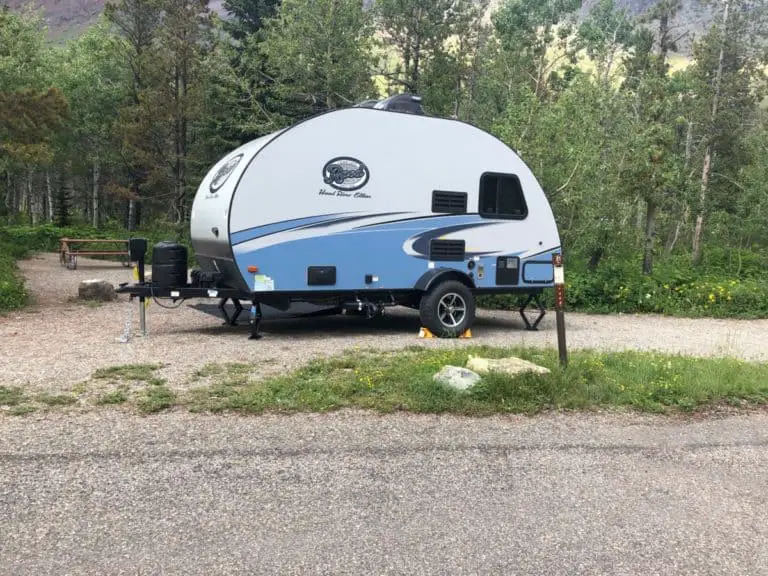
How to Winterize a Travel Trailer: The Complete Guide
If you happen to be the proud owner of an RV, then you must know how important it is to prepare it for winter. Winter can be unforgiving on your RV, especially since they are too large to be stored indoors reasonably. Before you embark on winterizing your RV, your first order of business should…

Can My Dog Ride Safely in the Travel Trailer?
Owning a travel trailer means having the freedom to venture to many different places, and it makes it much easier to bring your pet along with you. The drives can be long and the car may get cramped, so you may consider putting your dog in the travel trailer as you are driving in order…

How much can an RV tow? With examples
Knowing your RV’s towing capacity is essential to getting the most out of your vehicle and your outdoor adventure. What and how you tow greatly depends on the type of RV that you own. How much can an RV tow? In general, a Class A RV can tow up to 15,000 pounds, a Class B…

How to Bleed Air From Your RV’s Water Lines
If you recently noticed sputtering noises, an intermittent splash of waters, or low water pressure when you attempted to take a shower or use your faucet in your recreational vehicle, you most likely have air trapped in your vehicle’s water lines. This air can appear in your recreational vehicle’s water lines for a variety of…

Are All Travel Trailers Self-Contained? What You Need to Know
When you think of a travel trailer, a particular image probably comes to mind-four walls, a roof, a floor, and something that can be towed. You may not know that there are quite a few different types of travel trailers based on the needs of families and even individuals-but are they all self-contained? Not all…
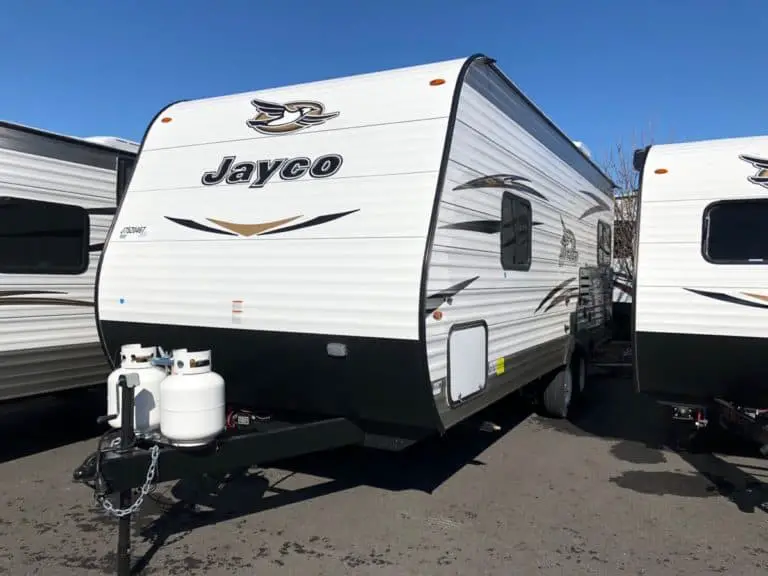
Can you put vinyl siding on a travel trailer?
No matter if you are buying a renovated older trailer that needs some extra help or you have an older trailer that you have had for years and needs some extra love, knowing what to put in place of your old siding is important. Many people look for different options to replace their siding based…
Join our Newsletter to stay up to date on the latest RV topics and receive our FREE RV Inspection Cheat Sheet Today. Use this tool to inspect new or used campers you are looking at purchasing.
No thanks, I’m not interested!
JavaScript seems to be disabled in your browser. For the best experience on our site, be sure to turn on Javascript in your browser.
- My Purchase Orders
- Compare Products

- Trailer Weights
Trailer Weights by Trailer Type
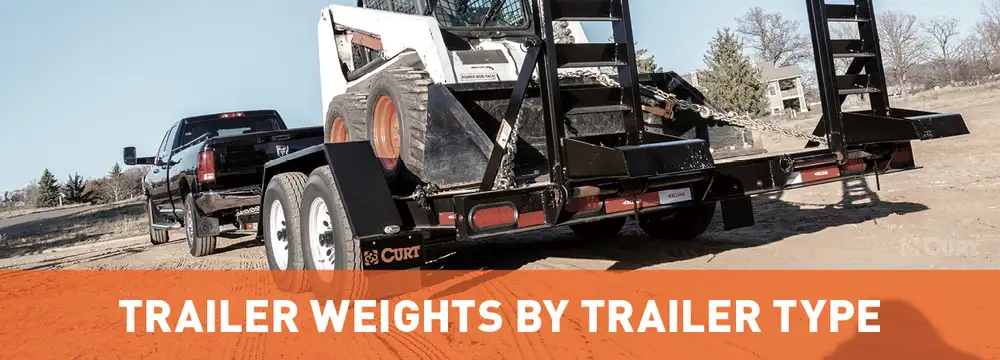
How Much Does a Trailer Weigh?
Each type of trailer has a specific purpose, and because of this, the weight of each trailer is different. Trailers also vary greatly in their capacities, lengths and construction.
This trailer weight chart and guide provides the average weight of each type of trailer, as well as the weight range, the gross vehicle weight rating (GVWR) and the average load capacity.
Warning! The trailer weights listed below are intended to be a general guideline only. The actual weight and ratings of your specific trailer will vary.
Trailer Weight Chart
Tap each trailer type to read more
Brief explanation of terms
- Empty Weight – The weight of the trailer without any cargo or fluids; also called Dry Weight or Unloaded Weight
- GVWR – The maximum weight a trailer is rated to weigh, including cargo, fluids, etc.
- Load Capacity – The total weight of the cargo a trailer is rated to carry
For further explanation of these terms, visit our Towing Capacity Guide .
Tow your trailer with the right hitch! Find a custom hitch made for your exact vehicle.

Camper Weight Chart
There are several different types of campers, from small teardrop trailers to deluxe 5th wheel RVs. This chart provides a focused look at average weights and capacities for most camper types.

Trailer Weights Explained
Canoe / Kayak Trailer Weight
Canoe and kayak trailers are small trailers used for hauling personal watercraft such as canoes, kayaks and even paddleboards.
They typically weigh between 100 and 400 pounds when unloaded. The average weight of a canoe or kayak trailer is 200 pounds.
Depending on the number of watercraft the trailer is designed to carry -- one, two, four or more – the maximum trailer weight can be anywhere from 200 to 800 pounds.
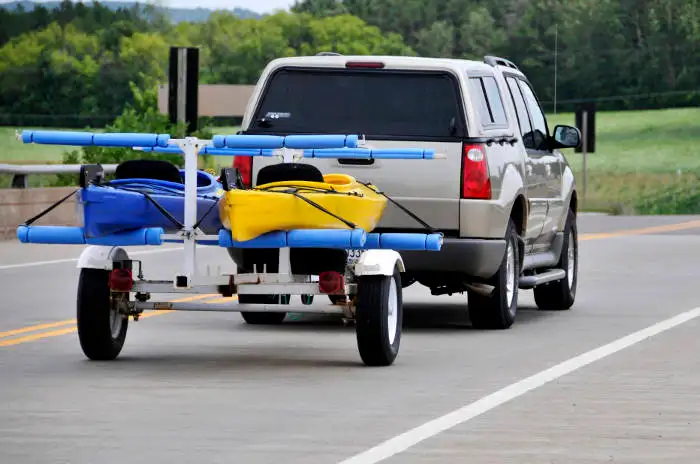
Jet Ski Trailer Weight
Similar to a small boat trailer, jet ski trailers have an average empty weight of 300 pounds. Smaller jet ski trailers weigh as little as 100 pounds and larger ones are closer to 500 pounds.
When loaded, the weight of a jet ski trailer can fluctuate from 800 to 3,000 pounds with an average load capacity of 1,500 pounds.
Weight ratings will differ based on the number of jet skis the trailer is configured to haul.
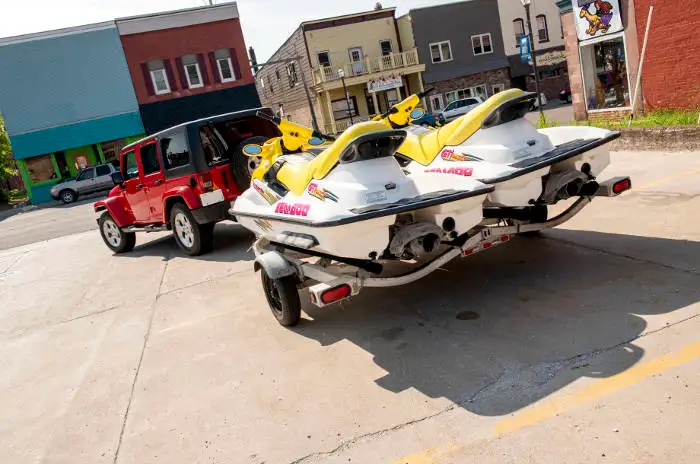
Motorcycle Trailer Weight
A motorcycle trailer is designed for transporting a motorcycle, allowing it to be towed by another vehicle. This is different from a trailer towed by a motorcycle, also known as a motorcycle trailer.
Unloaded, a motorcycle trailer may weigh 300 to 800 pounds with an average weight of 500 pounds. They are commonly rated for a maximum trailer weight of 1,300 to 3,500 pounds, making their average load capacity just under 2,000 pounds.
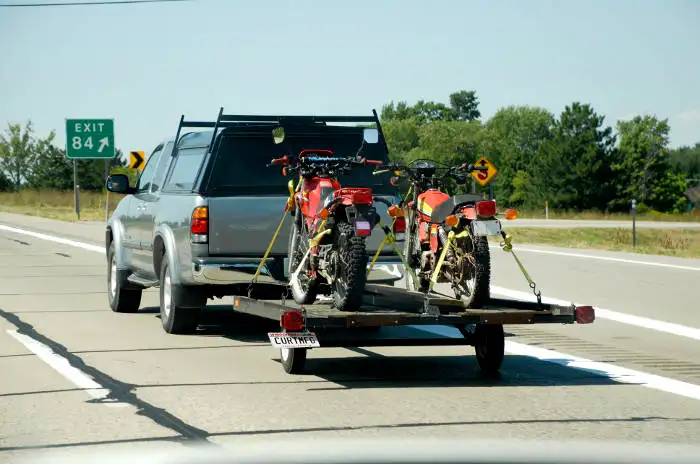
Fishing Boat Trailer Weight
A fishing boat trailer usually weighs 200 to 1,100 pounds on its own, without a boat loaded. The average for a boat trailer is about 600 pounds.
Combined boat and trailer weight ratings ranges from 900 to 6,000 pounds, depending on the length of the trailer and the boat itself.
The average weight capacity for a fishing boat trailer is about 2,700 pounds.
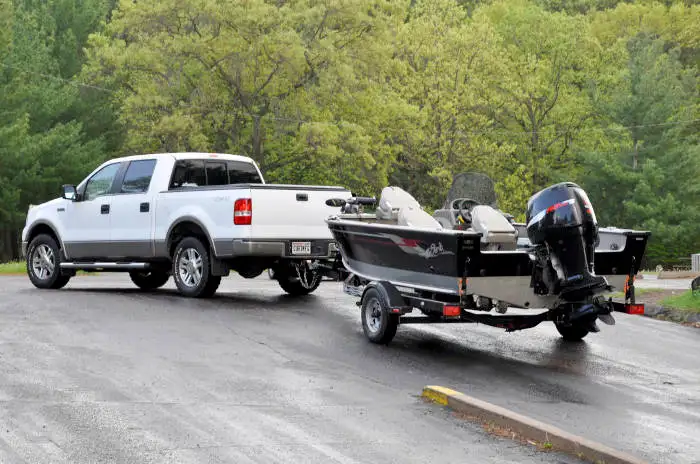
Tow Dolly Weight
A tow dolly for dinghy towing a vehicle usually weighs about 600 pounds without a vehicle hooked up. Some tow dollies weigh as a little as 400 pounds and others as much as 800 pounds, depending on the style and construction.
Tow dolly weight capacity ranges from 3,000 to 5,000 pounds. The capacity refers specifically to the total weight of the dinghy vehicle. However, the average capacity for most tow dollies is closer to 3,400 pounds.

Small Open Utility Trailer Weight
Utility trailers typically weigh about 700 pounds unloaded, but they can vary greatly – from 300 to 1,100 pounds – depending on the construction, width, features, number of axles and more. The type of trailer referred to here is an open utility trailer less than 10 feet long.
The weight capacity of a small utility trailer can also range significantly. A short, aluminum utility trailer may only have a GVWR of 1,000 pounds, while a wide, double-axle, steel utility trailer may be rated for 3,000 pounds.
The average cargo load for small utility trailers is 1,800 pounds.
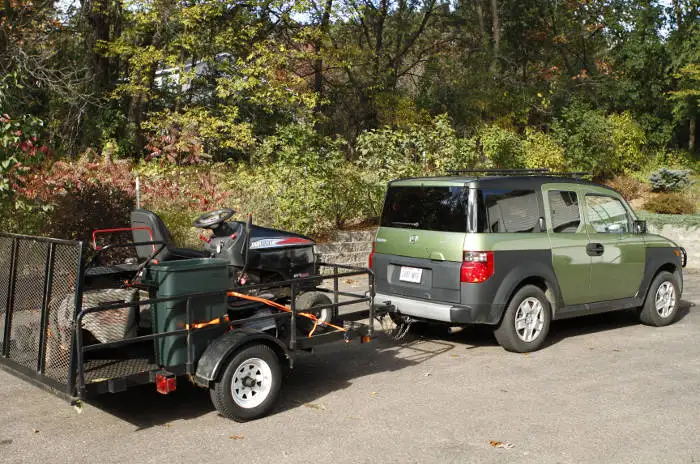
Small Enclosed Trailer Weight
Empty weight for small enclosed trailers spans from 400 to 1,800 pounds. The average for this type of trailer is 1,000 pounds, but this is determined largely by the materials used to construct the trailer and the number of axles.
When fully loaded, a small enclosed utility trailer can be rated for a maximum of up to 7,000 pounds (GVWR). However, for trailers 12 feet long or less, the average cargo load capacity is typically around 2,200 pounds.
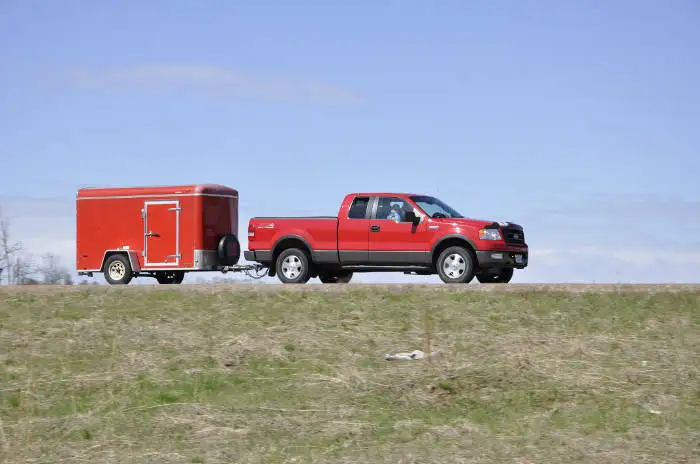
Teardrop Trailer Weight
Teardrop camper trailers weigh between 500 and 3,200 pounds, but the average is about 1,700 pounds. It all depends on the features included. Some teardrop trailers have a fully integrated kitchen and awning system. Others are more basic.
Maximum teardrop camper weight can be as much as 4,000 pounds (GVWR). Some are only rated for 2,000 pounds.
Most teardrop campers aren’t designed to tow a lot of weight, and the average cargo capacity is only about 700 pounds.
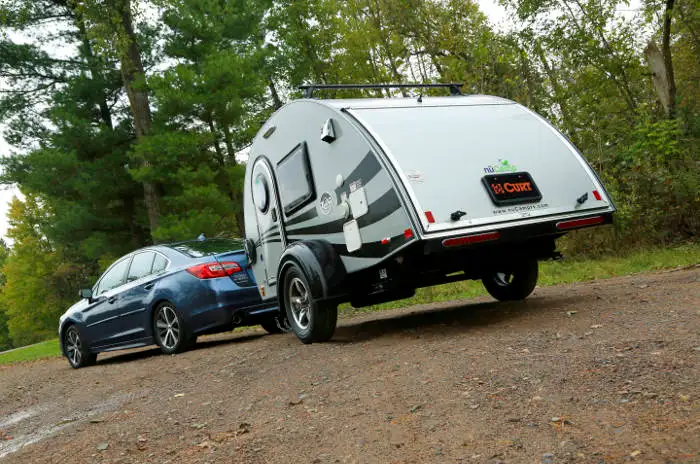
A-Frame Camper Weight
An A-frame camper is a specific type of pop up camper trailer. This type of camper usually weighs between 1,200 and 2,300 pounds unloaded. The average weight is 1,700 pounds.
A-frame campers provide a substantial amount of cargo capacity with an overall average of 1,200 pounds. Gross vehicle weight ratings for this type of trailer range from 2,500 up to 3,600 pounds.
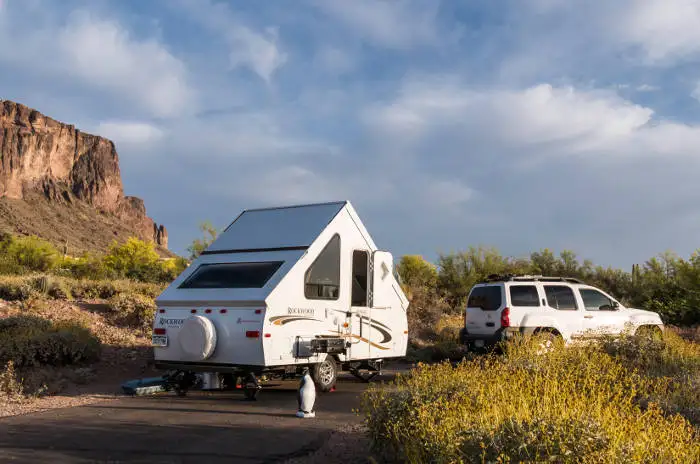
Car Trailer Weight
A car trailer can weigh anywhere from 1,500 to 2,800 pounds by itself. The average is 1,900 pounds. With one or more cars loaded, that weight increases to as much as 15,000 pounds.
The weight of a car trailer largely depends on its construction, length and style. A bumper pull car hauler with length enough for one car may have a GVWR of 6,000 pounds, while a double-car gooseneck trailer could max out at 15,000 pounds. Additionally, aluminum car trailer weight and capacity will vary greatly from steel.
On average, the load capacity for car trailers is 7,100 pounds.

Large Boat Trailer Weight
Larger boat trailers are used for hauling yachts, pontoon boats and other heavy watercraft. For this type of trailer, the empty weight ranges from 1,100 to 4,400 pounds, and the average is about 2,200 pounds.
When loaded with a large boat, the trailer weight increases greatly. The capacity depends on the build of the trailer and its configuration. GVWR can be as low as 5,400 pounds or as high as 34,400 pounds.
Average load capacity for large boat trailers is around 11,400 pounds.
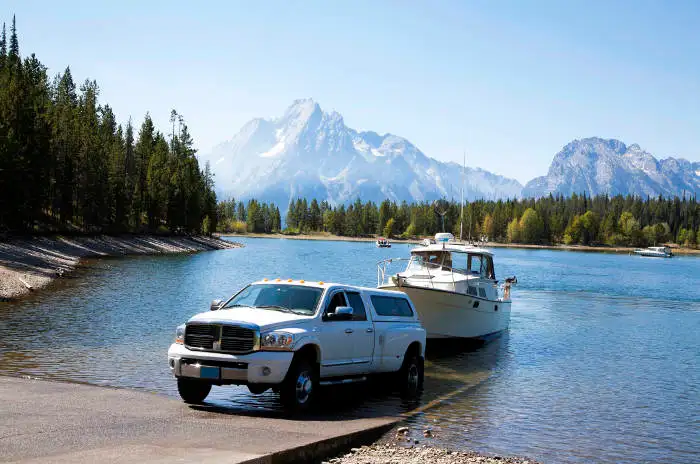
Pop Up Camper Weight
The average weight of a pop up camper is about 2,300 pounds unloaded. Some are as little as 1,400, and others weigh as much as 3,000 pounds if they are equipped with certain features.
When fully loaded (GVWR), pop up trailer weight can range from 2,700 up to 4,000 pounds, giving this type of camper an average load capacity of 1,100 pounds. This provides plenty of room for a propane tank, water tank, grille, bedding, luggage and other necessary cargo for a successful campout.
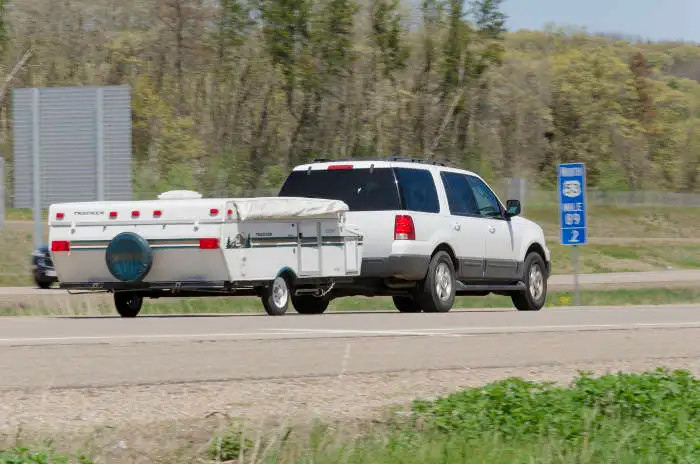
Large Enclosed Trailer Weight
Large enclosed trailers, namely those 12 feet or longer with a bumper pull coupler, typically weigh about 2,700 pounds when empty. Some are little as 900 pounds. Heavy-duty models weigh up to 5,200 pounds.
The capacity of a large enclosed utility trailer can vary based on how many axles it has, the construction of the frame and other factors.
In general, the average cargo capacity is 4,400 pounds. However, some 12-foot enclosed trailers only have a gross vehicle weight rating of 3,000 pounds. Longer units are rated as high as 10,000 pounds.
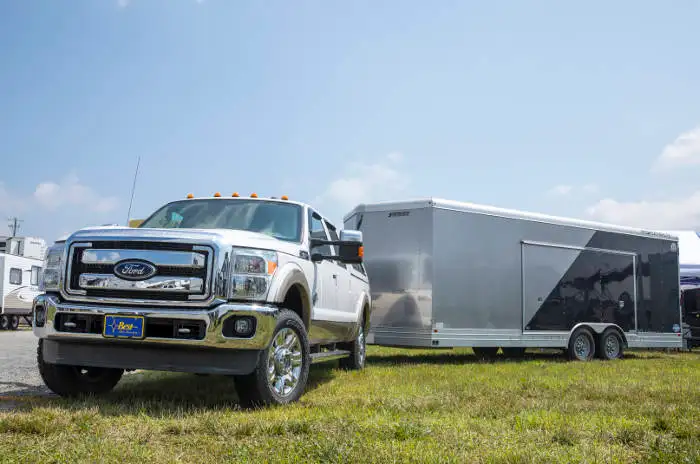
Small Travel Trailer Weight
A smaller travel trailer – about 22 feet long or less – has an average weight of about 2,800 pounds. The unloaded weight range is typically between 1,200 and 3,900 pounds.
The gross vehicle weight rating of small travel trailers varies from 1,900 pounds up to 4,500 pounds.
Generally, small travel trailers don’t have a lot of extra cargo capacity. The average is only about 800 pounds. However, some are rated to carry as much as 1,400 pounds. The cargo capacity may increase with certain design features and additional axles.
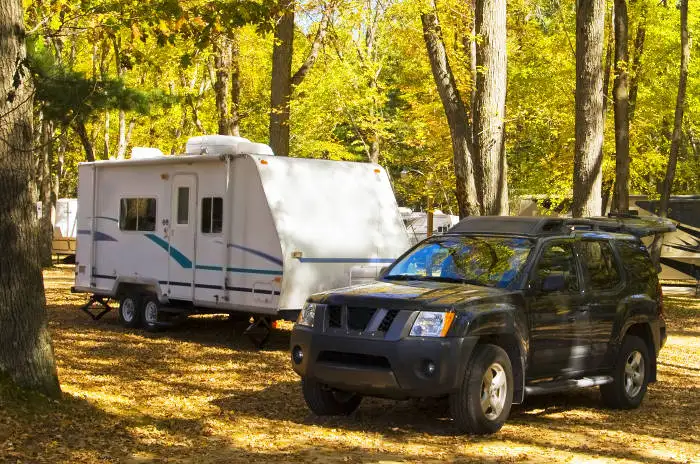
Small Horse Trailer Weight
A horse trailer designed to transport one or two horses typically weighs between 2,300 and 3,900 pounds. With horses and cargo loaded, this number increases. The average empty weight of a horse trailer is about 2,900 pounds.
When loaded up, small horse trailers max out at 7,000 or 8,000 pounds (GVWR). This allows for a cargo capacity of about 4,300 pounds.
Load capacities vary by trailer style and construction. A simple, one-horse trailer made from aluminum will weigh far less than a deluxe, two-horse trailer with a steel frame.
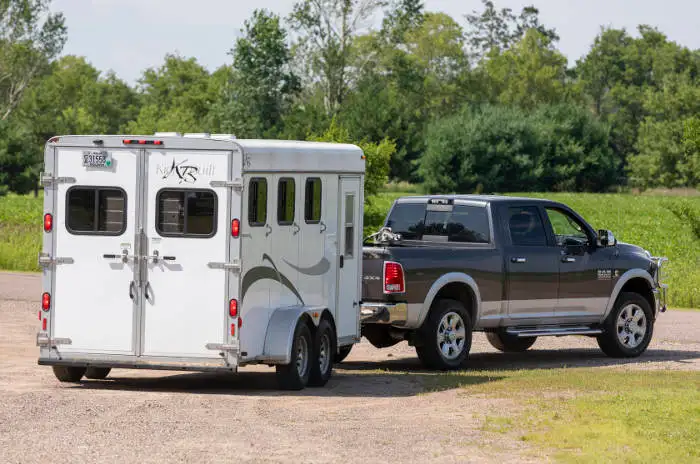
Large Flatbed Trailer Weight
Large flatbed trailers, such as car haulers, equipment trailers and utility flatbeds, can weigh anywhere from 500 to 7,700 pounds, even when empty.
However, because they are designed for transporting large amounts of cargo, most large flatbed trailers – that is, bumper pull flatbed trailers – have a higher cargo capacity. The average is about 7,400 pounds.
For gross trailer weight ratings on flatbed trailers, the low end is around 2,900, but some are rated as high as 26,000 pounds, even with a bumper pull configuration. Gooseneck models are rated even higher.
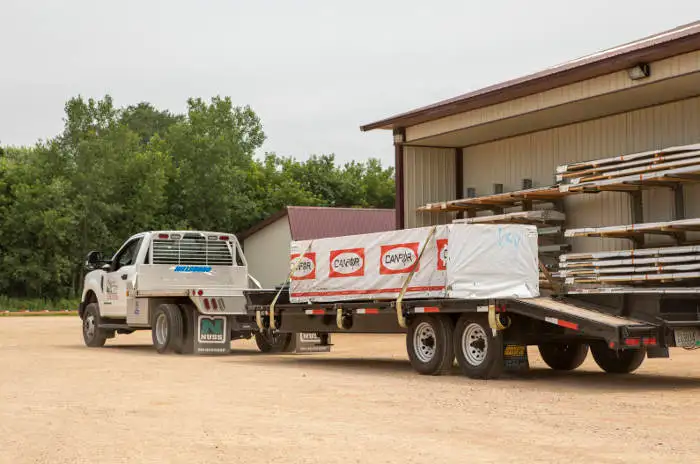
Dump Trailer Weight
When empty, a dump trailer can weigh anywhere from 1,100 to just over 10,000 pounds. The average weight for dump trailers is 4,500 pounds unloaded.
This type of trailer is extremely useful for transporting large amounts of fine or loose materials – everything from gravel to demolition waste. The hydraulic or powered dump receptacle makes unloading fast and easy.
The smallest dump trailers have a gross vehicle weight rating of 3,000 pounds. The largest models can weigh as much as 30,000 pounds. The average GVWR for dump trailers is around 12,400 pounds.

Large Travel Trailer Weight
A large travel trailer – anything around 20 feet or longer – has an average weight of about 6,700 pounds. Specifically, this refers to the travel trailer dry weight. This weight is largely dependent on the types of features and how many axles the trailer has.
Some larger travel trailers only weigh about 4,500 pounds, but the largest are around 9,000 pounds. 5th wheel camper trailers weigh even more.
When fully loaded with cargo, supplies and fluids, the gross vehicle weight rating of a travel trailer can vary from 6,300 to 10,500 pounds. The average cargo capacity of a bumper pull travel trailer is 1,600 pounds.
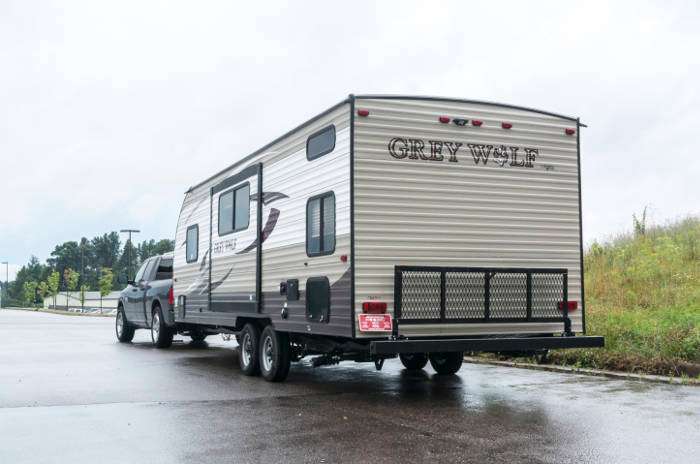
Gooseneck Flatbed Trailer Weight
Gooseneck flatbed trailers and utility trailers generally have higher weight ratings than their bumper pull cousins. A typical gooseneck flatbed trailer weighs about 7,000 pounds without cargo.
Smaller gooseneck flatbeds can weigh as little as 4,700 pounds, but the largest are upwards of 10,000 pounds.
For gross vehicle weight ratings, gooseneck flatbed trailers are built for heavy-duty hauling, whether it’s construction materials, farm equipment or automotive toys. Some are only rated for a maximum weight just under 16,000 pounds. Heavier-duty options are rated up to 36,000 pounds.
The average load capacity for gooseneck flatbed trailers is 16,000 pounds.
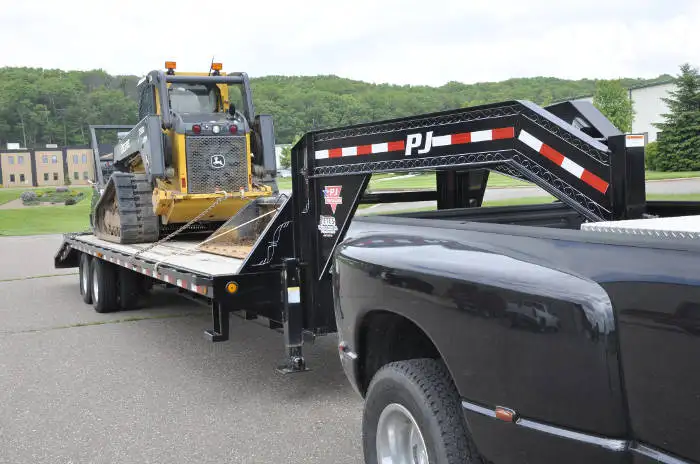
Large Livestock Trailer Weight
Larger livestock trailers range in weight from 4,200 to nearly 11,000 pounds when unloaded. With animals and cargo on board, that range increases up to 24,000 pounds (GVWR).
Livestock trailers are fairly diverse in their design and size. For example, a 20-foot aluminum bumper pull livestock trailer will be much lighter than a 40-foot steel gooseneck horse trailer. Some livestock trailers are also equipped with wash stalls, a living space and other features, adding to the overall weight.
The average empty weight for large livestock trailers is about 7,300 pounds. For load capacity, the average is around 11,400 pounds.
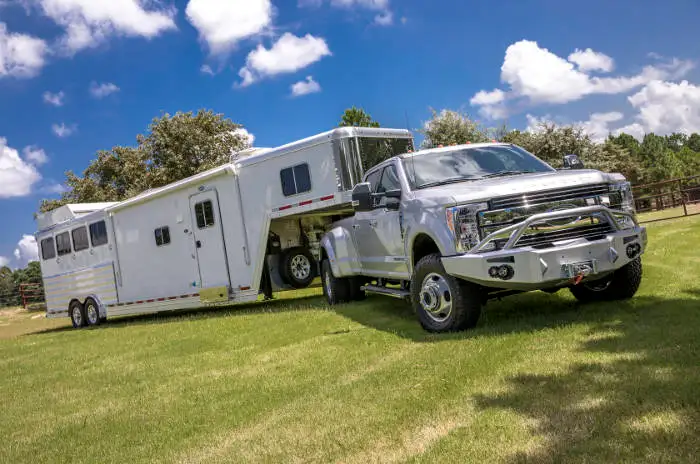
Toy Hauler Weight
A toy hauler is a bumper pull, 5th wheel or gooseneck trailer with a living space and a large compartment for transporting ATVs, UTVs, dirt bikes and other recreational motorsport vehicles.
Toy haulers, when unloaded, range in weight from 3,600 to 11,400 pounds, with an average of about 7,600 pounds.
Because they’re built for transporting smaller vehicles, toy haulers generally have a higher cargo capacity. The average is about 10,000 pounds.
Gross vehicle weight ratings for toy hauler trailer can vary from just under 15,000 to over 22,000 pounds.
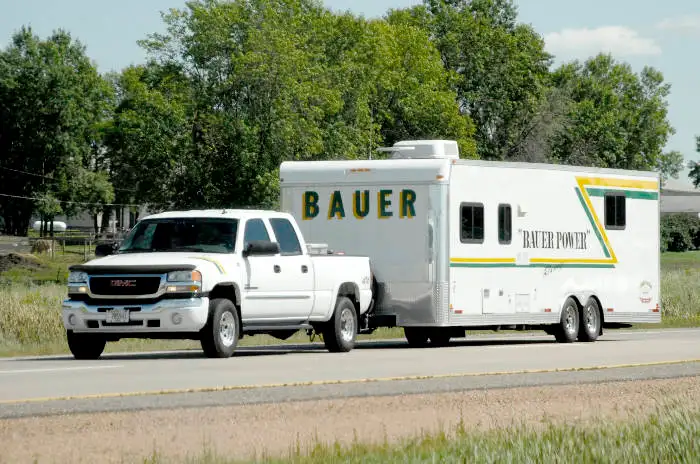
5th Wheel Camper Weight
5th wheel campers have an average weight of 12,700 pounds, empty and unloaded. Smaller models weigh as little as 5,000 pounds, while the largest 5th wheel camper trailers weigh up to 16,000 pounds.
To allow plenty of space for camping gear, equipment, cargo and fluids, the average load capacity is 6,000 pounds.
When fully loaded and ready for towing, most 5th wheel campers have a gross vehicle weight rating between 17,000 and 20,000 pounds.
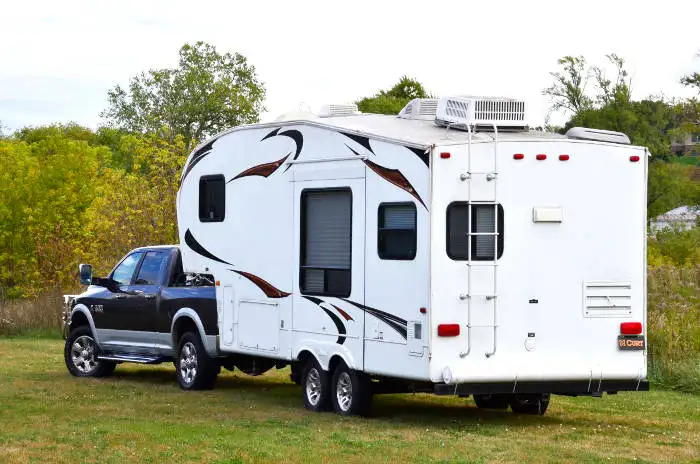
1. How much does a camper weigh?
A camper can weigh anywhere from 500 to 20,000 pounds. It all depends on the style of the camper. For example, a teardrop camper usually weighs about 1,500 pounds unloaded, while a 36-foot 5th wheel camper can weigh as much as 15,000 pounds, even when empty.
2. How much does a teardrop trailer weigh?
A teardrop trailer is one of the smallest camper types and one of the lightest. They typically weigh between 500 and 3,000 pounds, but the average is closer to 1,500. Some teardrop camper trailers have a gross vehicle weight rating as high as 4,000 pounds.
3. How much do pop up campers weigh?
Pop up campers weigh between 1,400 and 4,000 pounds. When empty and unloaded the average weight for pop up campers is about 2,300 pounds. However, they can also carry an average cargo load of 1,100 pounds. For maximum vehicle weight, a pop up camper can range from 2,700 to 4,000 pounds (GVWR).
4. How much does a small camper weigh?
A small camper can weigh anywhere from 500 pounds to 4,500 pounds, depending on the style. Teardrop campers, pop up campers and shorter travel trailers can all be classified as small campers. The average weight of a teardrop camper is about 2,000 pounds with cargo, and the average for small travel trailers is about 3,000 pounds.
5. How much does a travel trailer weigh?
Travel trailers vary in weight from 1,200 to almost 9,000 pounds. They come in various lengths, styles and builds, allowing for a diverse weight range. Smaller travel trailers have an average maximum weight of about 3,500 pounds (GVWR). Some larger travel trailers can max out at over 10,000 pounds when fully loaded up.
6. How much does a 5th wheel weigh?
5th wheel trailers are one of the heaviest types of trailer, with an average empty weight of about 13,000 pounds. The average gross vehicle weight rating for 5th wheel trailers is around 18,000 pounds, but some are as much as 20,000. Additionally, gooseneck trailers with a 5th wheel conversion can be even heavier.
7. How much does a boat trailer weigh?
Boat trailers by themselves can weigh as little as 100 pounds or as much as 4,400 pounds. The weight is determined by the length of the trailer and the type of boat or boats it is designed to carry. For example, jet ski trailers are about 300 pounds on average. Standard fishing boat trailers usually don’t weigh more than 1,000 pounds. Large yacht trailers, even without a boat loaded on, can easily be over 4,000 pounds.
8. How much does a boat and trailer weigh?
A boat and trailer together can weigh anywhere between 900 and 35,000 pounds. For small fishing boats and jon boats, the total weight for the boat and trailer ranges from 900 to 6,000 pounds. On the other hand, a heavy-duty yacht trailer and its craft together can easily weigh beyond 30,000 pounds.
9. How much does a horse trailer weigh?
Horse trailers vary in length, construction and features. A basic, aluminum single-horse trailer usually weighs less than 3,000 pounds. On the other hand, 12-horse trailers or horse trailers with a living space, elaborate wash stalls and other equipment can weigh upwards of 20,000 pounds.
10. How much does a 2-horse trailer weigh?
2-horse trailers weigh between 2,000 and 8,000 pounds. Some are more simple and constructed from lightweight materials. Others are more elaborate and longer, even though the horse capacity remains at 2 maximum. The average load capacity for a 2-horse trailer is about 4,000 pounds.
11. How much does an enclosed trailer weigh?
The weight of an enclosed trailer can fluctuate from 400 pounds to more than 20,000 pounds, depending on the style of the trailer and whether it is loaded with cargo or not. For example, a small, basic, enclosed utility trailer, empty of all cargo, may only weigh 500 pounds. Conversely, a toy hauler loaded up with a few ATVs might weigh in at 22,000 pounds.
12. How much does a car trailer weigh?
An unloaded car trailer usually weighs between 1,500 and 3,000 pounds. Gooseneck-style car trailers can weigh over 10,000 pounds. The construction, length and number cars the trailer is built to transport can make a huge difference. When loaded, the weight of some car trailers can increase to as much as 36,000 pounds.
Warning! The trailer weights listed on this page are intended to be a general guideline only. The actual weight and ratings of your specific trailer will vary.

This post may contain affiliate links or mention our own products, please check out our disclosure policy .
How Much Do Travel Trailers Weigh? [20 Campers Compared]
Published on April 22nd, 2019 by Ray & Tammy Roman This post was updated on October 5th, 2023
Based on our sampling of 20 popular models we estimate the typical travel trailer weight to be 4,384 pounds dry weight and 6,109 pound GVWR (Gross Vehicle Weight Rating). Dry weight means how much the travel trailer weighs without cargo, and all tanks (water, propane, etc.) completely empty. GVWR is the weight you should not exceed once you fill your tanks and add anything else you want to transport inside your camper.
Below is our travel trailer weight comparison table showing 20 of the most popular campers.
Keep in mind that many factors will influence the weight specifications. The longer the camper the heavier it will be. The type of construction will have a significant effect on weight as well as the type of features and appliances inside. Whether or not you have slide outs will affect weight as well.
DON’T MISS OUT ON RV LIVING UPDATES
Sign up for the newsletter today.
Please enter a valid email address.
An error occurred. Please try again later.

Thank you for subscribing to the RV Living newsletter, keep your eye on your inbox for updates.
As stated by Jim over at Camper Report , you can expect on average a camper to weight 250 lbs per foot with tanks filled and your gear. The length does not include hitch length.
Match Your Vehicle Towing Capacity To Your RV Weight
To tow your camper you need to have a vehicle with the right towing capacity. For example, a Toyota Tacoma with a V6 engine and towing package can easily tow a maximum of 6,400 pounds, A Ford F150 can tow up to 8,000 pounds with a towing package.
Most large SUVs can also tow a small travel trailer. The Chevy Tahoe, Ford Expedition and Jeep Grand Cherokee are just three of the ones that can tow a camper pretty well.
In some instances, even a car can tow a travel trailer. However, the travel trailer has to be pretty light. The Happier Campe r is one such camper that can be towed by a car.
Travel Trailer Weight Definitions
When comparing travel trailer weigh you are going to come across several terms that I have defined below.
Dry Weight aka UVW (Unloaded Vehicle Weight) – This weight refers to the weight of the camper as it is shipped from the factory. The UVW does not include any dealer-installed options, cargo, fresh water or LP gas.
Cargo Carrying Capacity aka CCC – To arrive at the Cargo Carrying Capacity you need to subtract UVW, the weight of potable water, including any in the hot water heater, full LP tank weight, and sleep capacity weight rating (154 lbs x number of sleeping positions) from the GVWR. Don’t forget to also subtract any dealer-added options.
Gross Vehicle Weight Rating (GVWR) – This is the maximum weight you should not exceed with cargo, full tanks, UVW, and sleeping capacity weight rating combined. Exceeding this weight limit can potentially void your warranty.
Tongue Weight aka Vertical Load Rating – This is the maximum vertical load that your hitch can carry. Before you start to tow make sure you measure your tongue weight. If it exceeds the weight limit consider moving content toward the rear of the trailer. The opposite is also true. If the tongue load is less than the limit move content forward.
Sleeping Capacity Weight Rating (SCWR ) – This one is new to me as I have never seen it before. To calculate SCWR multiply the number of manufacturers designated sleep positions times 143 pounds.
How Much Do Travel Trailers Weigh? – Related Questions
How much does a pop up camper weigh?
Pop up campers can vary significantly in weight depending on features. For example, a pop-up camper with a kitchen and fridge can weigh as much as 2,000 pounds, whereas a pop up with minimal features can weight around 500-600 pounds empty. Overall you can expect anywhere from 700 pounds to 3,800 pounds depending on box length and features.
How much does a Jayco Pop up camper weigh?
Jayco has one model of pop up campers called the Jay Sport. It weighs from 1,570 pounds dry to 1,895 pounds dry depending on the floor plan. The GVWR for the Jay Sport ranges from 2,250 pounds to 2,750 pounds.
How much do vintage travel trailers weigh?
An example of a vintage travel trailer weight is the 19645 Safeway. IT weights partially loaded 2,320 pounds. This is a 13-foot cabin travel trailer. You can expect a range of 150-200 pounds per foot length of the cabin only.
How much does a 16 foot travel trailer weight?
On average a 16-foot camper may weight 2,000 to 3,500 pounds. Why such a huge range? The weight of the camper is going to vary widely by brand, floor plan, type of construction, slide outs, interior appliances, and construction and dealer-added options.
As you can see by the examples above the weight of a camper can vary significantly. There isn’t one answer that fits all. The same length travel trailer will have different weights depending on how each manufacturer constructs their unit. Materials used (aluminum, fiberglass) will have a huge impact on weight. Interior furniture, appliances, and interior layout will also affect weight.
The most accurate way to determine the Gross Vehicle Weight of your camper is to fill all tanks, add your gear and supplies and take it to a truck scale. There you will quickly learn how much your travel trailer weighs.
Here is a list of 10 campers that we consider some of the best travel trailers that weigh less than 4,000 pounds . If you’re looking for camper trailers under $10,000 check out the 13 Cheapest Camper Trailer .
If you enjoyed this post Please Share:
Related posts:.
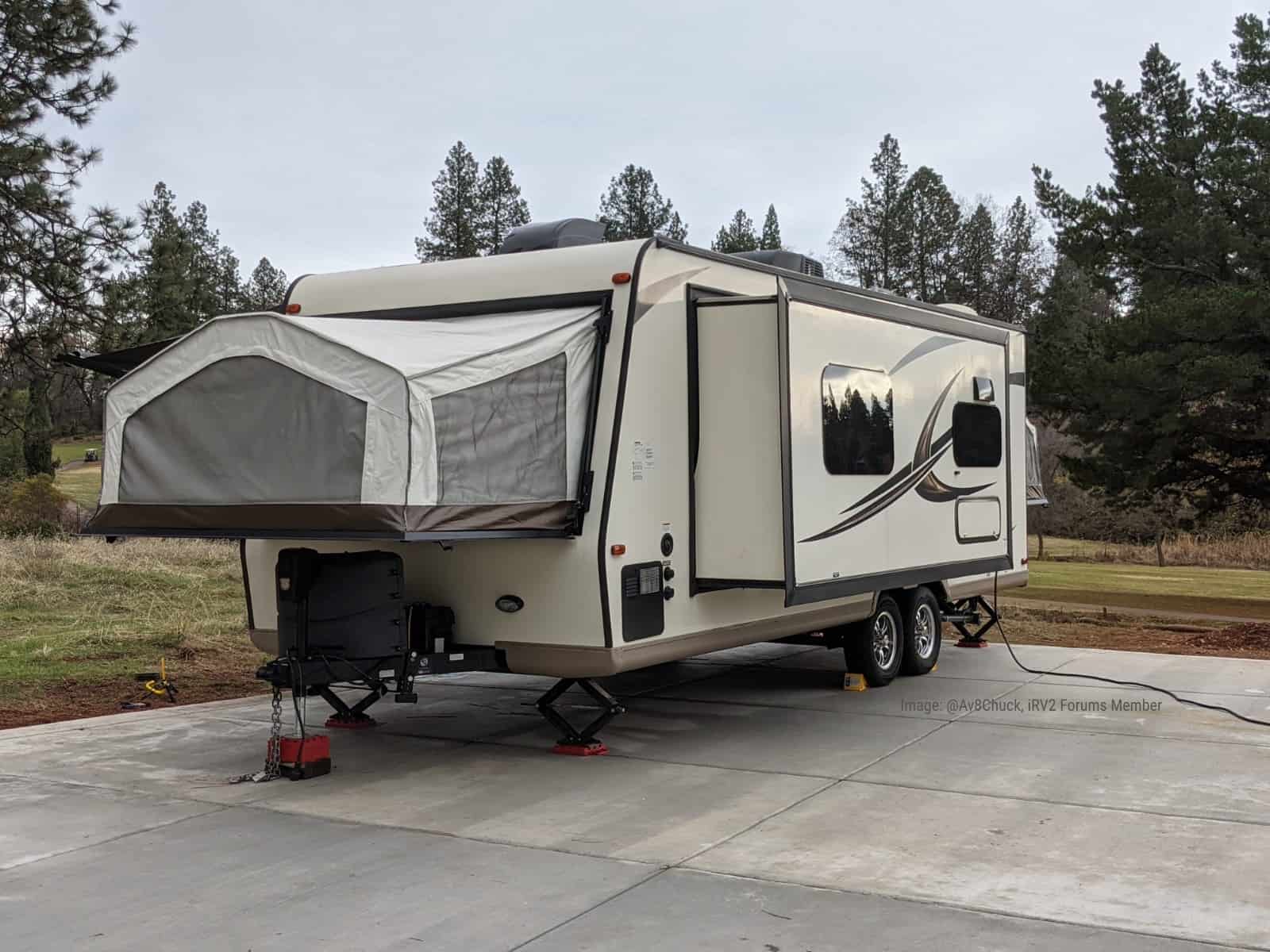
Expandable Travel Trailers: Why Hybrid Travel Trailers a Great Choice

The Basics of Camper Trailer Brake Controllers: Necessary for Safety and Fun

Travel Trailers with Two Doors Double Your Convenience
About the author:.

How much does a travel trailer weigh?
Table of Contents
When making the decision to purchase a travel trailer, one of the first and most complicated mysteries our readers must unravel is – how much does this trailer actually weigh?
The average travel trailer has a dry weight of around 5,200 lbs. These weights will vary greatly based on size of the trailer, ranging from 1,200 lbs (104 lbs per foot), up to around 9,000 lbs (230 lbs per foot) for larger trailers. Gear, tank levels and other equipment will add, on average, another 500-1000 lbs to the overall trailer weight.
Why does trailer weight matter?
A Trailers chassis (frame, springs, wheels, axles, tongue, and tires) are built to specific standards for the maximum weight load they can safely carry. The maximum amount of weight that a trailer can hold on its axle and tongue is called the Gross Vehicle Weight Rating, or GVWR. Exceeding your trailers GVWR with too much additional weight can create unsafe towing conditions, such as dangerous sway or difficulty braking.
Dry weight vs. Loaded weight
Your travel trailers dry weight is what it weighs when it contains no gear, and all tanks are empty. You will be able to find the dry weight listed in the owner’s manual, online product spec sheets, and typically on a sticker inside the main door.
You should, however, be cautious in using this weight as your “true” dry weight. Additions and upgrades like mattresses, TV’s, appliances, antennas, slide-out covers, etc. will change the dry weight significantly. For your best baseline dry weight, pull your empty trailer onto a truck scale or local scrap yard scale.
Loaded weight is the actual weight of your trailer after you have added all of your gear, food, equipment, and fresh water if you are boondocking (camping in a location without access to fresh water hookups or electricity). Your loaded weight should never exceed the GVWR for your travel trailer.
Key factors impacting travel trailer weight
The weight of your trailer is going to be impacted by several factors, but the most significant are – overall length, construction, slide-outs, tank capacities and levels, and gear weight.
Trailer length
Most travel trailer sizes are designated by length. The length of the trailer will play the biggest factor in your overall trailer weight, as the weight and overall mass of the trailer increases with every additional foot of length.
Travel trailers can vary dramatically in length, from 11’ Scamps and E-Pros, all the way up to the massive 41’ Jayco Eagle.
As you can see in the chart below – travel trailer weights start at about 104 lbs. per foot of length and increase by approximately 30-40 lbs per foot for every 10 feet of length added. This is because a larger trailer will often have more that comes with it – slides, air conditioners, larger tanks, more cabinets, etc. whereas in a smaller trailer there is still a minimum of empty floor space that must be maintained, so in terms of percentages they are not as loaded with fixtures.

Number of slide-outs
Slides are an amazing feature that add a ton of living space to your travel trailer. They also can add a ton (almost literally) of additional weight. In addition to the actual slide frame and finishes, you must also include the motors and additional weight of siding and insulation.
Typically, trailers that are less than 20 ft in length do not have slides. Trailers 20-30 feet typically have one slide, and trailers 30-40 feet will often have two or three (we’ve seen as many as 4!). This accounts for the average increase of about 40 lbs per foot of length for every 10 additional feet, as the average weight of a slide out is approximately 800 lbs.
Construction materials – Fiberglass v. Aluminum
The conventional wisdom says that fiberglass sided trailers (Fiberglass panels on hollow aluminum tube construction) are much lighter that the alternative corrugated aluminum panels over wood framing. While this is technically true, our research demonstrates that the difference is not as significant as you might think. Consider this comparison of two travel trailers manufactured by the same company.
The average weight difference between these two trailers is about 6 lbs. per foot, or 216 Lbs. So while yes, the construction does make a difference, it is not the only factor influencing the overall weight of your trailer.
What about Azdel panels?
Another factor to consider is the use of Azdel Composite Panels in the sidewall construction. Many of the top RV brands have begun using Azdel as a lighter and more moisture and rot resistant alternative to luan or plywood. Azdel is up to 50% lighter than wood, and therefore can make a big difference in the dry weight of your travel trailer.
Tank capacities
The amount of liquid, both fresh and sewage, that you travel with will have a significant impact on your overall weight. If you are camping in an area that you need to haul in and out your water and sewage, pay careful attention to the weight this adds to your trailer.
1 gallon of water weighs 8.2 lbs. Consider the Mallard M32 – one of the more popular brands of travel trailer sold in 2020 and has fairly standard-sized tanks.
Mallard M32 Tank Capacities:
If you were to fill your freshwater tank before your trip, you would need to factor in an additional 369 lbs. of water weight. However, at the end of your trip, it is possible that your freshwater tank is emptied, but you may have added up to an additional 656 lbs. of gray and black water. Consequently, you might be heavier on the way out than you were coming in.
To avoid having too much weight, it is best to dump your black and gray tanks before you leave the campground. For the freshwater tank, only fill it if you are going to need it (boondocking) as most campgrounds will have fresh water connections available.
Gear weight
Probably the most inexact area of weigh calculation is your “loaded” weight. Every camper is going to add additional weight to the travel trailer. This is reflected in the tools and supplies you need for camping and maintaining your trailer, clothes, bedding, sporting equipment, food and drink.
Gear weight can add up quickly. However for easy calculation, think about the most essential components and what they weigh. Here’s an example calculation:

Food, Water, and Clothing are consumables – you will need these for each day. Other consumables and personal care, Tools, and other miscellaneous items like books, toys, fishing poles, etc. only get counted once.

As you can see, there are a number of factors that influence how much your travel trailer actually weighs. The obvious reasons are length, number and weight of the slide outs, and overall construction. But as you have learned – there are variable factors like water and gear that can change your weight by hundreds of pounds. Pay close attention to these key weight factors in order to maximize your safety while traveling on your next camping trip.
Leave a Comment Cancel reply
Save my name, email, and website in this browser for the next time I comment.
- Skip to primary navigation
- Skip to main content
- Skip to primary sidebar
- Skip to footer
Journey With Confidence
10 Best Lightweight Travel Trailers Of 2022

- RV Trailers and Motorhomes
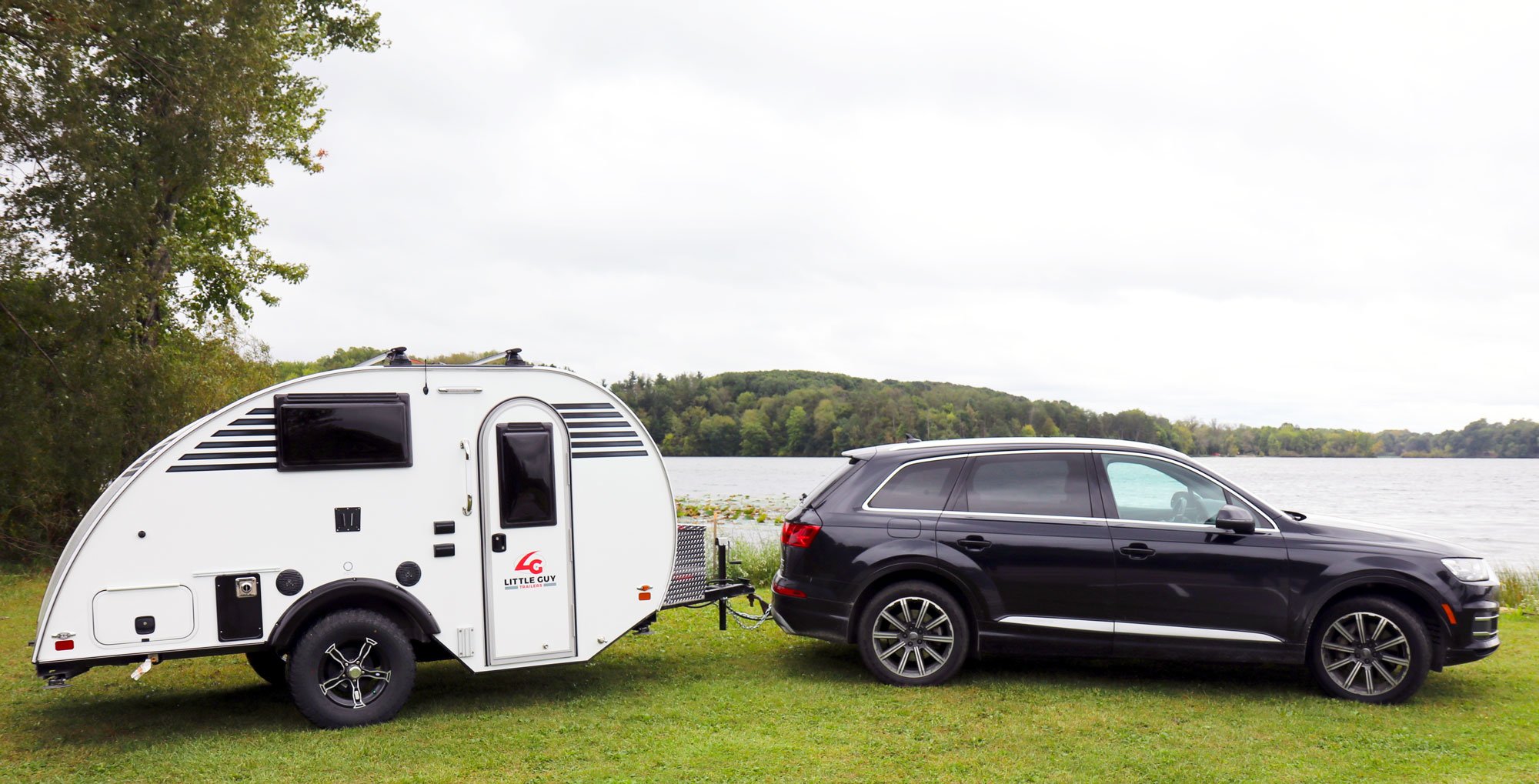
These lightweight travel trailers are lightweight and easy to tow. Photo courtesy of Little Guy.
Tread Lightly With These 10 Best Small Camper Trailers
The demand for small RVs is at an all-time high, and several RV manufacturers are responding to the demand for lightweight trailers that any car can pull. This list of the best lightweight travel trailers of 2022 spotlights the top-rated RVs for families, solo RVers, and adventure travelers.
- Each small RV trailer weighs less than 5,000 pounds.
- The ultralight trailers often cost less than a passenger car.
- Each trailer has one of the lightest gross vehicle weight ratings ( GVWR ) around. Just about any size truck or even some larger SUVs can pull them.
(If you’re looking for 2023 model-year lightweight travel trailers, check out our post 10 Best Lightweight Travel Trailers For 2023 .)
Top 10 Picks For Lightweight Travel Trailers (Under 5,000 Pounds GVWR)
Each small RV is listed in order by weight, from lightest to heaviest.
2022 nuCamp TAG XL: The Stargazer
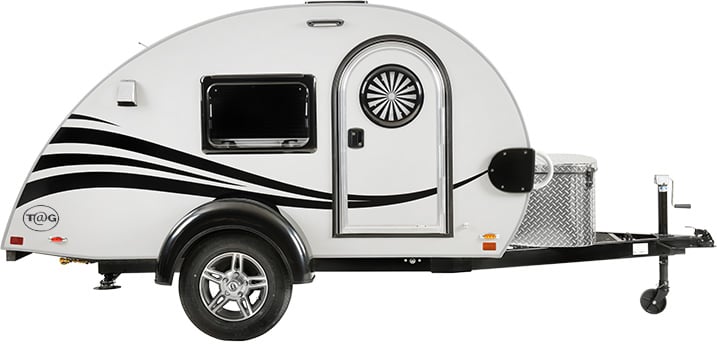
The TAG XL weighs less than 1,500 lbs – even with all of the bells and whistles.
At the top of our super light travel trailers list is the TAG. This small RV is lightweight and easy to tow. Built with custom Ohio-Amish cabinetry, under-bed storage, and an exterior shower, this teardrop trailer is the perfect way to bring some of the comforts of home when you hit the road.
Cook in nature while using the well-equipped rear galley. At night, you’ll climb into a warm and cozy interior. Watch the stars through a large stargazing window. There’s air conditioning, LED lighting, alloy wheels, electric brakes, and an optional solar roof package. No matter where you go, the TAG teardrop trailer is ready for adventure.
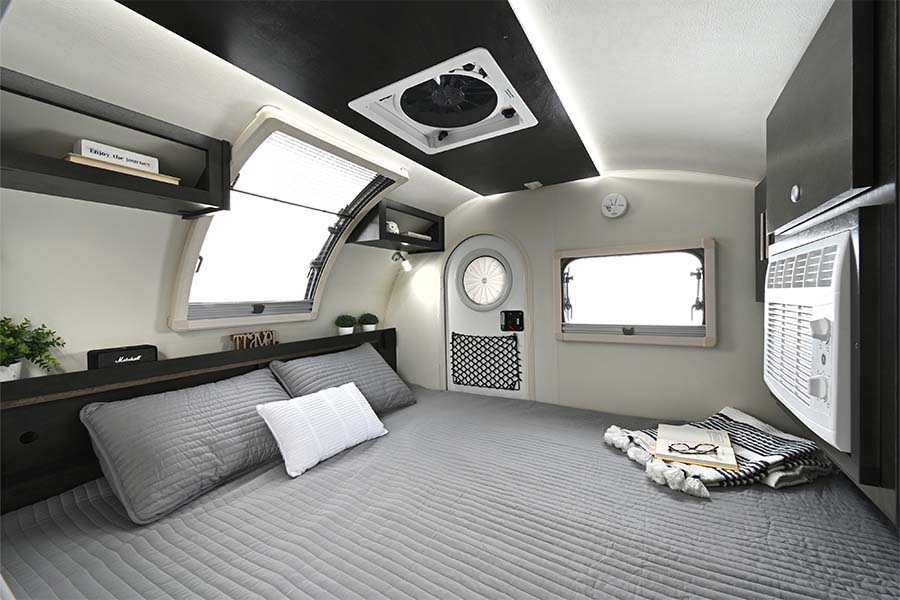
Climb into a warm, cozy interior – complete with a large window for stargazing.
- Hitch weight: 119 lbs.
- Gross vehicle weight rating: 2,200 lbs.
- Unloaded vehicle weight: 1,369 lbs.
- Exterior length: 13′ 7″
- Full exterior height: 6′ 3″
- Exterior width: 7′ 8″
- Interior height: 43″
- Freshwater capacity: 8 gallons
- Optional A/C and heater
- Base MSRP: $24,674
2022 TAXA TigerMoth Overland: The Ultimate Overlanding Vehicle
This rugged overland travel trailer is the ideal adventure home. The TigerMoth Overland Edition is a small RV with big features, including increased ground clearance thanks to the Timbren axle-less suspension with a 4″ lift.
You also get a number of premium accessories including a generous kitchen, roof cargo deck, and an optional tongue-mounted toolbox.
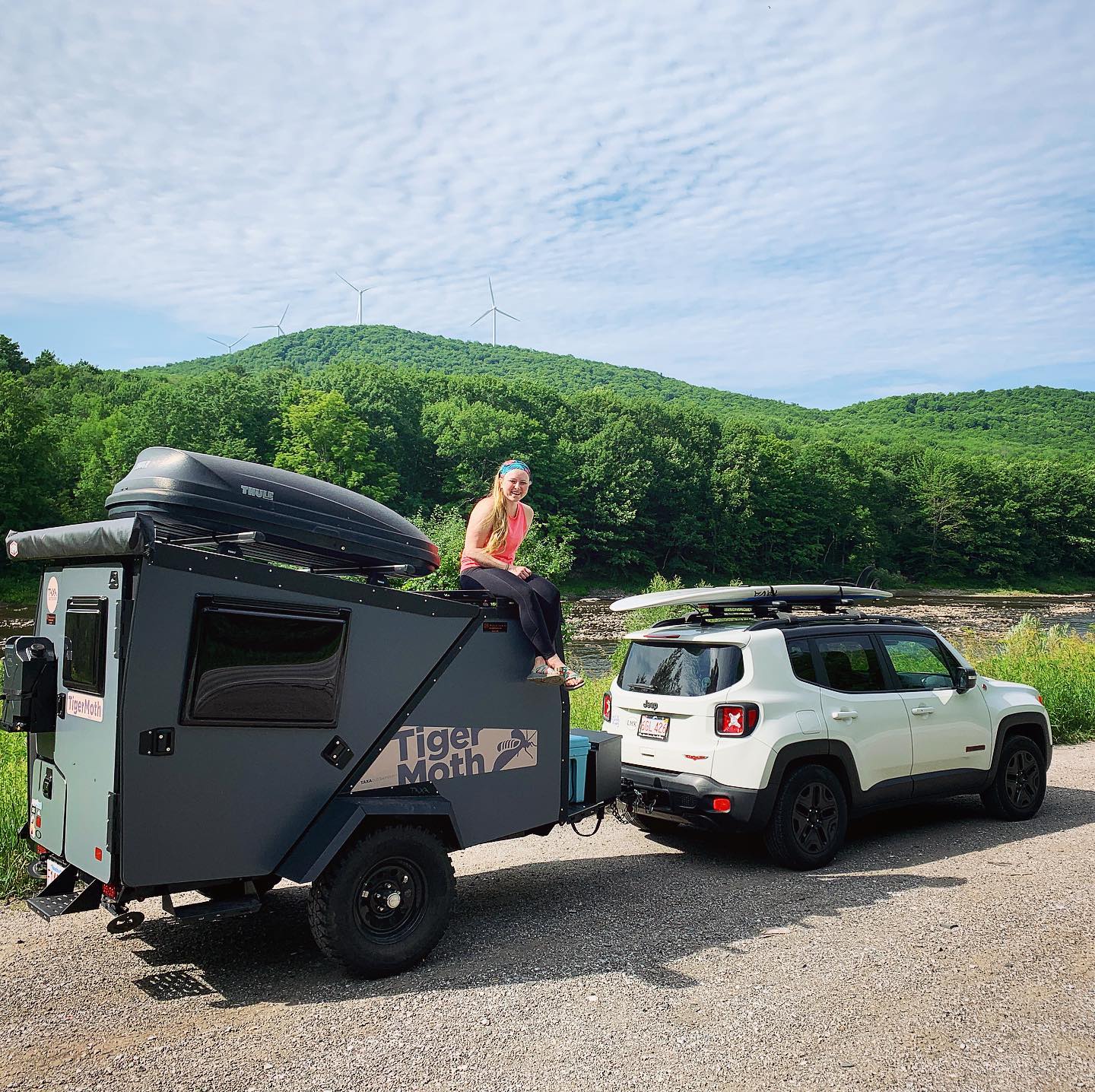
Enjoy 7+ off-grid days or longer
The TigerMoth can take you on a 7-day adventure or longer. The aerodynamic shape is fuel-efficient on the highway, and a generous interior space lets you do more with less. As a bonus, it’s also small enough to fit in a normal garage.
- Hitch weight: 195 lbs.
- Gross vehicle weight rating: 2,400 lbs.
- Unloaded vehicle weight: 1,458 lbs.
- Cargo capacity: 942 lbs.
- Exterior length: 12′ 0″
- Full exterior height: 7′
- Exterior width: 6′ 7″
- Freshwater capacity: 5 gallons
- 5 lbs propane tank & mount
- Pre-wired solar input
- Four acrylic, insulated windows with screens & shades
- 16″ alloy wheel with all-terrain tires
- Base MSRP: $29,350

Go off-grid in comfort.
2022 Travel Lite RV Rove Lite: Lightweight And Easy To Tow
Travel Lite’s new Rove Lite ultra-lightweight travel trailer is one of the most affordable travel trailers on the market (under $20K). It’s light enough to pull behind even the smallest of vehicles. You only need a towing capacity of 2,000 pounds.
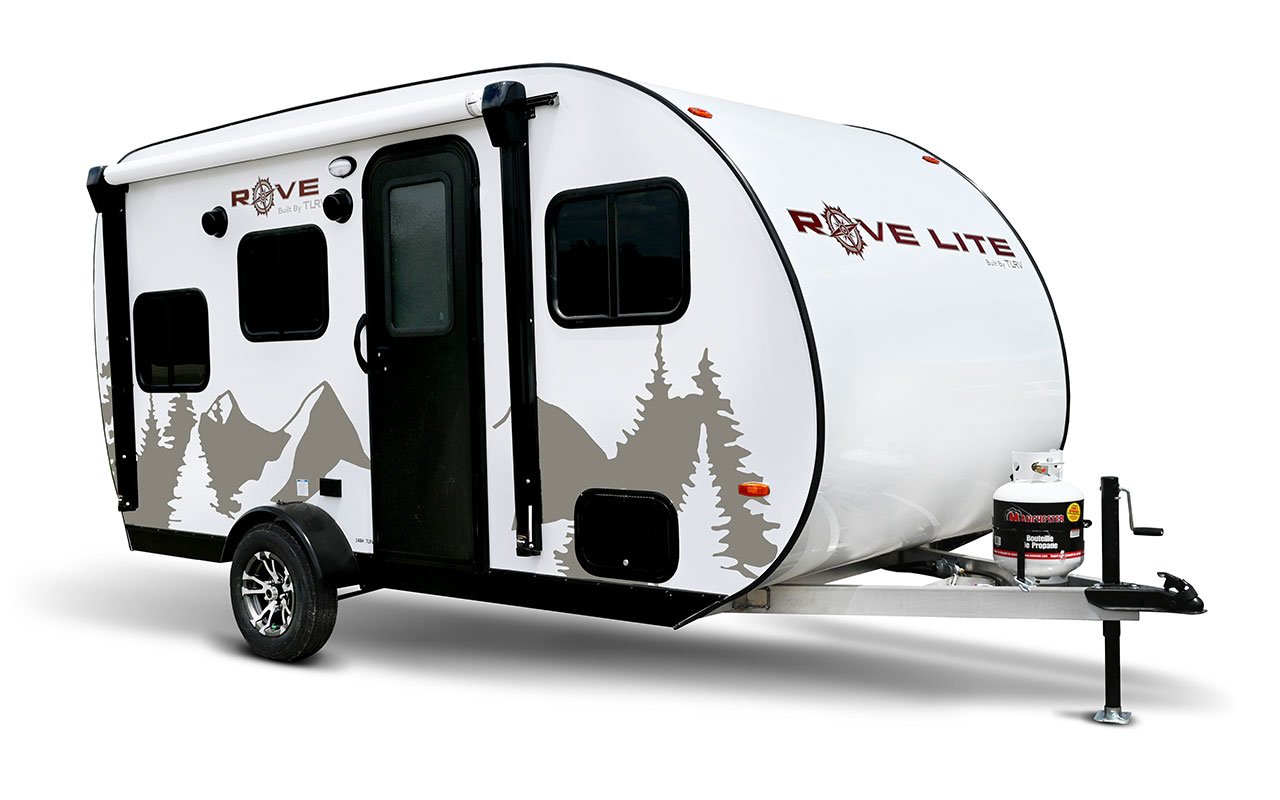
The new Rove Lite ultra-lightweight travel trailer is one of the most affordable RV trailers on the market. Photo courtesy of Travel Lite.
Enjoy the sleek Euro-style design made with state-of-the-art composite materials. There’s an aluminum chassis and a seamless poured-resin fiberglass roof. Interior features include a convertible bed and a bath with a shower. This small RV offers space-saving functionality at its best.
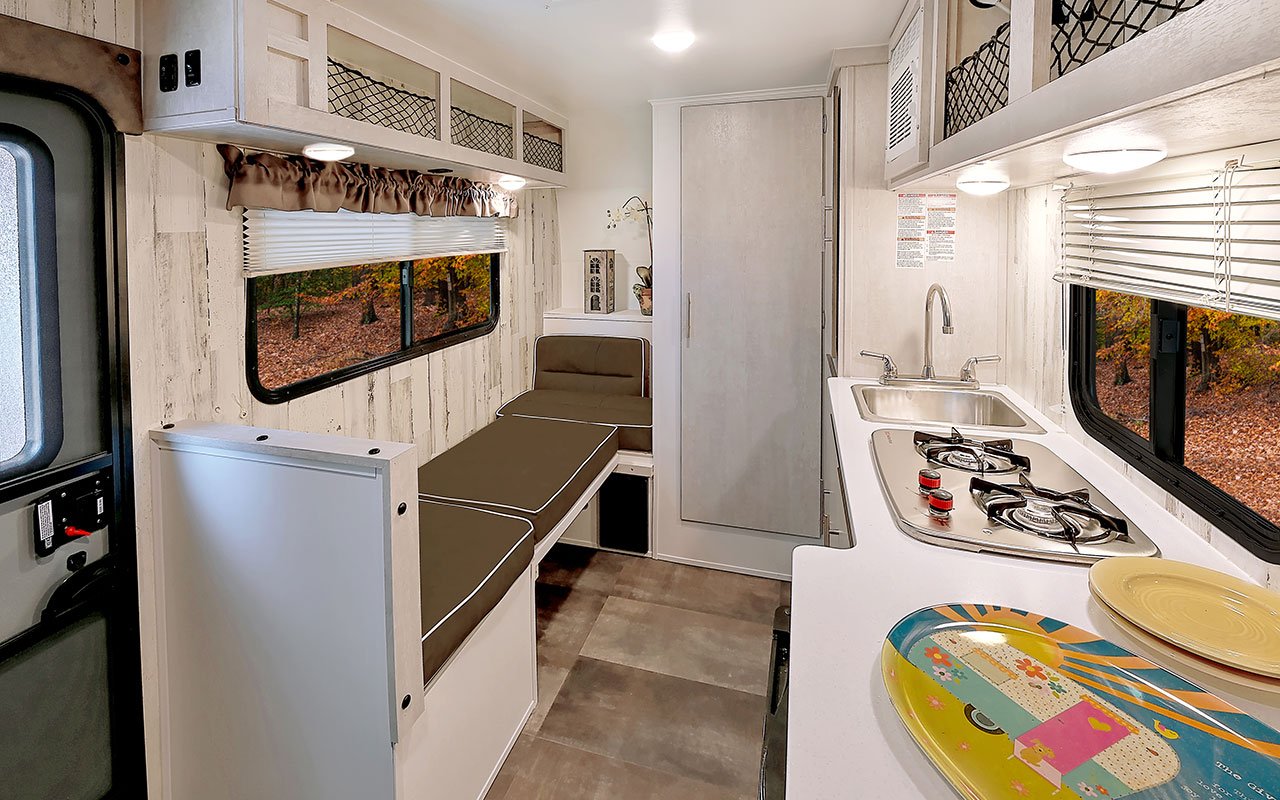
The 2022 Travel Lite RV Rove Lite ultra-lightweight travel trailer has a stylish and roomy interior. Photo courtesy of Travel Lite.
- Hitch weight: 160 lbs.
- Gross vehicle weight rating: 2,500 lbs.
- Unloaded vehicle weight: 1,707 lbs.
- Cargo capacity: 793 lbs.
- Exterior length: 15′ 4″
- Full exterior height: 8′ 1″
- Exterior width: 7′ 11″
- Freshwater capacity: 10 gallons
- Gray-water capacity: 30 gallons
- Black-water capacity: 5 gallons
- On-demand tankless water heater
- 20,000-BTU furnace
- Base MSRP: $19,424
Trillium Heritage Bunk 4500: New And Improved
Here’s a unique addition to our list of the best lightweight travel trailers of 2022: the ultralight, 15-foot, all fiberglass Trillium Heritage Bunk 4500 camper from L’air Camper Company in Ontario, Canada.
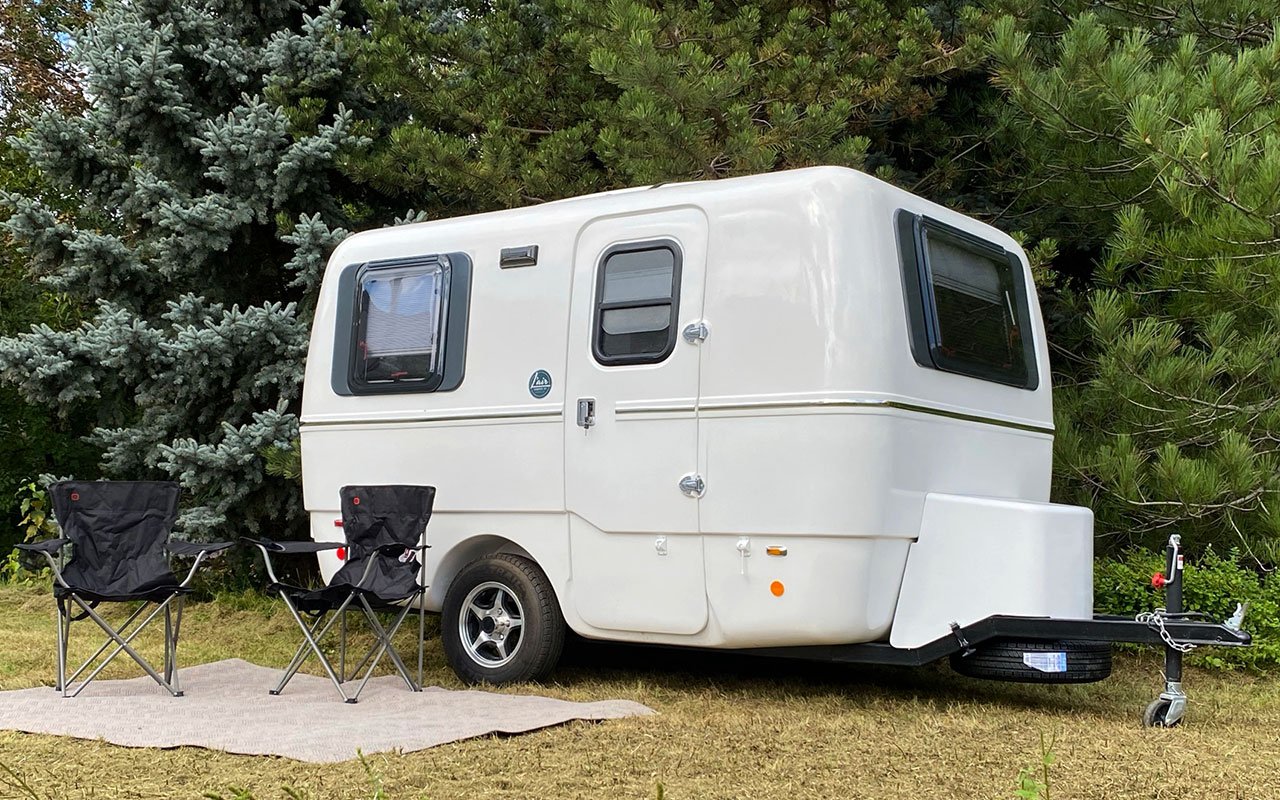
The L’air Trillium Heritage is an ultra-lightweight travel trailer that can be easily towed by many smaller SUVs and crossovers. Photo courtesy of L’air Camper Co.
This small RV received a complete facelift for 2022. It features dual-pane acrylic windows, a bigger solar panel, a 4.6-cubic-foot fridge with a freezer, and a galley makeover.
With a GVWR of just 2,700 pounds, the Trillium is an easy tow for many smaller SUVs and crossovers. Options abound for personalizing.
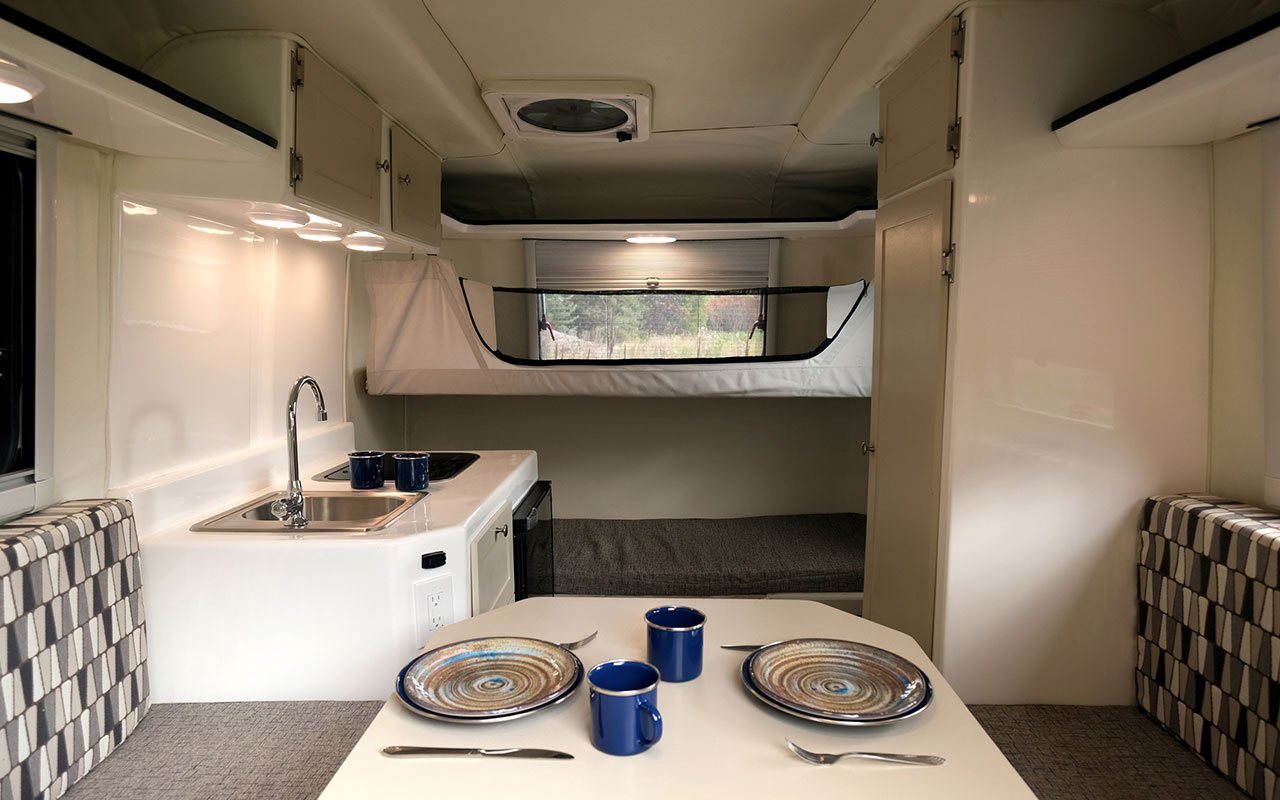
The living area of the Trillium Heritage has been updated with an all-new galley and 4.2-cubic-foot fridge. Photo courtesy of L’air Camper Co.
- Hitch weight: 180 lbs.
- Gross vehicle weight rating: 2,700 lbs.
- Unloaded vehicle weight: 1,650 lbs.
- Cargo capacity: 1,050 lbs.
- Exterior length: 15′ 2″
- Full exterior height: 6′ 2″
- Exterior width: 78″
- Freshwater capacity: 13 gallons
- Gray-water capacity: 5 gallons
- Single 130W solar panel with charge controller
- Base MSRP: $31,997
Venture Sonic Lite SL150VRB: Surprisingly Spacious
The Venture Sonic Lite SL150VRB has floorplans starting out at a fuel-saving 3,000 pounds! Both Sonic Lite and Sonic are engineered with a one-piece seamless fiberglass roof system. By arching the roof front to back, this system provides a more durable roof. When it rains, the water runs fore and aft.
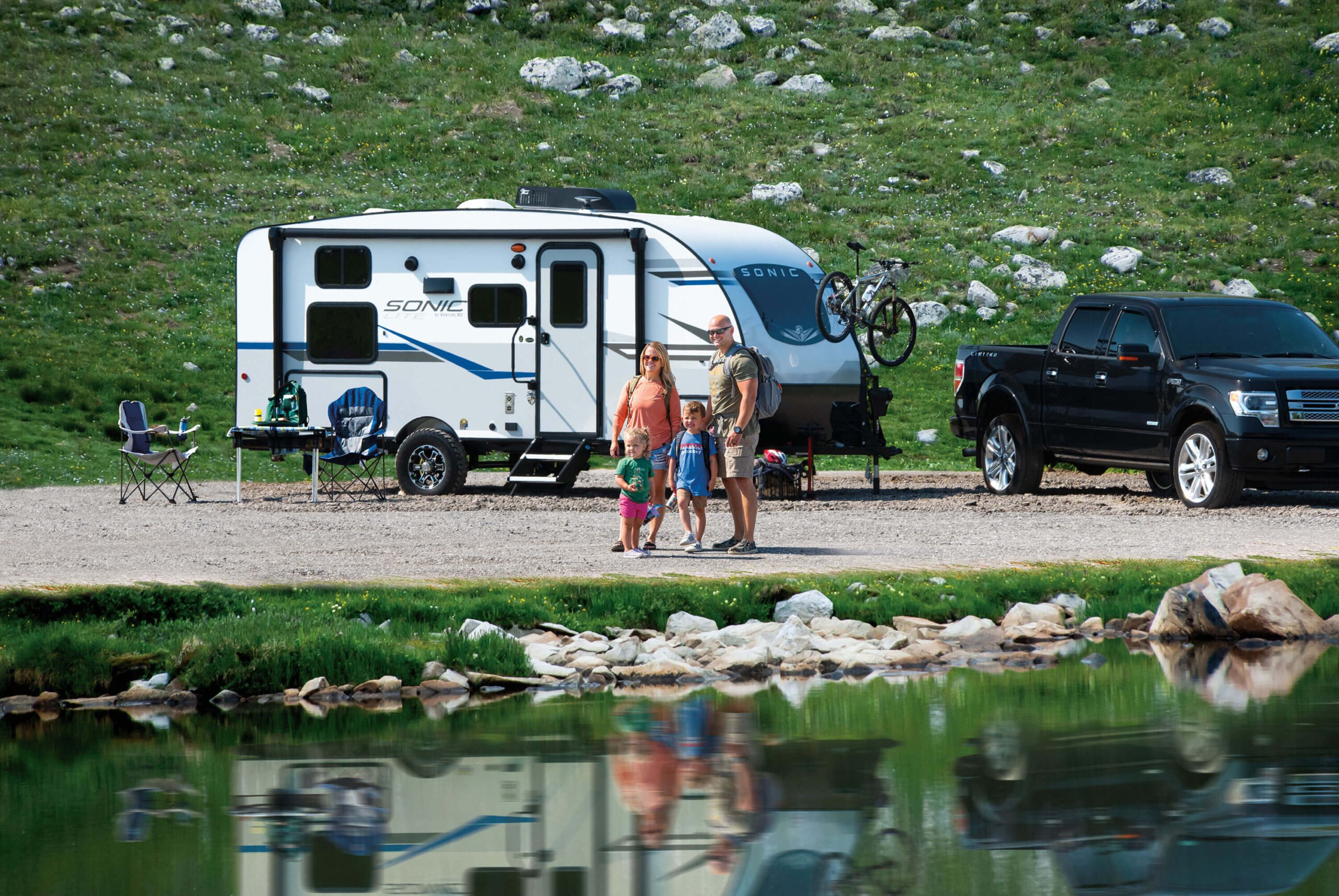
Sonic Lite trailers are engineered with a one-piece seamless fiberglass roof system.
- Hitch weight: 460 lbs.
- Gross vehicle weight rating: 3,735 lbs.
- Unloaded vehicle weight: 3,160 lbs.
- Cargo capacity: 575 lbs.
- Exterior length: 19′ 11″
- Full exterior height (with A/C): 9′ 11″
- Exterior width: 90″
- Freshwater capacity: 38 gallons
- Water heater capacity: 6 gallons
- Refrigerator: 8 cu ft
- LP gas capacity: 20 lbs
- Base MSRP: $34,059
2022 Little Guy Micro Max: Fits In Standard Garages
Finding a small travel trailer that can be parked inside a two-car garage isn’t easy unless you check out the new Little Guy Micro Max . This ultra-lightweight, four-season RV camper is a brand-new offering from Little Guy that will be coming out in early 2022.
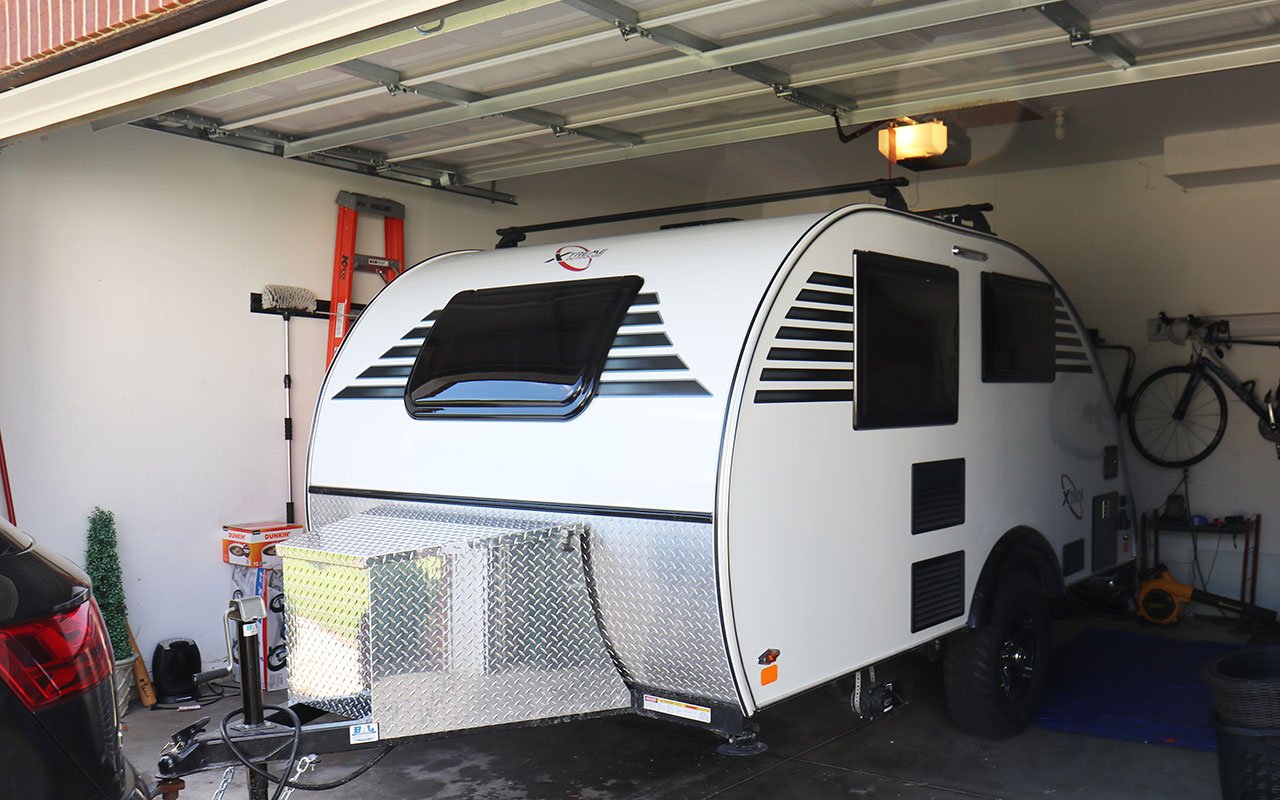
The Micro Max ultra-lightweight trailer fits inside a standard garage! Photo courtesy Little Guy Trailers.
Some of the features included in this fully equipped micro trailer are an air conditioner, a queen bed in the rear and twin bed up front, two dining areas, an interior galley, and an outdoor shower.
Headroom is a respectable 5′ 8″, which keeps the overall travel trailer height lower than the typical garage-door opening.
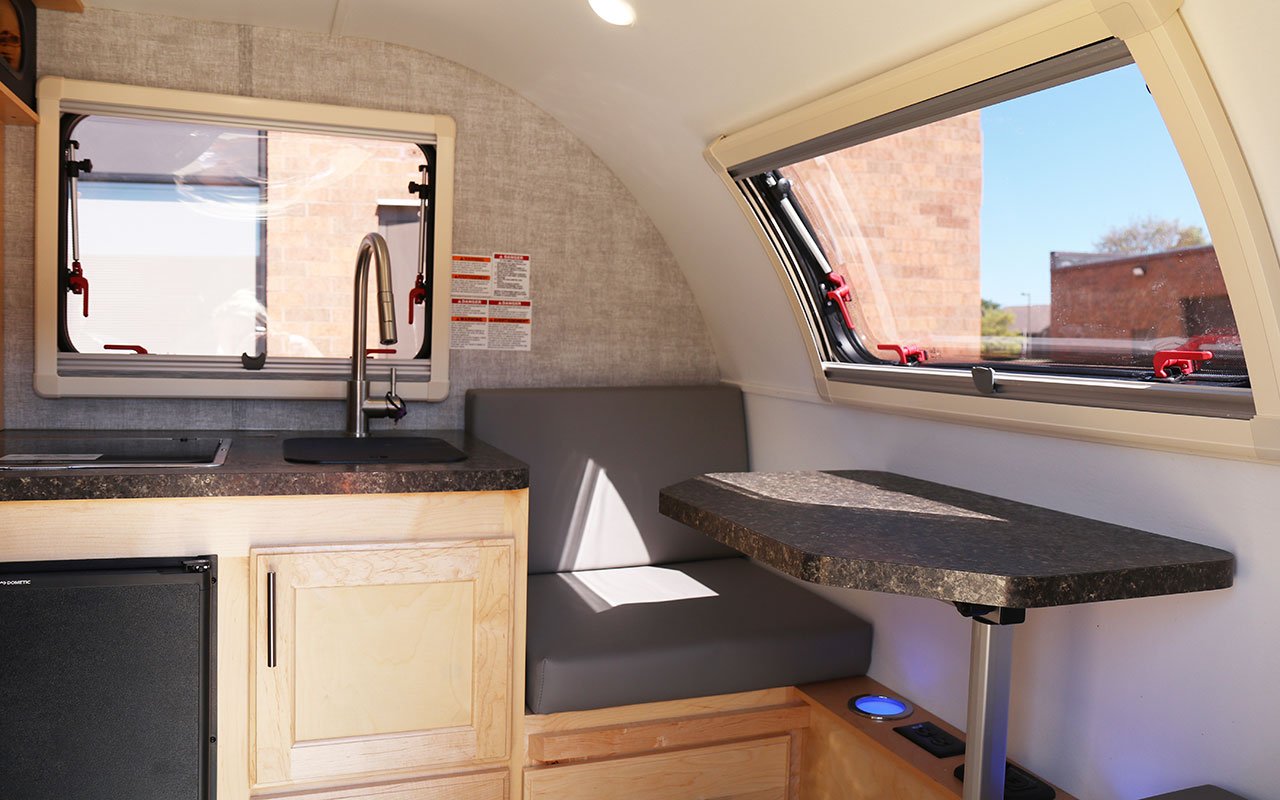
The interior of these lightweight travel trailers feels roomy with large windows. Photo courtesy of Little Guy Trailers.
- Hitch weight: 260 lbs.
- Gross vehicle weight rating: 3,500 lbs.
- Unloaded vehicle weight: 1,780 lbs.
- Cargo capacity: 1,720 lbs.
- Exterior length: 15′ 11″
- Full exterior height: 6′ 10.5″
- Exterior width: 80″
- Freshwater capacity: 12 gallons
- Gray-water capacity: 8 gallons
- Base MSRP: $25,000
Apex Nano 16R: Backcountry comfort
Be off-grid-camping ready with the Apex Nano 16R . This lightweight trailer comes with off-road tires and high-clearance suspension.
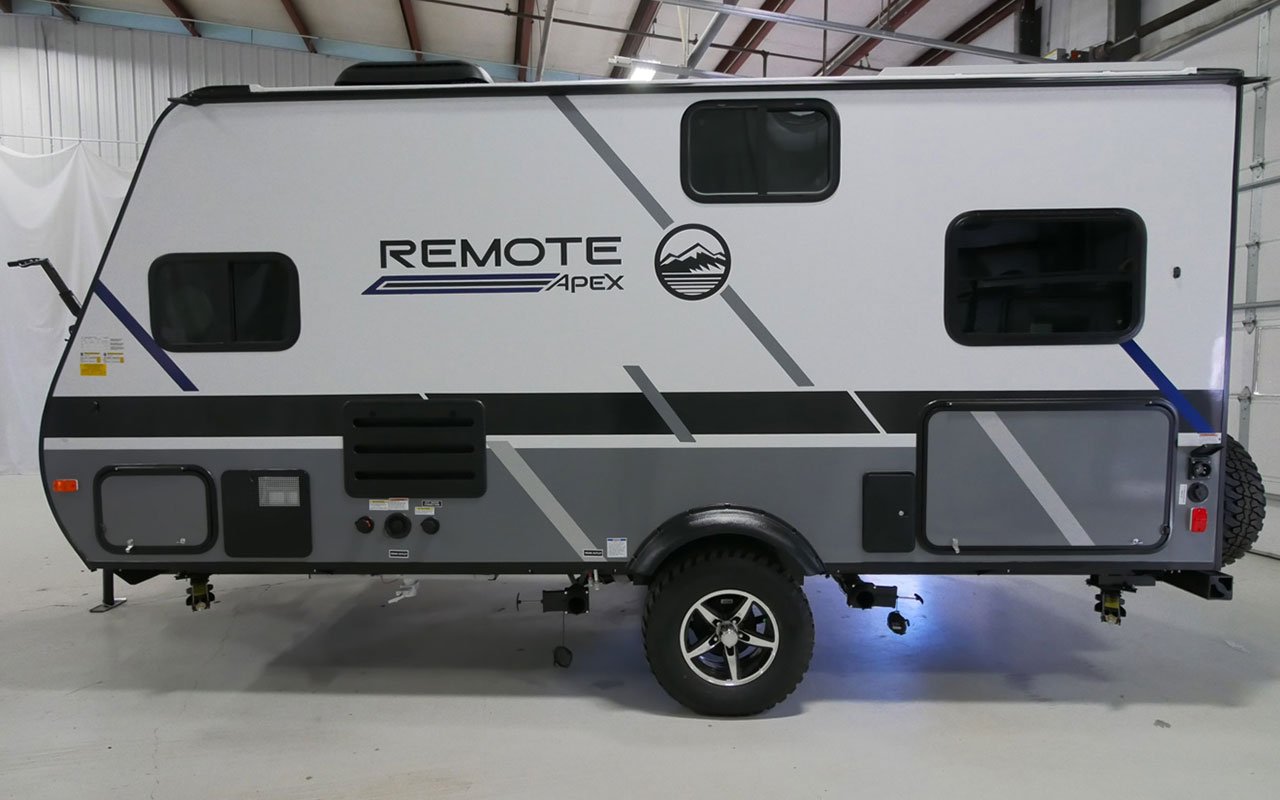
With a 3,800-pound GVWR, the Apex Nano 16R is compatible with most midsize pickups, SUVs, and some crossovers. Photo courtesy of Coachmen.
With heated freshwater and holding tanks, a 13.5K-BTU A/C, front bike rack, direct vent furnace, and sleeping accommodations for a family of four, the Apex Nano 16R travel trailer from the Coachmen line is a great choice for outdoor adventure-bound RVers. Its 3,800-pound GVWR is compatible with most midsize pickups, SUVs, and some crossovers.
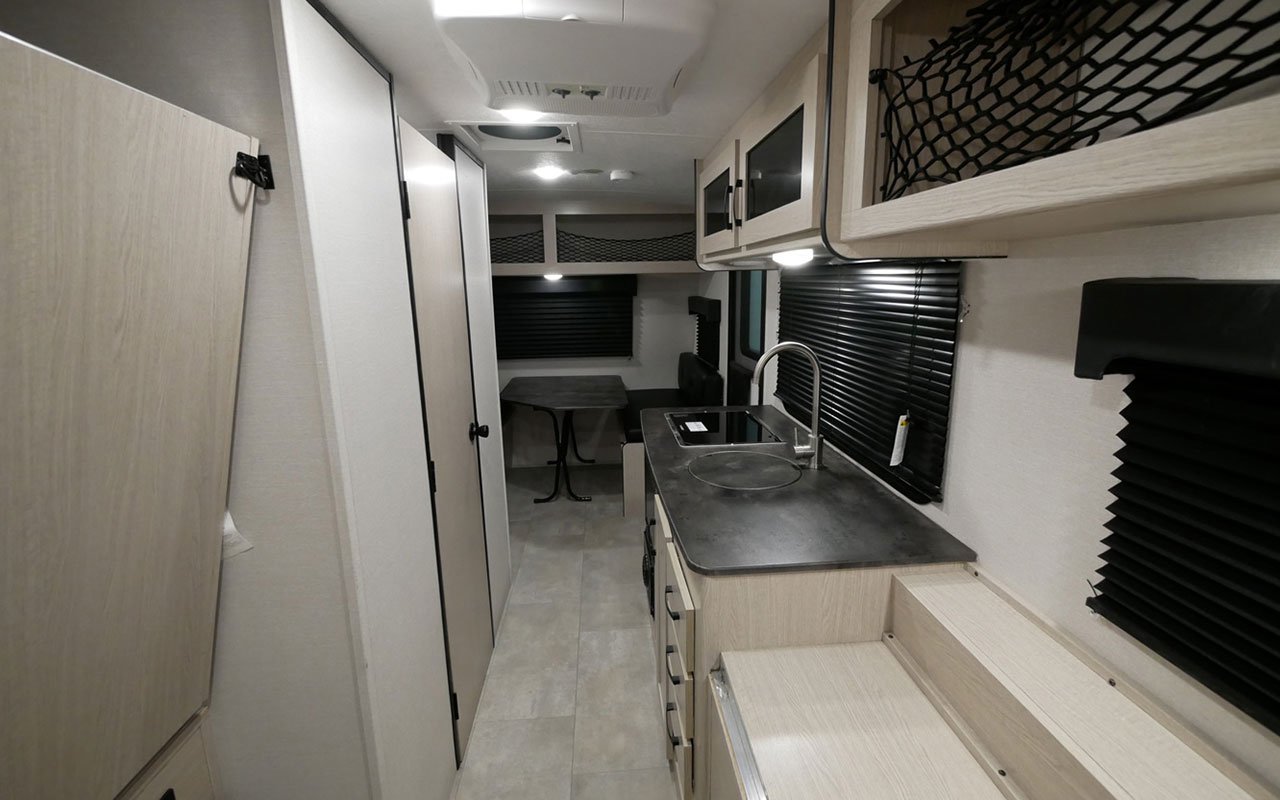
Coachmen’s Apex Nano 16R offers a 6-cubic-foot gas/electric fridge, two-burner cooktop, and microwave. Photo courtesy of Coachmen.
- Hitch weight: 330 lbs.
- Gross vehicle weight rating: 3,800 lbs.
- Unloaded vehicle weight: 2,860 lbs.
- Cargo capacity: 940 lbs.
- Exterior length: 19′ 7″
- Full exterior height: 9′ 10″
- Exterior width: 7′
- Freshwater capacity: 50 gallons
- Gray-water capacity: 35 gallons
- Black-water capacity: 35 gallons
- 6-cubic-foot gas/electric fridge
- Two-burner cooktop and microwave
- Base MSRP: $27,731
OPUS OP4: Adventure ready
There’s no other travel trailer setup like the Opus Camper’s OP4. After all, this innovative push-button, air-inflated tent camper inflates in less than two minutes and sleeps six.
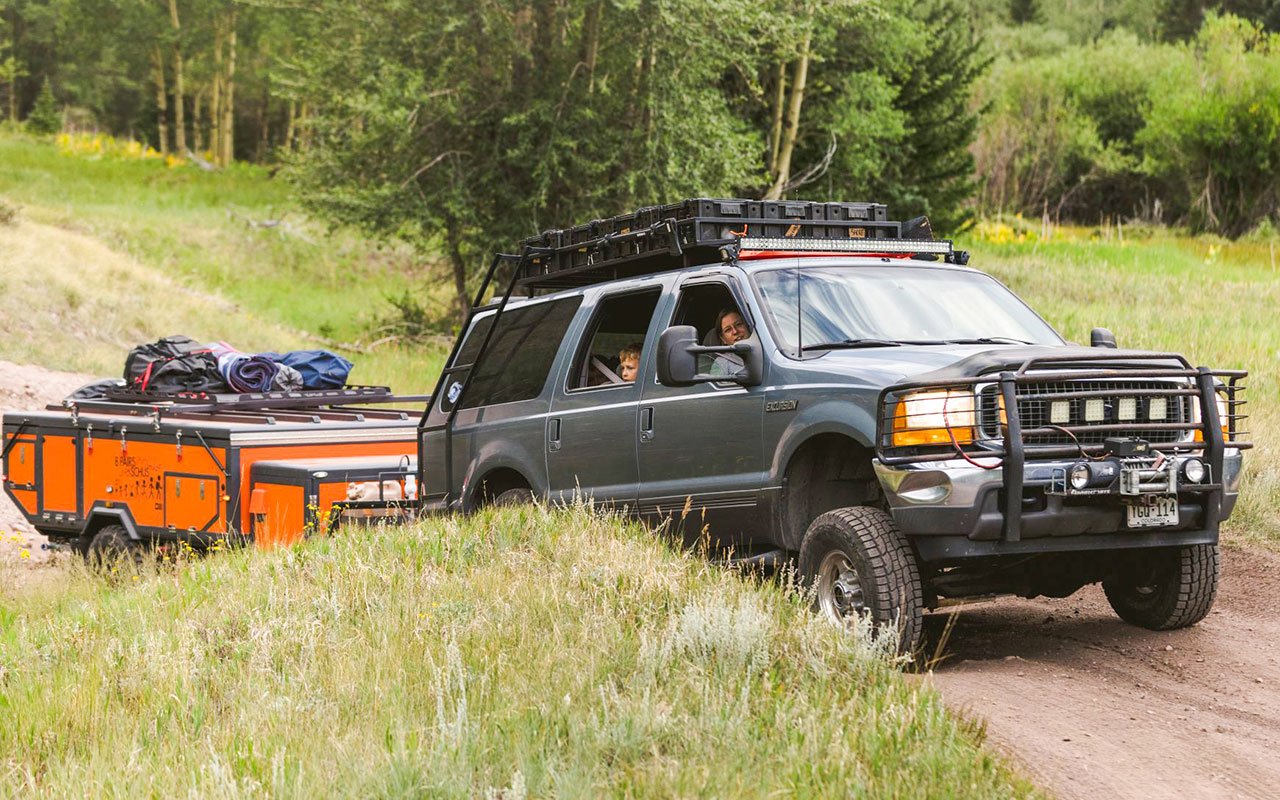
There’s no other lightweight travel trailer setup like the Opus Camper’s OP4. Photo courtesy of Opus Camper.
The OP4 has a spacious interior lounge area, high ceiling, and a ton of windows and skylights to make you feel like you’re outdoors. The external kitchen makes cooking for the family easy, and OPUS offers a long list of options, including heating, A/C, solar power, bike racks, and extension rooms to make any RV outing enjoyable.
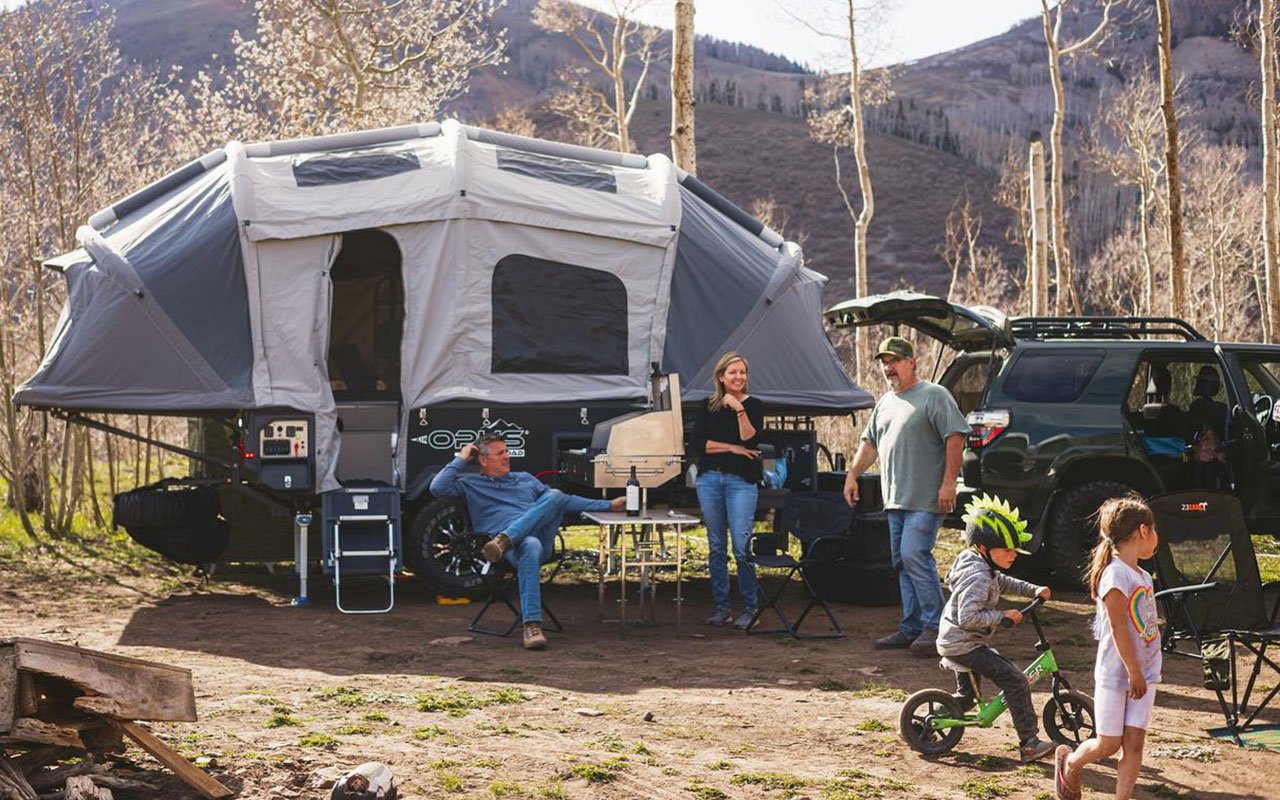
The external kitchen of the Opus OP4 makes cooking for the family easy. Photo courtesy of Opus Camper.
Features:
- Hitch weight: 400 lbs.
- Gross vehicle weight rating: 4,200 lbs.
- Unloaded vehicle weight: 3,100 lbs.
- Cargo capacity: 500 lbs.
- Exterior length: 17′ (closed)/ 21′ 4″ (open)
- Full exterior height: 5′ 4″ (closed)/ 7′ 10″ (open)
- Exterior width: 7′ 2″ (closed)/ 11′ 6″ (open)
- Freshwater capacity 40 gallons
- Cassette toilet
- Base MSRP: $27,999
Forest River Rpod RP153: Ultra lightweight
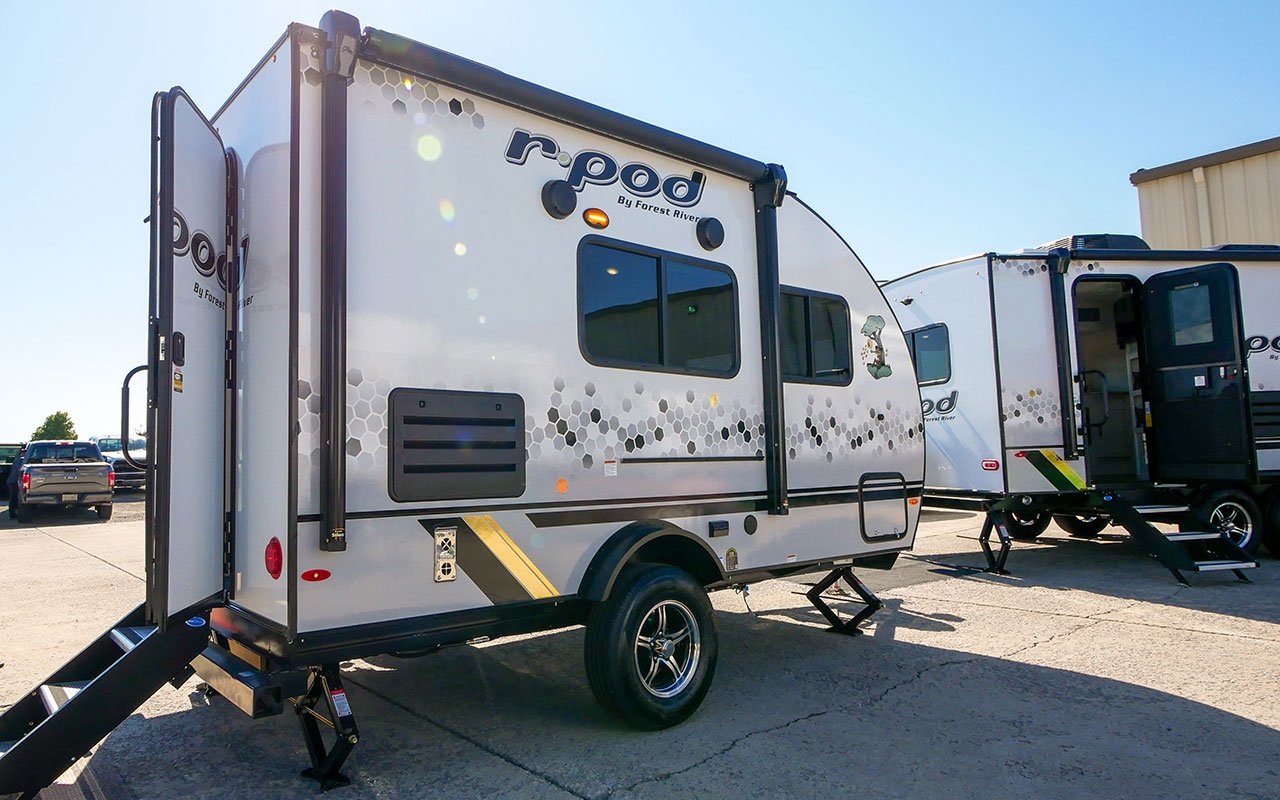
The 17-foot floorplan RPOD from Forest River is an ideal size for singles and couples. Photo courtesy of Forest River.
The RPOD is one of the best-selling ultra-lightweight travel trailers on the market. Forest River has expanded the line to seven models by adding a smaller version called the Rpod 153 . The 17-foot model has all the basic features of its bigger brethren, and its slightly smaller floorplan is ideal for singles and couples.
The rear bath is spacious, the galley very functional, and the Murphy bed in the front maximizes interior space. This is an RV camper that’s very well designed, appointed, and engineered. It’s a good match for half-ton pickups, midsize pickups, and SUVs.
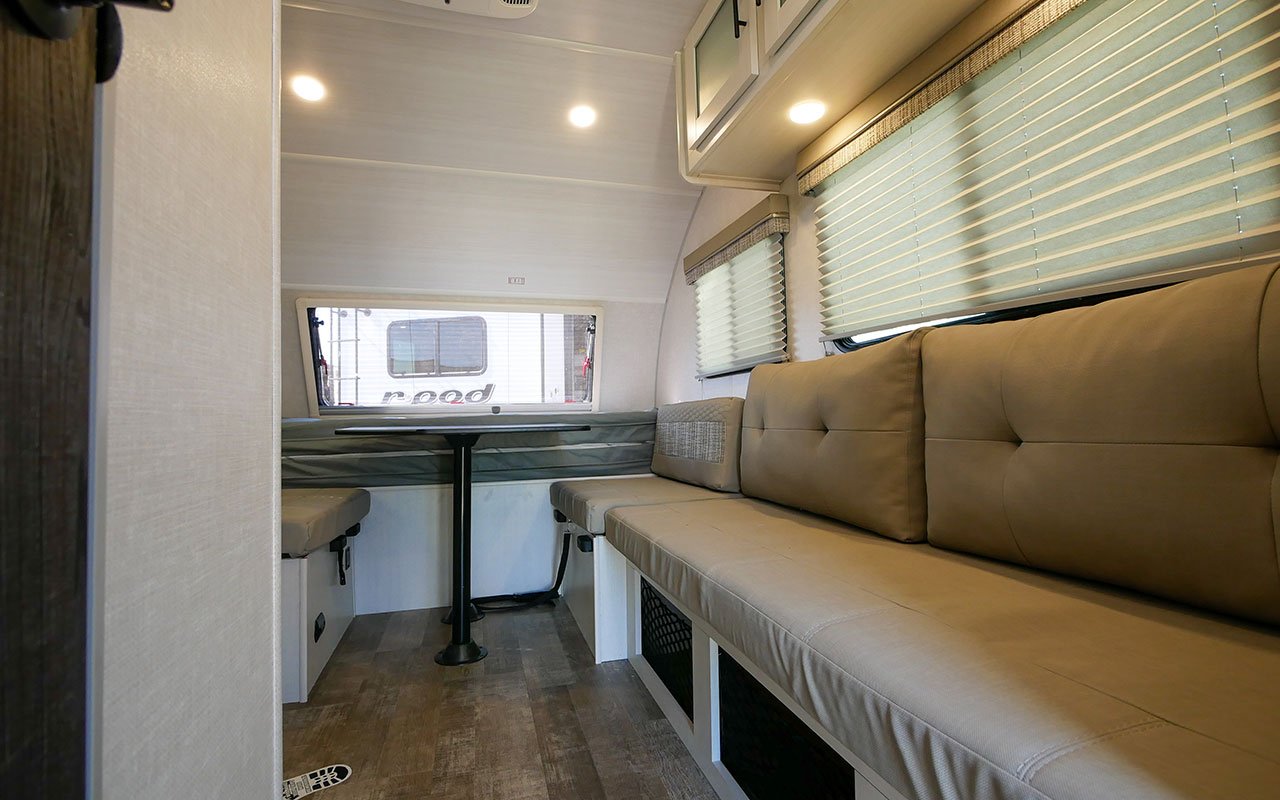
The 17-foot RPOD from Forest River is well-designed, appointed, and engineered. Photo courtesy of Forest River.
- Hitch weight: 300 lbs.
- Gross vehicle weight rating: 4,280 lbs.
- Unloaded vehicle weight: 2,880 lbs.
- Cargo capacity: 1,400 lbs.
- Exterior length: 17′ 3″
- Full exterior height: 9′ 8″
- Exterior width: 8′
- Freshwater capacity: 30 gallons
- Black-water capacity: 30 gallons
- Base MSRP: $25,500
2022 Rockwood Geo Pro 20FBS: Roomy and comfortable
Forest River’s spacious Rockwood Geo Pro 20FBS caught our attention. A walk-around bed is a real rarity in a single-axle travel trailer and a testament to the designers taking to heart what customers have been asking for in years past.
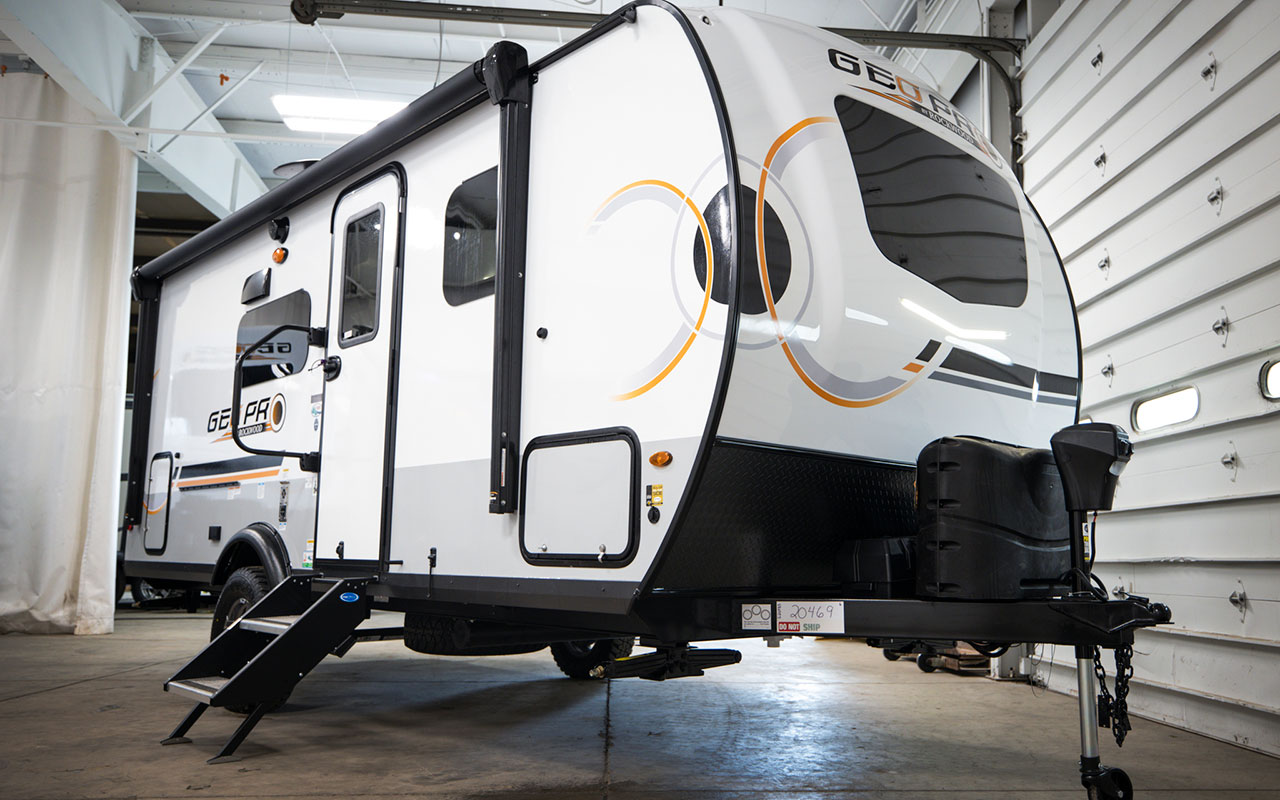
Forest River’s 2022 Rockwood Geo Pro 20FBS comes with a high-clearance axle setup and 15-inch Mud Rover Radial tires. Photo courtesy of Forest River.
The large bathroom across the rear of the RV has an oversized shower, and the 72-inch sofa in the slide-out can rotate into a comfortable hide-a-bed. The Geo Pros also come with a high-clearance axle setup and 15-inch Mud Rover Radial tires well suited for backcountry RV camping.
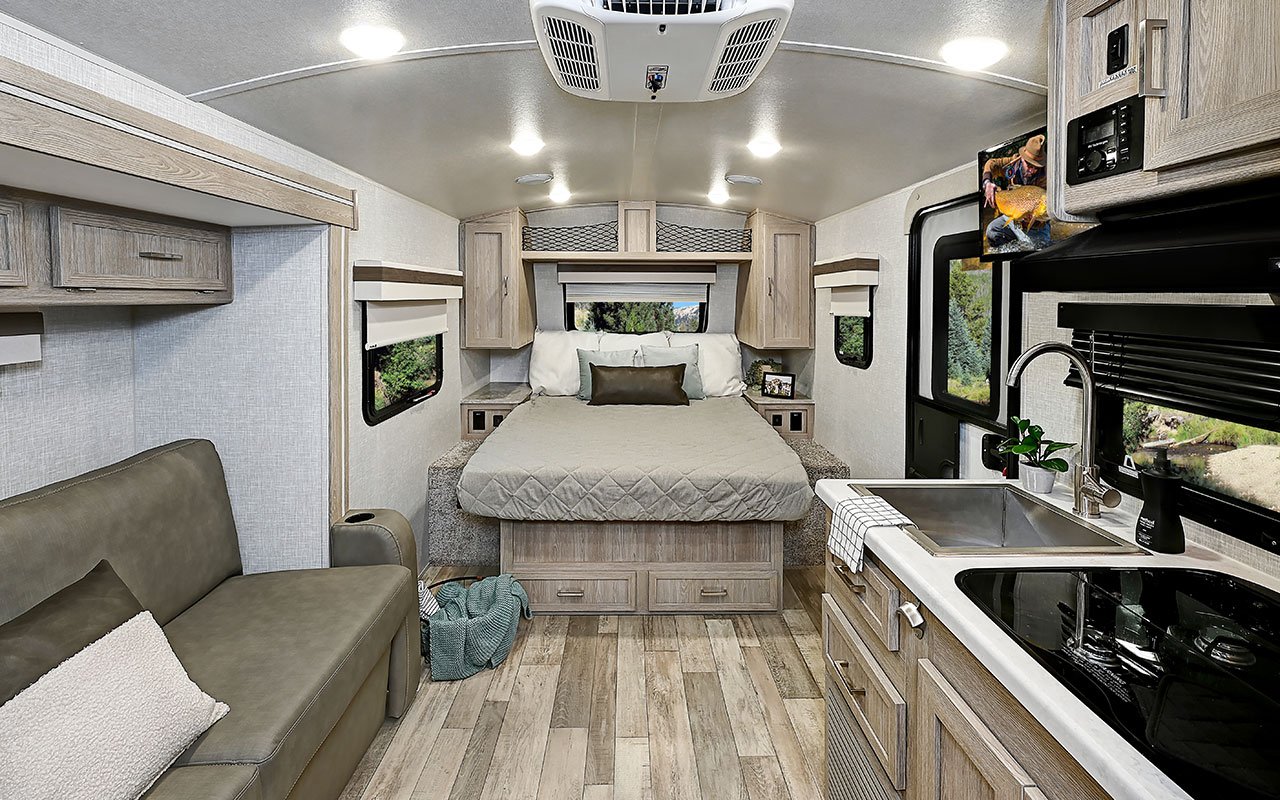
The 2022 Rockwood Geo Pro 20FBS has a walk-around bed, which is a rarity for a single-axle travel trailer. Photo courtesy of Forest River.
- Gross vehicle weight rating: 4,400 lbs.
- Unloaded vehicle weight: 3,442 lbs.
- Cargo capacity: 958 lbs.
- Exterior length: 21′ 8″
- Exterior width: 92″
- Freshwater capacity: 31 gallons
- 54″x74″ Full-size bed
- 14-foot awning
- Outside shower
- Tire pressure monitoring system
- Base MSRP: $32,675
That’s our list of the most innovative new lightweight travel trailers of 2022. These small RV models are big on affordability, convenience, and amenities.
As a bonus, the features are packaged in a small camper footprint. In most cases, you won’t need to purchase a tow vehicle for these trailers. To find out how much weight your car can pull, open your vehicle’s manual. Look for the maximum trailer towing capacity and you’ll find the answer.
Why lightweight travel trailers are in demand
If you’re thinking about buying one of these lightweight travel trailers, you’re in good company. Demand for big and small RV models is soaring.
For example, according to the latest issue of RV RoadSigns , the quarterly sales forecast published by the RV Industry Association (RVIA), RV manufacturers are still scrambling to meet consumer demand that started in 2020. This year, more than 600,000 new RVs will be sold. These figures are all-time high that will exceed the record-breaking RV sales of 2021.
“The remarkable production from the RV manufacturers and suppliers is nothing like we have ever seen before, and our new forecast shows the record-breaking streak will continue,” said RVIA President and CEO Craig Kirby.
Editor’s note: RV manufacturer materials costs are constantly increasing. The current base costs for the small, light travel trailers on our list may have changed since the time of this writing (Q4 2021).
Connect with other RVers
One of the best parts about RVing is engaging with the community of traveling enthusiasts. iRV2 forums allow folks to chat with other RVers online, and get other perspectives on everything RVing, including products, destinations, RV mods, and much more.
Related articles:
- 10 Best Lightweight Travel Trailers For 2023
- 8 Best Small Pull Behind Campers For 2022
- A Look At The New 2022 Keystone Campers

RV Zone is reader-supported. When you buy through links on our site, we may earn an affiliate commission. Learn more
How Much Does an RV Weigh? (With 11 Examples)

Writen by Tom Hank

Fact checked by Joseph Varney

Knowing the weight of an RV can help camper and motorhome owners prevent different issues. For instance, RV owners can purchase and drive the correct camper based on their licenses’ restrictions. But how much does an RV weigh?
The average RV weight often depends on the class. For instance, a camper’s weight can be within the range of 16,000 to 30,000 pounds if it is a Class A motorhome. However, Class B travel trailer weight can be within the 6,000 to 11,000-lb range.
Take note that these figures denote RV dry weights. Also, Class C RVs possess a different weight range than Class A and B variants. Keep reading to know more about how much a motorhome weigh and take a look at some examples per RV class.
Table of Contents
What Is the Difference Between Dry Weight vs. Gross Vehicle Weight?

An interested camper vehicle buyer may look at an RV weight chart and see dry weight and gross vehicle weight (GVW). Despite the presence of the word ‘weight’ in both terms, they are different.
1. Gross Vehicle Weight
Denoted as the weight of a fully-loaded motorhome or travel trailer, the GVW often signifies the inclusion of the different items carried by a specific RV. These objects may include (but aren’t limited to) cargo, passengers, and the driver.
Take note that the GVW is only an approximation. It provides RV users with the potential weight of their vehicles to know how much load they can carry.
2. Dry Weight
Unlike the GVW, the dry weight represents the actual weight of the motorhome or travel trailer without the additional load. However, RV manufacturers often include the batteries, generators, and other ordered equipment in this measurement.
What Is The Largest Motorhome You Can Drive on a Car License?
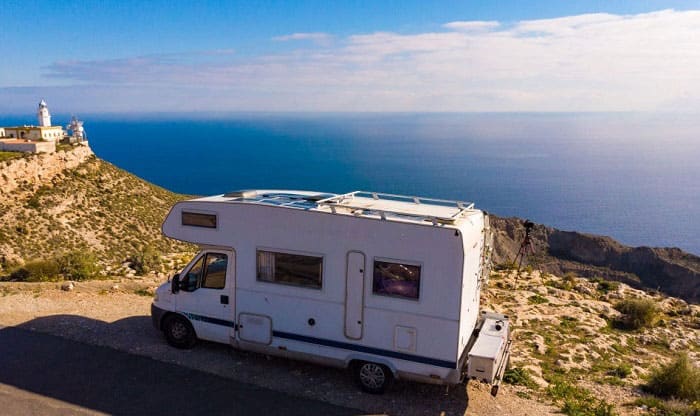
Motorhome drivers operating motorhomes beyond a weight limit mandated by certain states may need a special license. Take note of the following examples of states and the requirements in their regions:
- California: Class B license for vehicles over 26,000 pounds.
- Nevada: Class B license for over 26,000 pounds.
- New York: For a vehicle weight of 26,000 pounds, owners should acquire a Recreational (R) endorsement for vehicles.
- South Carolina: Class E licenses needed for owning and driving vehicles over 26,000 pounds.
Moreover, some states require RV drivers to declare if they are using their vehicles for commercial or non-commercial use. Additionally, some states, such as Georgia and Idaho, do not require motorhome drivers to possess special licenses for their vehicles.
How Much Does a Class A Camper Weigh ?
Many Class A RVs fall within the weight range of 16,000 to 30,000 pounds. Some of these campers may look like 5 th wheels. However, the weight of 5 th wheel camper is different since many RVs in this category fall within the 12,000 to 15,000 range.
Here is a list of some Class A motorhomes and the details on their weights for your review:
1. 2022 Newmar Dutch Star
The GVW of this vehicle ranges from 40,000 to 51,000 pounds, depending on its floor plan. Interested buyers can choose among 11 different floor plans, including the 3709, 3717, and 4369.
Those who wish to purchase this camping vehicle for their trips can enjoy a host of different entertainment features. Some of the standard elements that are available in all floor plans include two bedroom speakers, a satellite dish prep, and two TVs.
Take a tour of this Class A RV by watching the video below:
2. 2022 Entegra Aspire
This Class A vehicle’s standard floor plan has a GVW of 41,000 pounds and a gross combined weight (GCW) of 51,000 pounds. However, purchasers may opt for the higher-tiered floor plan, which has a 49,000-pound GVW and a 64,000-pound GCW.
Like other RV makers, Entrega equipped their 2022 Aspire model with many comfort and entertainment features. The standard elements included in all 2022 Aspire options include a Blu-ray player, two TVs, and LED interior lighting.
You can also take a detailed look at this motorhome by checking out the video below:
3. 2022 Tiffin Allegro Bus
With a GVW of 41,000 to 51,000 pounds, this Class A camper is one of the roomier options on the market. It provides different amenities and features that are both functional and family-friendly.
Drivers of this vehicle will enjoy a 450 HP engine, adaptive cruise control, and an elevated rail chassis. As for the passengers, they can experience and enjoy features like a king-sized bed, interior and exterior TVs, and a residential refrigerator.
Find out more about the 2022 Allegro Bus by watching this video:
4. 2021 Forest River FR3
The FR3 is one of the smaller Class A vehicles you can find. With its GVW of 18,000 for the base floor plan, many users can drive this RV in different states without the need for special licenses.
Despite its relatively compact and lightweight construction, the 2021 FR3 still offers many comfort- and entertainment-focused features. These aspects include rubber entry steps, vinyl flooring, and three LED TVs.
Check out the video below to learn more about the 2021 Forest River FR3:
5. 2022 Holiday Rambler Navigator
This Class A RV offers different top-of-the-line features packed into its fairly reasonably 33,000 GVW. Expect this vehicle to come with amenities like power cockpit blinds, dual roof air conditioner vents, and a fireplace.
How Much Does a Class B RV Weigh?
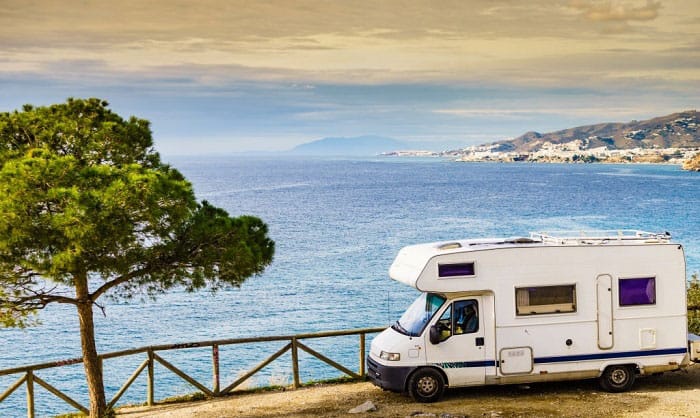
Class B RVs often fall within the weight range of 6,000 to 11,000 pounds. These options typically have similar chassis and weights. However, different manufacturers will present buyers with varying floor plan options to promote versatility.
Continue reading to know some Class B motorhomes, their weights, and some of their built-in features:
1. 2022 Winnebago Solis
It might be reasonably easy to assume that the 2022 Solis cannot handle a significant amount of weight because of its fairly compact looks. But this 11,000 to 12,000-pound GVCW Class B RV comes with many features fit for different campers.
For instance, users of this motorhome can enjoy a 220-watt solar battery system that charges from a pop-up roof unit. Moreover, there are two exterior wash stations and a cassette toilet for convenient bathroom access during outdoor camping sessions.
Watch the video below to view and compare the different 2022 Winnebago Solis floor plans:
2. 2021 Mercedes Benz Metris Getaway Van
Despite having ‘van’ in its name, this Class B motorhome has a GVW rating of about 6,400 pounds. It is one of the smaller RVs in its class, which can make it a good choice for solo or couple campers.
Inside, users can enjoy a sleeping area for two people. This location also has USB charging ports for your devices. Moreover, the front seats can rotate 180 degrees, providing additional space if needed.
Other features to note are light and rain sensors and air conditioning. Notable exterior features are also available, such as automatic lights for compartment doors and optional roof racks.
Click on the video below to get to know this vehicle better:
3. 2022 Pleasure-Way Tofino
With a GVW of 8,550 pounds and a GCW of 11,500 pounds, the 2022 Tofino offers comfort and sport features in one Class B motorhome. Interested RV buyers may also like its minimalist contemporary design.
This vehicle’s cabin provides comfort-focused features, despite its reasonably compact construction. For instance, it has a queen-sized bed, zippered vents, and an induction stove.
The video below gives you a quick tour of this Class B RV:
How Much Does a Class C RV Weigh?
Class C RVs generally weigh about 10,000 to 12,000 pounds. This heft also usually comes with designs similar to moving trucks or vans. Moreover, Class C vehicles often have closer resemblances to vans compared with Class A’s bus-like looks.
Here are some examples of Class C RVs, their weight ratings, and other notable features:
1. 2022 Tiburon Luxury Sprinter
This 2022 Class C RV has a GVW of 11,030 pounds with a powerful towing hitch capacity of 5,000 pounds. Drivers can take advantage of the multimedia console on the dashboard, which can also connect to a smartphone via Bluetooth.
As for the passengers, a bunk sleeping area is available. Children can reach the top bunk by extending the bunk ladder. Furthermore, a living room TV is ready to provide additional entertainment.
Learn more about this Class C motorhome by watching the video below:
2. 2021 Jayco Greyhawk Prestige
This Class C motorhome is among the heaviest of its class with its GVW of 14,500 pounds. However, users can take advantage of more amenities and features that a typical Class C camper may not have.
Its heftiness carries elements like automatic hydraulic leveling jacks, a panoramic window with power shade, and an infotainment center. Three TVs are also in the living, bedroom, and exterior areas.
Take a quick tour of the 2021 Jayco Greyhawk Prestige by watching the video below:
3. 2022 Tiffin Wayfarer
The 2022 Tiffin Wayfarer has a GVW of 11,030 pounds, which puts it in the average weight range of Class C RVs. This 188 hp motorhome offers many things that RVers would want in a Class C motorhome.
One feature that drivers of this vehicle may like is the adaptive electronic stability. With it, the camper balances and stabilizes during drives to prevent unnecessary movements like rocking and swaying.
If you want to learn more about the 2022 Wayfarer, watch the video below:
How Much Weight Can a Camper Tow?
RV owners can use an online vehicle towing capacity calculator to verify the amount of weight their campers can tow. You can also take a look at the list below to find rough estimates on different campers’ towing capacities:
- RVs over 8,000 pounds: 1,000 pounds
- RVs under 8,000 pounds: 750 pounds
- RVs under 5,000 pounds: 500 pounds
Expect that the results given by the online calculator are also an estimation. You should also consider other factors, such as the vehicle’s cargo weight, hitch or tongue weight, and payload capacity.
It is advisable to know how much does an RV weigh to avoid paying expensive fines. Take note that some state governments impose strict rules regarding vehicle weight limits.
Here is a short list of things to do to ensure you are going to purchase and use the right motorhome or travel trailer:
- Identify your needs for your camping adventures.
- Ensure that the RV you choose can handle the weight of interior appliances, electronics, and other objects.
- Check with state authorities to know if driving your motorhome requires a special license

Hi, I am Joseph. Carpe diem! Seize the day! That’s always been my life motto. If you haven’t seen some of the most beautiful places in the country, you are missing out on incredible adventures.

- Types Of RVs
- Tow Vehicles
- Maintenance & Repairs
- RV Power & Electrical Supplies
- RV Appliances
- Living In An RV
- Travel & Destinations
- RV Gear Buyer’s Guides
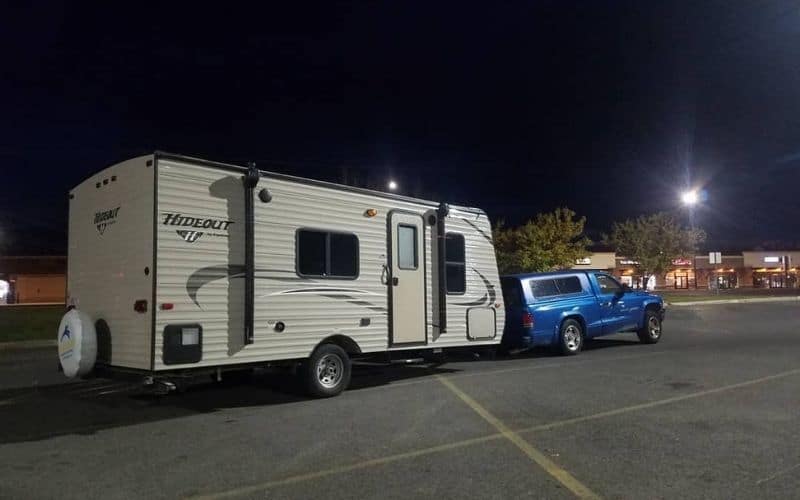
Weighing Your RV: How To Do It and Why It’s Important
- Last Updated: March 18, 2024
- 13 minutes read
There is nothing more satisfying to me than taking the RV on the road for a big adventure.
It’s an amazing feeling to have a home on wheels to take with us to explore new places and make new memories.
But before my family and I can enjoy our adventure, we need to know if our travel trailer is safe for travel. Knowing the weight of our rig is part of that safety measure.
Where, how, and why should RVers weigh their motorhomes, travel trailers, or fifth wheels?
There are various places where you can get your camper weighed. You can have it weighed at a truck stop using CAT scales , or it can be weighed by individual tire position by the RV Safety and Education Foundation (RVSEF). Weighing your RV is important for many reasons—from avoiding tire blowouts to knowing the appropriate tow vehicle to use to traveling over bridges safely.
Let’s discuss in detail why it is important to have your RV weighed. We will also consider where you can go to get this service and what the process is like.
Why Should You Have Your RV Weighed?
Safety is the primary reason to weigh your RV. Whether you drive or tow your rig, traveling with it overloaded places you, your passengers, and everyone on the road with you in danger.
Here are some hazardous situations weighing your RV may help you to avoid:
1. Tire failure

Having an overloaded RV can cause your tires to exceed the weight rating. When this happens, increased friction occurs on the walls of the tires.
The friction will cause a buildup of heat, and overheating can lead to premature wear, tread separation, and ultimately tire blowouts .
A tire blowout can severely damage the flooring and skirting of an RV. Even worse, tire failure can make you lose control and have an accident.
2. Exceeding Bridge or Road Weight Limits
You may need to travel across a bridge or road with a maximum weight limit. If you don’t know your weight, you could end up with a ticket or in very serious danger.
3. Axel and Suspension Strain
Overloading your RV axles can cause extra wear and strain on the suspension components of your RV or tow vehicle.
Axel or suspension failure can lead you to lose control of the vehicle(s) and perhaps cause an accident.
4. Tow Vehicle Damage
Overloading a travel trailer or fifth-wheel can damage your tow vehicle . Your RV’s weight could exceed tow capacity without you knowing it.
This can overwork the vehicle and cause damage to the engine, transmission, and other components over time.
Gradually, this could result in significant failure of the tow vehicle and require major repairs or worse.
Understanding RV Weight Ratings
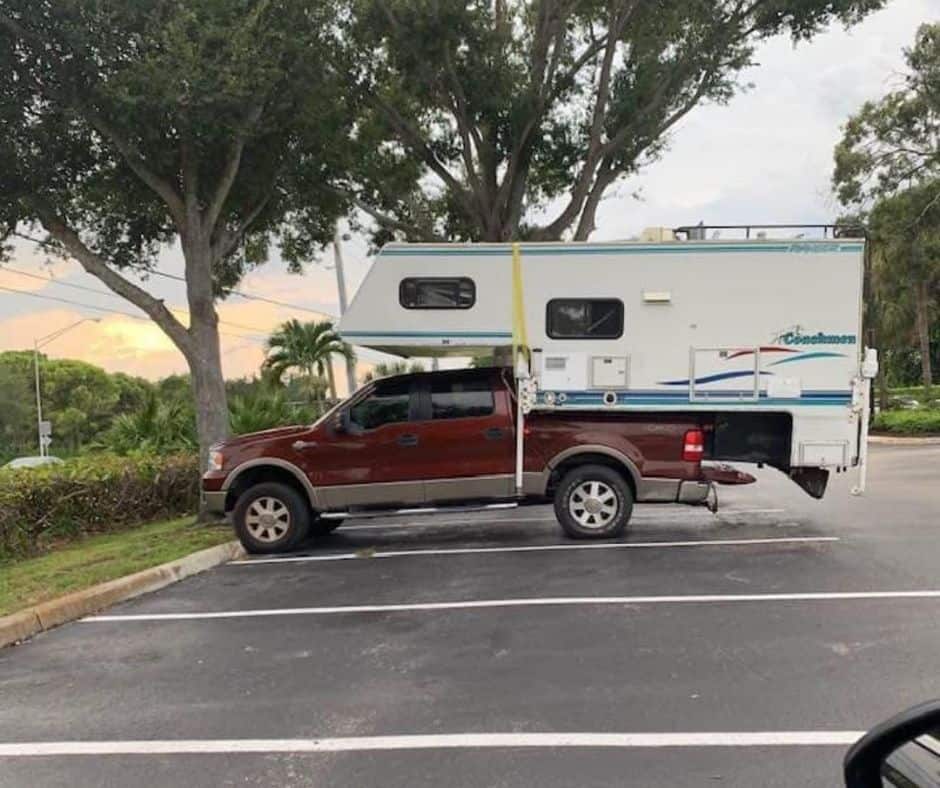
Now that we see how important it is to ensure your RV is not over its weight limits, we need to understand the weight ratings.
This will help us to know what to look for when the RV is weighed.
These ratings are often expressed by several acronyms that can be confusing. Let’s discuss 4 of them and their meanings.
Gross Vehicle Weight Rating (GVWR)
One of your RV’s most important safety considerations is the Gross Vehicle Weight Rating (GVWR).
The GVWR is the vehicle’s maximum weight capacity when fully loaded with passengers, cargo, fluids, and fuel.
You can find this information in your camper’s owner’s manual or on a sticker or plate attached to your RV.
You can also find your rig’s specifications online on the manufacturer’s website.
Knowing your GVWR lets you know if you are safely within the vehicle manufacturer’s weight limits and highway regulations.
When you get your RV weighed, you will learn the actual Gross Vehicle Weight (GVW) so that you can be sure it doesn’t exceed the GVWR.
Cargo Carrying Capacity (CCC)
The cargo carrying capacity (CCC) determines how much weight you can add to your unloaded RV without exceeding the weight limit.
Gross Axle Weight Rating (GAWR)
The maximum weight each axle on the RV can safely carry is called the gross axle weight rating (GAWR).
If the actual weight on the axles exceeds this number, the suspension components can become overloaded and cause failure, possibly leading to an accident.
Gross Combined Weight Rating (GCWR)
The maximum combined weight of a tow vehicle and the vehicle being towed is the gross combined weight rating (GCWR).
This rating is important when vehicle towing is involved—whether you have a truck or SUV towing a travel trailer or fifth wheel or if your motorhome is towing a car.
Before You Weigh Your RV…
Load it up!
You’ll want to know the weight of your rig when it is packed up for travel. The only way to know how much the RV weighs when fully loaded is to weigh it with genuine, realistic loads.
So make sure you have all the passengers, fuel, water, supplies, clothing, and bedding you would normally bring for a trip.
Now you’ll be able to tell if your normal load is under or over your weight limits when you weigh your rig.
Where to Weigh Your RV
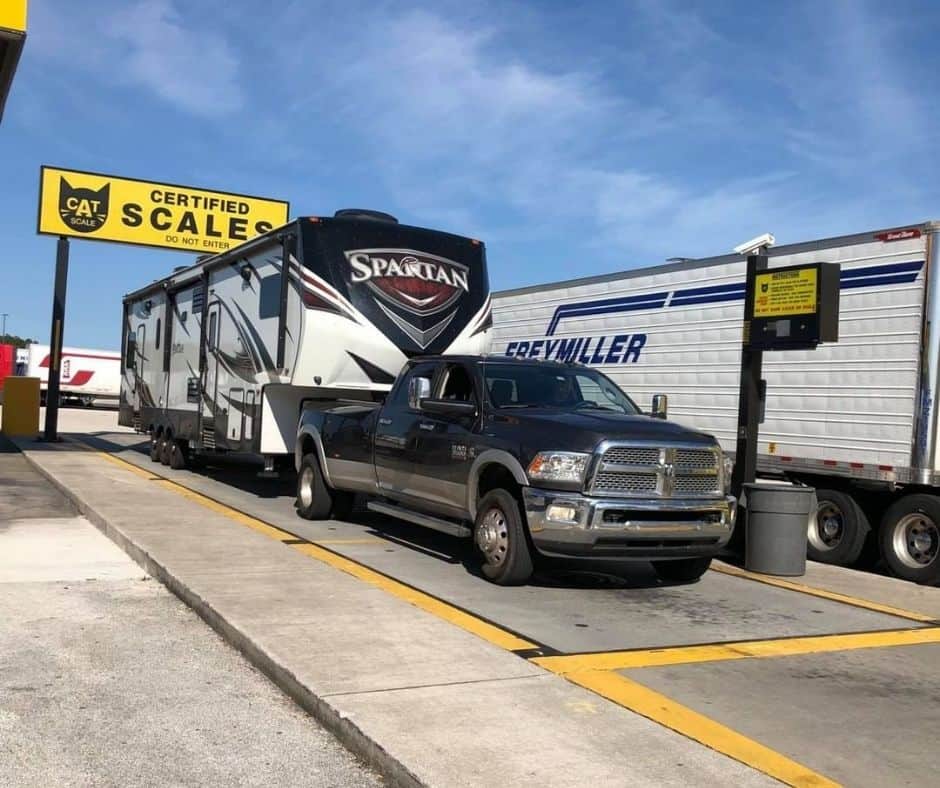
Now that we’ve discussed how important it is to weigh your RV, where can you go to have your RV weighed? Here is a basic overview of the options:
- CAT scales
- Farm co-ops or feed mills
- Sand and gravel yards
- Moving and storage companies
- RVSEF (for wheel position weighing)
Let’s look at the details about using 2 of the popular options listed here: CAT scales and RVSEF wheel position weighing.
How To Weigh Your RV Using CAT Scales
Many truck stops have certified CAT scales, and they also allow RVs to be weighed there. It usually costs between $10-$15 to use this service.
CAT scales line up three scales in one, allowing them to record total vehicle weight and the weights on the axles at once.
You have to be sure to line up your vehicle with the axles on the right scales.
You can conveniently get your weighing results electronically through their “Weigh My Truck” app or by email.
Here’s how to use CAT scales to weigh your camper:
Weighing a Class A, B, or C motorhome or truck camper using CAT Scales:
Pull up to the scale and make sure your window aligns with the call box.
Your front wheels should be on the first scale, and your rear wheels should be on the second scale.
If you have a vehicle you are towing, it should be on the third scale. See the images below:
Image source: catscale.com/how-to-weigh/
If you are not using the app, you’ll press the call button to speak to an attendant who will initiate the weighing. If you are using the app, the process will be electronic.
When you get your results (either on the app or by getting the printed report), make sure the gross (total) weight doesn’t exceed your RV’s GVWR and that the steer axle and drive axle weights don’t exceed the GAWR.
Weighing a fifth wheel or travel trailer using CAT Scales:
If you are weighing a fifth wheel or travel trailer, you will have a little bit more to consider.
You need to consider the weights of the vehicles and the contents, but also the weight of the hitch.
“Tongue weight” is the weight that the trailer is applying to the back of the tow vehicle. This can also be referred to as “pin weight” on a fifth wheel.
It’s important that there’s not too little tongue weight, or it will create potentially dangerous sway in the trailer.
If there is too much tongue weight, on the other hand, the towing vehicle’s rear tires will be overloaded, causing the vehicle’s rear end to be pushed down.
As a result, the vehicle will become difficult to steer, and braking may become less responsive, all of which are potential hazards.
For a hitched travel trailer, tongue weight should be no less than 10% of the trailer weight, and for a fifth wheel, it should be no less than 20%.
When you take your travel trailer/fifth wheel to the scales, you want to find these weights:
- Weight of tow vehicle and trailer together
- Weight of the tow vehicle by itself
- Weight of the trailer/fifth wheel by itself
- The trailer tongue or pin weight (carried by the tow vehicle)
- The trailer axle weight
- For a fifth wheel, you should also get separate weights for each axle on the tow vehicle
If you are weighing a travel trailer, you want to make sure your tongue weight is less than the maximum tongue weight allowed by the tow vehicle hitch and that the tongue weight percentage is greater than 10%.
If you have a fifth wheel, make sure the pin weight is less than the maximum pin weight for your fifth wheel hitch.
Here’s the process:
Again, pull up to the scale with your driver’s side window lined up with the call box.
The front wheels of the truck or SUV you’re towing with should be on the first scale, the rear wheels of your towing vehicle should be on the second scale, and the fifth wheel or travel trailer tires should be on the third scale. See the images below:
Press the call button for the attendant. Say that you have an RV trailer and need a second weigh-in of the tow vehicle after this weigh-in.
That way, they’ll be expecting you to come back around and may only charge you for a re-weigh (about $3 more.)
Tell the attendant to record the weights from the 3 scales for you. Let’s refer to them here as Weight 1 , Weight 2 , and Weight 3 .
You should then drive off the scale, unhitch the trailer, and return to the scale with only the tow vehicle. This is so you can calculate the tongue or pin weight.
The axles of the tow vehicle can be split between the two scales. Add those 2 weights, and we’ll refer to that total as T. Weight .
You’re going to need to have available the weight rating information for your tow vehicle.
You can find this information online from the vehicle manufacturer’s website or the owner’s manual.
When you get the weight results, you’ll be making comparisons to be sure that not only do none of the weights of the trailer/fifth wheel exceed the ratings, but that the weights of the tow vehicle are also within the specified ratings.
So here’s what you’ll be checking for when you get your results:
- Compare Weight 1 to tow vehicle front axle GAWR.
- Compare Weight 2 to the tow vehicle rear axle GAWR.
- Compare Weight 3 to the combined trailer axle GAWRs.
Ensure that none of these 3 weights exceed the GAWR of the tow vehicle or trailer.
(Remember that T. Weight is the axle weight of the tow vehicle without the trailer that you received in the report.) Next, make these calculations:
- Weight 1 + Weight 2 = Tow vehicle weight with trailer tongue or pin weight
- ( Weight 1+Weight 2 ) – T. Weight = Trailer tongue or pin weight
- ( Weight 1 + Weight 2 + Weight 3 ) – T. Weight = gross trailer weight. Compare this to trailer GVWR and be sure it does not exceed it.
If you find that any of these weights exceed gross weight ratings, make adjustments to your load and re-weigh.
RVSEF Wheel Position Weighing
The RV Safety and Education Foundation (RVSEF) is a non-profit organization that provides the RV world education that focuses on safety.
The RVSEF says that wheel position weighing, specific to RVs, is the only way to know the proper inflation rate for your tires.
As discussed earlier, an RV that exceeds its weight rating can cause tires to exceed their weight rating.
And overloaded tires can lead to blowouts, which in turn can lead to very dangerous situations.
During wheel position weighing, each of your RV’s tires will be weighed individually so you can know how much weight each tire is supporting.
This is beneficial because weight is not divided in perfectly even ways. One tire may be supporting an appropriate load due to its position, whereas the tire across from it may be overloaded due to where it sits on the rig.
Here’s the process to weigh your RV the right way:
1 . Make an appointment with RVSEF and fill out the required forms.
2 . arrive at the designated weighing site (preselected for levelness and convenience) with your rv loaded as you would for a trip., 3 . if you have a motorhome, they will put the vehicle on their specialized scales, take the readings, and provide you with a report. the process is the same if you have a towable travel trailer or fifth wheel, except they will weigh the tow vehicle separately to find the pin or tongue weight..
When you get the results, you’ll know which areas of your RV need weight adjustments for tire safety.
You‘ll also know how best to inflate or even remove air from the tires based on the specific weights they are supporting.
How Much Does It Cost to Weigh an RV?
How much you pay to have your camper weighed depends on where you go for this service.
You may be able to weigh your RV for free at sand and gravel yards, feed companies, or moving companies. You’ll have to call to see if they are willing to provide this service for you.
If you use the CAT scales to for weighing your RV, you can expect to pay $10-$15 for the 1st weigh and $3 for any re-weighs.
Wheel position weighing with RVSEF currently costs $60 for motorhomes and truck/trailer combos. Weighing any other tow vehicles will cost an additional $40.
For Safety’s Sake, Weigh Your Rig!
Weighing your RV is definitely not the most exciting aspect of RV travel.
But it can provide peace of mind knowing that your rig is not exceeding any weight ratings or compromising safety standards.
Do you have a preferred method of weighing your RV? Let us know in the comments below!

About Author / Aaron Richardson
Aaron Richardson is an expert RVer and the co-founder of RVing Know How. Aaron, along with his wife Evelyn, has been living and traveling in their Keystone Fuzion RV since 2017. Their adventures span across the country and beyond, including memorable RVing experiences in Mexico. Aaron's passion for the outdoors and RVing shines through in his writings, where he shares a blend of travel stories, practical tips, and insights to enhance the RV lifestyle.

Is It Illegal To Sleep In Your Car? Know The Laws Of Your State
Agm vs. lithium-ion batteries: which is best for your rv.

Leave a Comment Cancel reply
Your email address will not be published.
Save my name, email, and website in this browser for the next time I comment.
You Might Also Like
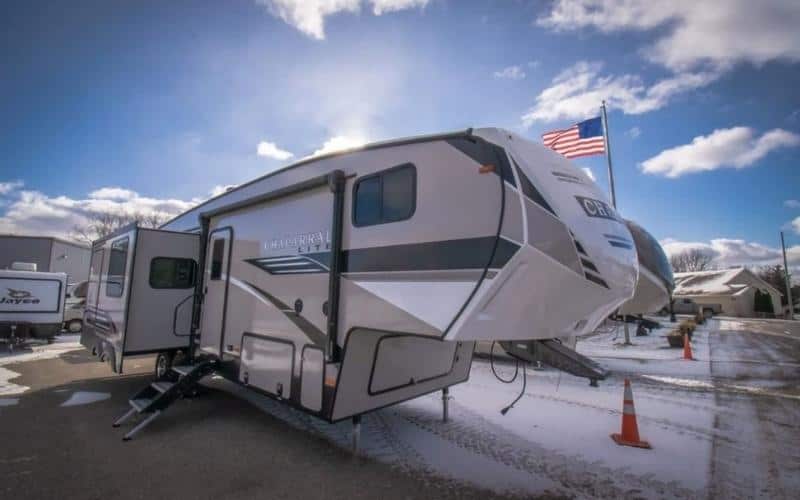
8 Best Place To Sell a Used RV or Camper For Top Dollar

How To Get Mail And Packages On The Road While Living in An RV Full-Time

How To Sell A Camper That you Owe Money on or is NOT Paid Off
Start typing and press Enter to search

RV Weight Explained – Travel Trailers, Motorhomes, and 5th Wheels
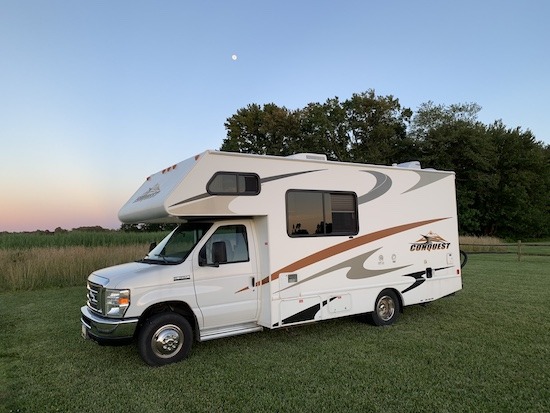
Sharing is caring!
Thanks for your support! If you make a purchase using our links in this article, we may make a commission. And, as an Amazon Associate, I earn from qualifying purchases. See the full disclosure here .
Updated March 25, 2024
How much does my RV weigh? This can be a complicated question depending on what kind of RV you have. The average weight of an RV is about 10,000 pounds. As you load up the RV with your gear, that weight inevitably changes. Typically, the amount of gear brought on board adds up to about 1,500 pounds. Remember to account for this additional gear weight when figuring out the total weight of your RV.
Of course, if you have a large RV, like a motorhome or fifth wheel, your weight is going to be higher than 10,000 pounds, and if you have a small RV, like a travel trailer or pop up camper, your weight will be less. It’s better to assume your RV is going to be on the heavier side of things if you don’t know the exact weight.
What Do All The Weight Numbers Mean?
There are a lot of different numbers when it comes to the weight of an RV. Many companies promote the dry vehicle weight, but what does that mean, and how does that affect what you can carry? Let’s clear up what the different weight listings mean when it comes to your RV weight.
Unloaded or dry vehicle weight is the weight of the trailer with nothing in it. This means no gas, water, waste, or gear. Essentially this is the bare minimum that your RV is ever going to weigh when it rolls off the production line. On average, your RV will weigh 1,500 pounds more than its dry weight once filled with gear.
Gross Vehicle Weight (GVWR) is how much the trailer weights when full. This is the max weight of the RV carrying all of your gear. If you surpass the GVWR, it can affect the performance of the RV and or the towing vehicle. For example, it can increase the required stopping distance quite a bit. And, in some cases, insurance companies will not cover accidents if the RV is over the GVWR. It is never okay for you RV to weigh more than the listed GVWR.
Dry hitch weight , also known as tongue weight, is the weight of the empty rv to the trailer hitch. this is important for determining how much weight your vehicle can tow. the dry hitch weight is only applicable if you have a pop-up camper or travel trailer. remember that your hitch weight will increase as you load up your rv with gear. when pulling a trailer, it is essential not to exceed the weight your vehicle can tow., the cargo carrying capacity (ccc) is the maximum amount of weight you can load onboard your rv. this includes all your gear, water, gas, waste, and you generally, the larger and burlier your rv, the more weight and gear you can carry. if you are concerned about how much you can bring, start with your empty rv and weigh everything as you bring it on. this may seem like a tedious task, but it will help with knowing your weight in the long run., which number is the most important .
The most critical number regarding towing capacity is your vehicle’s Gross Vehicle Weight Rating (GVWR).
GVWR is the maximum weight your vehicle can safely handle, including passengers, cargo, and a trailer’s tongue weight. It considers the strength of your vehicle’s frame, suspension, brakes, and engine.
Exceeding this weight limit puts you at risk of accidents and damage to your vehicle and can void any warranties or insurance coverage.
Knowing your vehicle’s gross combined weight rating (GCWR) is crucial. This is the maximum combined weight of your loaded vehicle and trailer, including all passengers and cargo. Ensuring your vehicle can safely handle the extra weight while towing is important.
To ensure safe and successful RV experiences, fully understanding the numbers and factors associated with towing is important. Before you tow a trailer, always check your vehicle’s GVWR and GCWR.
What Class Does My RV Fall Into?
There are different RV classifications based on length, chassis type, and weight. Certain classes of RVs will be restricted in some areas. Know what class your RV falls into before hitting the road to avoid getting stuck. Consider where you want to be taking your RV and what its primary purpose will be when choosing which class to buy.
Class A RVs are the largest motorhomes with a built-in engine. These RVs have bodies that are 30 to 40 feet long and weight anywhere from 13,000 to 30,000 pounds dry. Typically, class A RVs drive and look more like a bus. Class A RVs are sometimes restricted in national and other parks due to roads being difficult to navigate. Keep in mind where you want to go when selecting a class A RV.
Class b rvs are more of a camper van style. they weigh much less than other rvs at 6,000 to 8,000 pounds, and they are only about 18 feet long. these camper van conversions often have lofted fiberglass roofs to allow passengers to stand up inside. there are typically fewer restrictions for class b rvs since they are not much larger than a work van., class c rvs have bodies built on a truck chassis. the truck chassis is specifically designed to carry the heavy load of an rv. a truck chassis can make the rv feel more normal to drive than a class a. and, the driver and passenger doors are more accessible. therefore getting in and out of a class c rv is much easier, which is something we really like about our class c. we enjoy being able to get in and out of the rv at a moments notice to take pics or video. class c rvs have a dry weight of 10,000 to 12,000 pounds and are 20 to 30 feet long., travel trailers, pop up campers and 5th wheels do not have the weight of an engine and therefore weigh much less than a motorhome rv. a trailer type of rv typically weighs anywhere from around 1,500 to 7,000 pounds dry. travel trailers and pop-ups attach to a standard trailer hitch, and fifth-wheels attach to the bed of a truck. one benefit of the fifth-wheel trailer is you get maximum space for trailer length. if you choose a travel trailer, keep in mind how much weight your vehicle is able to tow and stay below that limit..
RELATED READING: For a fully detailed breakdown of every RV class and style check out our article called What Are RV Classes? – All Types and Styles Explained.
How To Manage Your RV Weight
When it comes to managing your RV weight, you must decide what things you need on your trip, and what you can live without. Do you need to pack for every possible scenario, or are you willing to go with the flow in order to sacrifice some weight? Try and bring only the necessities that will add value to your trip.
It’s hard to judge how much your RV is going to weigh when packing small one- or two-pound items. If you can, stop at a truck weigh station and see what your weight is. This way you’ll know if you have room to bring more along, or if you need to purge some weight.
A good rule of thumb when packing for a trip is after all the essentials are packed, something must come out when you bring an additional item in. This will really force you to think hard about how important each item is that you bring onboard.
For those fortunate to start with a completely empty RV, you can weigh each item or group of items before they go inside. This can be a tedious and time-consuming task, but it will give you a good reference of how much your gear weighs. Knowing the weight of your gear can help you decide what gets to come along and what stays behind.
Remember, under no circumstances can your weight be over the GVWR. Driving overweight can affect how well your RV drives and your insurance coverage. When in doubt, get your RV weighed.
Can You Take Your RV To A CAT Scale?
One common concern among RV owners is whether they can use a CAT scale to weigh their vehicles. The short answer is yes. You can take your RV to a CAT scale for weighing.
Commercial truckers rely on CAT (certified truck scales) scales to ensure their vehicles are correctly loaded and within weight limits.
However, these scales are not exclusive to commercial vehicles and can be used by anyone with an oversized or overweight vehicle, such as an RV.
Why weigh your RV on a CAT scale?
- Safety: Overloading your RV can pose a significant safety risk. Too much weight can affect the vehicle’s handling, braking, and overall stability on the road.
- Legal requirements: Many states have laws regarding the maximum weight a vehicle can carry without special permits or licenses. Ignoring these laws could cause hefty fines or even legal consequences.
- Fuel efficiency: Carrying too much weight can decrease your RV’s fuel efficiency, resulting in more frequent stops at the gas pump and higher fuel costs.
- Maintenance costs: Overloading your RV can strain its engine, transmission, and other components, leading to costly repairs and maintenance fees.
How do you go about weighing your RV on a CAT scale? Here are some quick steps to follow:
1. Find a nearby CAT scale that is certified for public use. CAT scales are found at truck stops, rest areas, and gas stations. Important : Try to go when the scales are not too busy.
2. Ensure you park your RV on the scale with your tires positioned on the scale’s platform.
3. Go inside the truck stop or rest area to pay for the weigh-in. The cost is typically around $10-15.
4. Once paid, return to your RV and write the weight displayed on each axle (front and back).
5. Compare these weights to your RV’s manufacturer specifications or consult a professional to determine if you are within legal limits.
6. If your RV is overloaded, try to remove the unnecessary items as soon as possible.
How Does Weight Affect How Much My Vehicle Can Tow?
Travel trailers and pop up campers.
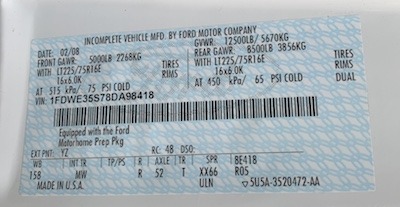
If you are planning to tow a travel trailer or pop-up camper you will need to know how much your vehicle can tow. Most vehicles have a sticker on the inside of the driver-side door that lists the GVWR, which is the maximum that the vehicle can tow.
The GVWR, or Gross Vehicle Weight Rating, is calculated by adding the RV weight plus the passengers’ weight, plus all gear and supplies, plus any liquids. Camping World has an awesome tow weight calculator for every make and model of car and truck.
RELATED READING: If you are considering hauling a Popup Camper check out our article Average Pop Up Camper Weight – All You Need to Know .
Fifth Wheels
If you are planning to tow a 5th wheel the calculation is much more involved. You will need much more info to determine the maximum weight your pick up truck can pull. Luckily, Changingears.com has a terrific 5th Wheel Weight Calculator to help you figure it out.
When you visit their link it will walk you through all of the info you need to input into the calculator to determine the maximum weight fifth wheel your truck can tow.
Class A, B, and C Motorhomes
If you plan to tow a car (or anything else) behind your Class A B or C rig you have a lot to figure out. First of all, how much weight can your RV tow? And second, can your vehicle be towed with all 4 wheels on the ground or do you need a dolly to tow your vehicle? Let’s just tackle how much your RV can tow.

To figure out how much your RV can tow here is what you do:
The first thing you need to know is the GCWR (Gross Combined Weight Rating) of your RV. The GCWR is found on a sticker on your RV like the one to the right that I found on my RV. In my case, the GCWR of my RV is 20,000 lbs.
The next thing you need to do is to figure out how much your RV weighs when fully loaded with passengers, supplies, groceries, camping gear, gas, propane, water, and wastewater. The easiest way to figure this out is to load up your RV and go weigh it. My RV is always loaded with gear and camping supplies so all I need to do is fill the water tank and gas tank to get a good idea of what my RV weighs.
The tricky thing about this is that your RV will always have a different weight depending on the number of people on board plus groceries, water, wastewater, propane, etc. So, if you get your RV fully loaded with just yourself in the RV, remember to add for extra passengers when you will be towing a vehicle.
I get my RV weighed at the county dump about 20 minutes away from my house. They have a huge scale for commercial garbage trucks and they were nice enough to let me drive onto the scale to weigh my RV.
Anyway, after you know how much your fully loaded RV weighs, which in my case is 12,657 lbs then you add the weight of your tow vehicle. This total needs to be less than the GCWR of 20,000 lbs in my case. After adding, if the total pounds exceed the GCWR, you are overweight!
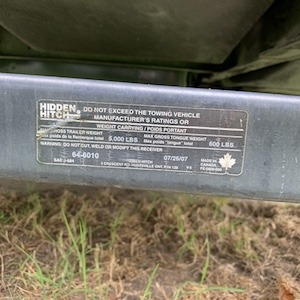
I want to tow my 2015 Toyota Tacoma with my Class C RV. It weighs 5600 lbs. So, 12,657 lbs. plus 5,600 lbs. equals 18,257 lbs. So, it looks like I can tow my pickup truck behind my RV.
There is just one last thing to check and that is the maximum weight my hitch can handle on my RV. Unfortunately for me – the max weight my hitch will handle is 5,000 lbs. So even though the numbers say my RV can tow my truck, the RV hitch can not.
Can You Increase A Vehicle’s Towing Capacity?
Some RVers believe upgrading the suspension and braking systems to handle heavier loads can increase a vehicle’s towing capacity. They may also install a stronger hitch or tow bar. While these additions can help towing, they will not change the manufacturer’s towing limits.
We do not recommend exceeding the towing capacity set by the manufacturer. Doing so can strain your vehicle, potentially causing damage or accidents. It’s essential always to follow the manufacturer’s guidelines and specifications for safe and legal towing.
Weight Factors to Consider When Choosing Your RV
When choosing your RV, you should consider how much it’s going to weigh. For example, some bridges roads have weight restrictions. And many people have ruined their towing vehicle’s engine towing too heavy of a load up a steep incline. Other factors include how much additional weight your RV is going to be able to carry. If you’re going to tow your RV, you should know how much your vehicle can tow safely.
I watched my next door neighbors load their travel trailer full of food, clothing, gizmos, gadgets and all sorts of stuff for hours before leaving for their vacation only to find that their SUV could barely pull their travel trailer up the driveway. They eventually had to buy a much larger, more expensive SUV just to pull their travel trailer when fully loaded.
Depending on where you want to go, some areas have vehicle length and weight restrictions. National Parks are a common place to see these limits. Since may National Parks have steep, winding roads going through them, vehicles are restricted to specified lengths and weights. Here you have two options; you can choose a smaller RV such as a class B or C, or tow your car along.
Watch out for RVs that come with all the bells and whistles. If you’re adding on heavy appliances and features you’ll have less room for weight when it comes time to pack your gear. Ask yourself, do you really need a flat screen TV mounted in your RV bedroom? Or could you save that weight and use it elsewhere. Chances are if you’re adventuring you won’t want to watch TV.
If you’re the type of person who wants to bring a lot of gear with them (think climbing, boating, biking, etc.) look for an RV with a higher cargo-carrying capacity. The greater cargo carrying capacity will sacrifice some of the luxury items, but you’ll be too busy using all the extra gear you brought to worry about that.
Final Words About RV Weights
In short, when in doubt, get your RV weighed. It’s better to know your weight rather than guessing and assuming you’re under the GVWR. Commercial weigh stations at state lines or anywhere that weigh heavy loads can do this for you.
If you do find yourself in a situation where you need to know your RV weight, err on the heavier side when estimating. It’s better to be safe than sorry so you can avoid getting stuck somewhere.
Related Reading:
– 12 Best Travel Trailers with Bunk Beds – 5 Awesome Class C RVs with Bunk Beds – 8 Best Class A RVs With Bunk Beds – 8 Small RV Master Bedrooms with Lots of Space
Mike Scarpignato – Bio
Mike Scarpignato created RVBlogger.com over five years ago in 2018 to share all we have learned about RV camping.
Mike is an avid outdoorsman with decades of experience tent camping and traveling in his 2008 Gulf Stream Conquest Class C RV and 2021 Thor Challenger Class A motorhome.
We attend RV Shows and visit RV dealerships all across the country to tour and review drivable motorhomes and towable trailers to provide the best evaluations of these RVs in our blog articles and YouTube videos.
We are 3/4-time RVers who created RVBlogger.com to provide helpful information about all kinds of RVs and related products, gear, camping memberships, tips, hacks and advice.

4 thoughts on “RV Weight Explained – Travel Trailers, Motorhomes, and 5th Wheels”
Thank you for this information. Learning that there is a sticker inside our vehicle that tells the GVWR was perfect. We kept hearing conflicting opinions about the weight we could pull with our 2014 Toyota Tacoma 4wd. Kathryn
Hi Kathryn, Glad you found the article helpful! Mike
I nearly made the mistake of purchasing a Keystone Cougar half ton with a hitch weight of 1545 lbs. My 2021 Ram 2500HD 6.7 turbo diesel crew cab has a sticker on the pillar of the driver’s side door that reads the max payload is 2,204 lbs including passengers and cargo! My understanding is that the hitch weight plus the passengers (500lbs) plus a full tank of fuel (210lbs) alone would have exceeded this recommendation. That is not even including my cargo yet! I would like to point out that the max payload is more important than the towing (pulling) capacity of my tow vehicle for the safe operation of my truck on the road and for the health of the drivetrain. I even went to the Ram website and plugged in my VIN and it returned the same number for my max payload (2,204.36 lbs). Any thoughts including evidence to the contrary is welcome, please.
Great Comment Jon. This is very important to know when towing a trailer or 5th wheel. Thanks! Mike
Leave a Comment Cancel reply
Save my name, email, and website in this browser for the next time I comment.
- TRIP PLANNING
- Campground Reviews
- Product Reviews
- RV SAFETY & MAINTENANCE
- Newbies, Get Started Here
- Tips & Tricks
- Camping Memberships
- Destination
- RV TRAVEL AGENT

Vantrue X4 Dashcam Review

Clearsource RV Water Filter Review

Clever Cover for your Tongue Jack

Beddy’s: Easy Bedding for your RV

Weighing Your RV at a Truck Stop

Is Your Child In The Right Car Seat?

What Can I Tow?

How and Why to Monitor Tire Pressure

Roadside Tire Change – being prepared

Building a solar rack to maximize solar on your RV

Inverters – when you don’t have shore or generator power

DIY Power Awning Support Poles

Vinyl Fence Posts for Sewer Hose Storage

Remodeled Toy Hauler Garage as Kids’ Bedroom

Myth: 55+ RV parks must allow people under the age of…

Flat Towing Behind a Motorhome

RV Batteries on Steroids – DIY lithium

Thousand Trails Info Center

A first look at the new Thousand Trails Escape membership

Where are Thousand Trails and Trails Collection Parks?

Albuquerque International Balloon Fiesta
- Learning & Resources
- RV Safety & Maintenance
How to Weigh a Travel Trailer

I’m rather enjoying these “how to” types of write-ups. I need to do more writing about my actual camping experiences, but I’ll get there eventually. As I’ve written before, I’m a huge advocate of getting your rig weighed for peace of mind knowing that you’re within ratings and for a fantastic educational experience.
Here’s the actual process that you should go through with getting weighed when pulling a travel trailer. I don’t get into digesting the numbers, but there are plenty of forums where you can post, “Hey I weighed, and this is what I got” that will help you out.
Assuming that you’re doing it at a CAT scale that has 3 scales that you pull onto:

- Weighing Truck and Travel Trailer with weight distributing hitch (WDH) hooked up; you want your truck’s front tires (aka steer axle) on the first pad; truck’s rear tires (aka drive axle) on the second pad; all trailer axles on third pad (see the graphic above)
- Weighing Truck and Travel Trailer without weight distributing hitch hooked up; put the WDH bars into the bed of the truck
- Weighing Truck Only; park the travel trailer in a truck parking spot, put the WDH bars with the travel trailer (locked inside) and come back around to just weigh the truck
You’ll want to pull off of the scale between weightings #1 and #2 to remove the WDH bars and whatnot. It’ll keep you from holding up the line and confusing the scale master.
Important Notes for Weighing
Throughout all 3 weighs, nothing should change – no moving of passengers, no one goes to the bathroom, etc. Do them all at once (not before and after a trip, for instance).
As well to get as realistic numbers as possible, you want to be packed like you were ready to go camping on your average trip (weekend, week, month – whatever is normal for you). If you don’t have all of your passengers, you’ll have to add their weight when you evaluate your results.
Other Scales
Now, if you’re using a different scale (quarry, dump, etc.), they likely only have a single scale that you pull onto. You essentially want all of the same weights of each axle, so you’ll just have to move the truck more often to get individual weights (pull up with just the front tires, then the front and rear tires, then front, rear and trailer tires). And, it’ll require more math to figure out each axle’s weight.
A Tip for Cat Scales
If you’re going to a CAT scale, it can be a challenge to reach the call button. I found I had to stretch, but I could reach it (just not hear real well). Many people are taking a short 3′ stick of some sort to push it *or* going inside ahead of time to get the phone number of the weigh desk and calling that instead of using the button.
What is the Cost?
My CAT scale weightings costed me $10 for the first weigh and then $1 or $2 for each re-weigh. I’m not sure what the other kinds of scales cost – my guess is free to about the same.
RELATED ARTICLES MORE FROM AUTHOR

Escapees SmartWeight – getting individual wheel weights

How to Weigh a Fifth Wheel Camper (on a single scale)

What Can I Tow Calculators
Towing pin/tongue weight calculator, 20 comments.
You fail to mention the normally observed axle to axle variation or the side to side variation seen on almost all RV applications. While this variation may be as little as 50 Lbs it is not unusual for this unbalance to be enough to push a tine into the next level of minimum inflation. In some extreme cases the imbalance has been as much as 500 to 1,000 lbs.
I would like to ask if you know where a person can purchase the mobile weigh scales that slide under each trailer wheel. We live in Lethbridge, Alberta Canada and all we have are platform weigh scales and this would only give me the total weight of the trailer but not the individual weight on each tire. Our trailer is a Jayco 19RD with tandem axles. Please send me an email address or company name who makes the portable weigh scales. Thanks
No idea, but I believe they’re not cheap- something in the order of thousands of dollars for a set.
I took my travel trailer to the CAT scales and followed your instructions. Now how do I figure actual tongue, axle and total weight.
Randy, you can use my other site – towingplanner.com that has a calculator that will calculate it all out for you.
http://www.towingplanner.com/ActualWeights/TravelTrailerCatScales
I did not know how to calculate tongue weight. Thanks.
I did know how to calculate tongue weight. Thanks
I live in illinois and i just started RVing this summer. My trailer is pretty set on things added and would like to weigh it to see where i am…could you help me with info on where i could take it to be weighed? I live in Naperville Ill. Thanks!
Sure! It looks like there is a truck stop called Greater Chicago I-55 that has a scale. Here it is on a map .
What is the weight actually used for?
When weighing just the truck (3rd step), do you leave the weight distribution hitch on the truck or put it and the bars in the trailer?
Doesn’t entirely matter. I usually say to throw them into the truck bed.
I have the same question, but not sure I understood your response. On the third step when you are weighing only the truck you say to leave the WDH bars with the trailer. Should we remove the hitch from the receiver on the truck and leave that with the bars in the trailer?
Thank you for putting together such great resources!
I see, I must have skimmed the last comment and read the question wrong. I would leave the WDH on the truck because you don’t want it’s weight added to the trailer’s tongue weight.
Thank you very much! I have a follow up question if you don’t mind.
Due to conditions when I visited the CAT scale, I wasn’t able to fill up the tank or weigh the truck by itself. At the time, I had 3/4 in my 36 gallon tank – so short about 54 lbs of fuel.
Assuming I weigh the truck by itself at a later date (with identical passengers, cargo, and fuel level), are there any other considerations I need to take into account aside from being aware of the missing weight when calculating payload?
I think that’s all you need to think about. I greatly prefer to do the weights together (especially as it’s cheaper because re-weighs within 24 hours at the same scale are only $2-3). But if you can try to keep everything consistent, the math should work out and you can run the numbers through TowingPlanner.com.
I didn’t realise that a re-weigh would let you weigh a different configuration so that’s good to know. I purchased a tongue weight scale from etrailer.com, it wasn’t cheap but I can measure the tongue weight quickly and accurately without leaving my drivewayand towing my trailer 80 mile round trip to a CAT scale just for that. I’ll pull into the CAT scale on my way to the campground. I’ve put the tongue weight scale on a local ‘for sale/rent’ website so I plan to rent it out to try to recover some of the $$$. I’m in Ontario, Canada so sorry I can’t bring it to the US! Thanks for the info.
A tongue scale is well worth the investment provided you have an idea of about how heavy the trailer is overall.
Great calculator. My question is that my result for the tongue weight percentage is 17.3% (1560 lbs tongue weight) and is based on the no weight distribution numbers. I calculate the percentage at 14.8% (1340 lbs.) using the with-weight distribution numbers. I had previously upgraded my receiver hitch and WDH to 2000 from 1500 so I’m covered either way on my upgrade.
My question is in determining capacities of the towing equipment. Is the without WD tongue weight the one to use or the with WD tongue the one for selecting equipment capacities?
Without WD tongue weight. The WDH doesn’t reduce the tongue weight, it just moves it around.
LEAVE A REPLY Cancel reply
Save my name, email, and website in this browser for the next time I comment.
This site uses Akismet to reduce spam. Learn how your comment data is processed .
Stay Connected
Latest articles.

- RV Trip Planning
- TERMS OF USE


Average Travel Trailer Weight (With 35 Examples)
Before you buy a travel trailer, knowing the weight is incredibly important. This vital statistic will determine how suitable the travel trailer is for your car, truck, or other vehicle. It helps you understand if the trailer is fit for purpose, so you might assume finding the weight is a simple task.

Although the manufacturer will generally reference the weight of the travel trailer, this isn’t quite the full story.
There are a few other details and ratings that have to be considered before you make a choice. Factor in the weight of everything you add to the trailer, and determining how suitable your trailer is for your car becomes much more complicated.
Considering weight, length, age, and all the additional factors can give you a fairly accurate weight for your travel trailer. Use this guide to find out everything you need to know about the average weight of the travel trailer.
What’s The Average Weight Of A Travel Trailer?
The average weight of a small travel trailer is 3500 lbs , and the average weight of a large travel trailer is 6300 lbs . However, this is just the average, so there are travel trailers that weigh significantly more or less than that.
A travel trailer might weigh anywhere between 1000 lbs, and 9000 lbs . Some even up to 10,000 lbs .
The length is an incredibly significant factor in determining the weight of a travel trailer, and there’s plenty of variety to be found here.
The average travel trailer is around 25 feet in length , 10 feet high , and 7 to 8 feet wide .
All these measurements are important when considering the weight of a travel trailer, but it’s the length that has the most variety. The length of a travel trailer can vary from 10 feet to 38 feet. Most trailers are 20 to 30 feet.
Height can also vary, although there isn’t the same amount of choice. Width changes very little, as the trailer has to be safe for road usage.
The weight of the travel trailer is hugely dependent on the length. So, you might assume that knowing the length means you understand the weight. However, it isn’t quite that simple. There are other factors that contribute to the overall weight of the travel trailer.
At this point, you might be wondering why it’s so important to understand the weight of your travel trailer.
A travel trailer needs to be pulled by another vehicle, so that vehicle needs to have the correct towing limit. A travel trailer that’s too heavy for the vehicle can’t be safely towed. A car will have a limit that cannot be exceeded.
When you know the rough weight of the travel trailer, you can see if it’s suitable for your vehicle, and if you have a good enough hitch.
Weight also affects the driver’s license requirements. Depending on the state, a larger travel trailer may require a different license to drive legally.
Understanding the dry weight of the trailer itself isn’t the only thing you need to know. When we take our trailers out, we need to pack them with everything necessary for the trip. This adds to the overall weight of the travel trailer.
Finding the total weight of your travel trailer means finding the dry weight, and the weight it can handle. Below, we’ll go into detail about the terms and acronyms used when describing the different weights of the trailer.
The first thing you need to know is what factors affect the weight of the travel trailer.
How Length And Age Affect The Weight Of A Travel Trailer
The length of the travel trailer is directly related to how much the trailer weighs. A longer trailer will weigh more than a shorter trailer, with the weight increasing with every inch of length added.
If you’re trying to find a lighter travel trailer, you should start by looking at the shorter models. Without the added feet of length, these trailers have less weighing them down. Smaller trailers can’t carry as much, either, which means a smaller trailer will still weigh less when fully loaded.
Some examples;
- An 18-foot travel trailer will have an average weight of 2000 lbs .
- The average weight of a 25 ft. travel trailer is around 5000 lbs.
- A 35-foot travel trailer will have an average weight of 7500 lbs.
Height can also affect the weight of a travel trailer, but there’s less variety in size. A trailer will only be between roughly 8 and 12 feet in height. So, while a taller trailer does increase the weight, it isn’t as noticeable a difference.
Furthermore, a longer trailer has more room for additional weights such as appliances and furniture. Extra height doesn’t have the same effect.
A shorter trailer will have less weight on average than a longer trailer. But there’s more to it than simply finding the length. The age of the trailer can have a surprising effect.
Older trailers tend to be heavier, because the construction techniques and materials are less refined. As technology improves, sturdy trailers are built using lighter materials. So, if you’re buying a travel trailer second hand, you should consider the age as well as the length.
The furniture of an older trailer often contributes to the weight. If you have a second hand trailer, then bulky furnishings, including doors and windows, may be adding excessive weight. Even a small trailer can weigh a lot when filled with heavy materials.
Something else to consider is if the travel trailer has a slide out. A slide out provides the trailer with a larger living space, but it also adds a significant amount to the overall weight. A short trailer with a slide out may end up weighing as much as a longer trailer without a slide out.
A slide out can potentially add as much as 800 lbs to the weight of a trailer. However, the slide out might still be a low weight alternative to increasing space. It’s a tricky balancing act between space, length, and weight.
While length is an important consideration, it’s also important that you don’t see it as the only thing that matters. Otherwise, you might be surprised when your small trailer ends up heavier than you assumed.
Understanding The Weight Of Your Travel Trailer (Acronyms And Terminology)
Before you begin finding the weight of your travel trailer, you need to understand the terminology used. Otherwise, you might misinterpret what weight the manufacturer has provided.
The weight the manufacturer provides generally refers to the unloaded weight. This is the weight of the trailer itself, without anything on.
However, the weight will change as you start to pack up your travel trailer. By the time you’re ready to hit the road, your trailer might be a completely different weight, and no longer suitable for your vehicle and hitch.
This might mean you need to do some math to determine the total weight of your travel trailer.
First is the Unloaded Vehicle Weight, or the UVW. This is sometimes known as the dry weight. The UVW refers to the weight of the travel trailer when it’s empty of everything, including water tanks and propane tanks.
The UVW is often what’s provided by the manufacturer, but it doesn’t quite tell the full story. By the time the travel trailer is fully loaded, it might have gained an extra 1500 lbs, on top of the dry weight.
There’s also the dry hitch weight. This refers to the weight of the trailer that rests on the hitch, which is typically around 10 to 20 percent of the total weight. The rest of the weight will be balanced on the wheels and axle.
Next is the Gross Vehicle Weight Rating, or the GVWR. This is the maximum weight that the travel trailer can be when fully loaded. This number includes the passengers and driver, as well as fuel and water, and anything else you bring with you.
The CCC, or Cargo Carrying Capacity, is the total weight available for equipment, accessories, cargo, and passengers. To find the CCC, take away the UVW from the GVWR .
Another acronym to be aware of is GCWR, which stands for Gross Combined Weight Rating. This refers to the maximum weight of the trailer and the towing vehicle combined.
Finally, there’s the Sleep Capacity Weight Rating, or the SCWR. A simple acronym, this refers to how many people are allowed to sleep on the travel trailer. Travel trailers generally have room for 2 or 3 sleepers. The SCWR will assign an assumed weight for each passenger, and calculate from there.
As you can see, the unloaded and loaded weights of the travel trailer are quite different. Knowing them both will give you an accurate idea of the weight that your car will be towing, so you can determine what’s suitable.
Now that you understand what you’re looking for, we can give you some examples of the average weight of different travel trailers.

Small Travel Trailer Weight (With Examples)
To help better understand the correlation of weight and length in a trailer, it’s useful to see some examples. This allows you to easily comprehend how the length interacts with weight, and how it isn’t quite as simple you might first assume.
For small travel trailers, we’ve rounded up some popular brands that sell trailers that are 25’ long or less. We’ve put them in weight order, so you can see how the length and weight isn’t always a direct correlation.
- Coachmen Clipper 9.0TD. Length: 14’2”. UVW: 1,418 lbs.
- Aliner Ascape Plus. Length: 13’. UVW: 1630 lbs.
- Forest River Flagstaff E-Pro E12SRK. Length: 12’3”. UVW: 1,763 lbs.
- Coachmen Clipper 12.0TD MAX. Length: 17’5”. UVW: 2,225 lbs.
- Forest River Flagstaff E-Pro E15TB. Length: 16’4”. UVW: 2,667 lbs.
- KZ Sportsmen Classic 180BH. Length: 21’5”. UVW: 2,690 lbs.
- Forest River R-Pod RP-171. Length: 19’. UVW: 2,714 lbs.
- Jayco Hummingbird 16MRB. Length: 19’10”. UVW: 2,890 lbs.
- KZ Sportsmen Classic 160QB. Length: 22’. UVW: 2,900 lbs.
- Forest River Flagstaff E-Pro E16BH. Length: 19’. UVW: 3,280 lbs.
- KZ Sportsmen Classic 180RBT. Length: 21’9”. UVW: 3,370 lbs.
- Forest River R-Pod RP-192. Length: 22’2”. UVW: 3,379 lbs.
- Coachmen Apex Nano 185BH. Length: 20’ 7”. UVW: 3,406 lbs.
- Forest River Flagstaff E-Pro E20FBS. Length: 21’8”. UVW: 3,442 lbs.
- Coachmen Apex Nano 194BHS. Length: 22’8”. UVW: 3,634 lbs.
- Forest River R-Pod RP-193. Length: 22’11”. UVW: 3,654 lbs.
- Airstream Flying Cloud 23FB. Length: 23’9”. UVW: 4,000 lbs.
- Coachmen Apex Nano 208BHS. Length: 25’. UVW: 4,260 lbs.
- Forest River R-Pod RP-202. Length: 25’. UVW: 4,574 lbs.
As you can see, length does play a significant role in the weight of a travel trailer. But you can also see that length clearly isn’t the only factor. Some longer trailers, such as the KZ Sportsmen Classic 180BH, weigh less than shorter travel trailers.
Part of this might be caused by the build of the trailer, and the materials used in construction. Clever building techniques and lightweight materials allow larger trailers to be built at a lower weight.
So, you must consider the brand, and the build, when deciding on the length of your travel trailer.
Large Travel Trailer Weight (With Examples)
From looking at the specs of small travel trailers, we could see a close connection between length and weight. For larger travel trailers, the length and weight is even more important. Larger trailers aren’t suitable for all vehicles, and some may even require a different driver’s license.
To see just how large a travel trailer can be, this list covers the weight and length of some of the biggest options available.
All these trailers are over 25’ long, and some are close to 40’. A larger travel trailer is able to sleep multiple people, and will have plenty of room for storage. When considering a larger trailer, it’s necessary to consider the GCWR, as well as the UVW.
- Prime Time Avenger 21RBS. Length: 27’7”. UVW: 5,209 lbs.
- Airstream Flying Cloud 25FB. Length: 25’11”. UVW: 5,600 lbs.
- Prime Time Avenger 25FSLE. Length: 29’7”. UVW: 5,673 lbs.
- Cruiser Radiance R-25BH. Length: 29’11”. UVW: 5,727 lbs.
- Airstream Flying Cloud 28RB. Length: 28’. UVW: 6,100 lbs.
- Jayco Jay Flight 28BHBE. Length: 33’7”. UVW: 6,640 lbs.
- Jayco Jay Bird 29RKS. Length: 33’11”. Weight: 6,750 lbs.
- Forest River Flagstaff Super Lite 26FKBS. Length: 29’8”. UVW: 6,838 lbs.
- Prime Time Tracer 28RES. Length: 32’11”. UVW: 6,866 lbs.
- Cruiser Radiance R-30DS. Length: 35’5”. UVW: 7,160 lbs.
- Forest River Flagstaff Super Lite 27BHWS. Length: 32’10”. UVW: 7,310 lbs.
- Forest River Flagstaff Super Lite 29BHS. Length: 35’5”. UVW: 7,605 lbs.
- Jayco Jay Flight 31MLS. Length: 35’7”. UVW: 7,975 lbs.
- Forest River Flagstaff Super Lite 27FBIK. Length: 33’1”. UVW: 8,324 lbs.
- Jayco Jay Flight 33RBTS. Length: 37’10”. UVW: 8,750 lbs.
- Prime Time RV Lacrosse 3411RK. Length: 38’10”. UVW: 8,963 lbs.
Again, the length of the trailer plays a huge role in determining the weight. But, as with the smaller trailers, it isn’t the only factor.
Build, size, and materials can all affect the weight of the travel trailer. Another factor that needs to be considered is the floor plan. It might be surprising, but the layout of a travel trailer can affect the weight distribution.
A travel trailer under 10,000 lbs is unlikely to require a separate license to tow. However, in some states, to tow a large and heavy travel trailer may need to apply for a Class B Non-Commercial license.
What Else Adds Weight To A Travel Trailer?
We can clearly see that for the average travel trailer, length and weight are closely connected. However, we can also see that it isn’t the only factor. Sometimes, a smaller trailer can be heavier, and some longer options can be surprisingly light.
Once you’ve purchased your trailer, you probably want to get out onto the road fairly quickly. No one wants a travel trailer just to sit in the garage . So, you pack up, hitch the trailer to your car, and get ready to go. Only to discover that you can’t tow the trailer.
This might be because you’ve been thinking about the UVW, and not the GVWR. That means you’ve only considered the unloaded weight, and you’ve forgotten the load.
The UVW is the weight the manufacturer often provides, and it doesn’t include all the added cargo. If you’ve bought a larger trailer because your vehicle can tow the UVW, it might struggle with the larger GVWR.
So, here are the items of cargo that tend to add the most weight to the travel trailer:
- The generator. Every travel trailer needs a generator, and choosing the right size isn’t easy. Too small, and it can’t provide the level of power you require. Too large, and it weighs the trailer down. A handheld portable generator can be fantastic, but even these end up adding a significant amount of weight to the trailer. Before purchasing your generator, consider exactly what it needs to be used for, and what size you can get away with.
- Water. It’s easy to forget about the water weight, because it’s so vital. However, it’s important to factor this in when considering the total weight of your travel trailer. Once the water tank has been filled , the weight of the trailer will increase significantly. And while you can cut down on appliances and comforts, the trailer needs water.
- Fuel. Dry weight, or the UVW, doesn’t include the weight of a full fuel tank. Again, this is an added weight, but a necessary one.
- Appliances. One of the great things about travel trailers is that they can feel like a home away from home. But every time you add a home comfort to your travel trailer, you increase the weight. With some items, this weight may not make much of a difference, but it can quickly start to add up. Plus, the more electricals you take, the larger a generator you’ll require.
- Repair kits/hoses/first aid kit/etc. Basically, all the essentials. There are some things you need to take in your travel trailer, to ensure smooth running. Sometimes, these things are so necessary, we forget that they add weight.
There are many things that add weight to the travel trailer, and a lot of them are fairly essential. But with some careful packing, you can easily reduce the load.
Correctly Distributing Weight In A Travel Trailer
Sometimes, you can easily spot that a travel trailer has been loaded incorrectly.
There will be an obvious lean, or tilt, and you can easily see where the weight has built up. Other times, it isn’t quite so simple. Instead, you’ll only notice that the weight is off center when you start to drive.
Uneven weight distribution can seriously impact the safety of your trip. The towing hitch and the trailer can both be affected by incorrect loading. Before you start packing up your travel trailer, you need to know how to distribute the weight.
When the trailer is manufactured, it’s built in a way that correctly distributes the weight for towing.
First, you need to place the heaviest cargo at the front of the trailer. It should be ahead of the axle, and evenly distributed from left to right.
Start with the heavy cargo first, so you can secure everything in place. The cargo shouldn’t shift as you drive, as this ruins all the work you did finding an even distribution. It can also cause damage to the cargo, and the trailer.
As a general rule, 60% of the weight should be in front of the trailer’s axle.
In many cases, the travel trailer will come with a guide from the manufacturer explaining the best way to load. Read this to understand the best weight distribution for your specific brand of trailer.
An incorrect weight distribution will generally be noticeable as you tow the vehicle. The more you use the trailer, the better you should understand how to load correctly.
A fully loaded travel trailer should never weigh more than the Gross Vehicle Weight Rating. If you exceed this weight limit, you may cause damage to the hitch, the towing car, or the trailer itself.
Even correctly distributed weight can’t make up for a trailer that’s too heavy for the tow.
Once you’ve got everything loaded, you can weigh your trailer to check that it’s within the correct specifications. Weigh with and without the car, to understand where the weight is.

How To Make Your Travel Trailer Lighter
When you first weigh your travel trailer, it can be a surprise to discover just how heavy it is when fully loaded.
All the small and light things you pack are heavy when put together, until you’re adding a significant amount of weight to your trailer.
Many of us have been over enthusiastic with our first load, and ended up overpassing the Gross Vehicle Weight Rating by some amount.
Don’t worry, it happens. You just have to learn a few tricks for cutting down the excess. Here are some easy ways to make your travel trailer lighter.
- Begin by weighing the trailer both with and without the car. This helps you understand exactly where the weight is coming from. Don’t waste time taking everything off the travel trailer, when the real problem is a packed car.
- Make sure you know your limits. Stay aware of the GVWR as you pack, so you don’t go over.
- Budget for the essentials. There are some things that are necessary, including water and fuel. These have to be the priority, so make them your first consideration.
- Get rid of anything you haven’t been using. It’s tempting to pack everything you possibly can, but those little appliances can have a big effect. Take away anything that isn’t being used, any extras that you can easily live without, and all the things you forgot were in there in the first palace.
- Replace heavy furniture with lighter alternatives. Built-in furniture can often be surprisingly heavy. Take it out, and add new, lightweight replacements. This is true for doors as well, which can generally be replaced with curtains. Also, drawers and cabinets can sometimes be switched with lighter materials.
- Don’t forget the outside. Are you towing around a bike rack but no bike? There are frequently things on the outside of the trailer that don’t get used, and end up completely forgotten. Take them off, and you can reduce the weight significantly.
- Use aluminum for repairs. Aluminum is fantastic for repairs on a travel trailer because it’s strong but light. Learn to work with this material, and you may not reduce the weight of the trailer, but you’ll ensure you aren’t adding more.
- Write a checklist of what you need. Don’t overload just because you’ve forgotten what you already have. Write a checklist and stick to it. At the end of your trip, look back through the list. Were there items you didn’t need? Can they be left behind next time?
- Calculate the watts you actually use, and buy a smaller generator. Or, try and install solar panels. They can provide the bulk of the power, while a reduced size generator does the rest.
The more you use your travel trailer, the better you’ll understand what items are necessities, and what will be left behind. The travel trailer is a great way to lead a simplified life, so you don’t need to pack it full of gadgets to have a good time.
How Does The Weight Of A Travel Trailer Compare To Other RVs?
The standard travel trailer is a wonderful choice for touring and exploring. If you prefer a lighter option , the pop-up travel trailer, or the teardrop travel trailer both weigh significantly less on average. A small pop-up trailer could weigh as little as 600 lbs.
The larger travel trailer is the fifth wheel travel trailer. Some of these can weigh upwards of 10,000 lbs, and will require a separate license to drive.
If you’re choosing between a motorhome and a travel trailer, you may be interested in the weight difference.
The largest motorhomes are Class A motorhomes. These have a length between 21 feet and 45 feet. The average Class A motorhome is 33 feet long. The weight range is between 16,000 and 30,000 lbs. A Class A motorhome is almost a house on wheels.
A Class C motorhome is smaller than a Class A, and also lighter. Class C motorhomes tend to weigh between 12,000 and 20,000 lbs, and are 28 feet long on average. With a separate bathroom area, these are a comfortable size.
The Class B motorhome is the smallest of them all. These are generally the size of a van, and will weigh between 4,000 and 14,000 lbs. Although they may not have the luxury of space you can expect to find in a Class A or C motorhome, they’re an economical choice for short trips.
Final Thoughts On The Average Travel Trailer Weight
Knowing the weight of your travel trailer when it’s loaded and unloaded is incredibly important. It ensures you’re safe on the road, and can even affect the type of license you need.
Before buying a trailer, you should understand the unloaded weight, the total weight allowance, and what that means for your towing vehicle.
Keeping the weight of your travel trailer low makes it easier to maneuver, and more efficient to run. Although a travel trailer is generally lighter than an RV, or other types of motorhome, it’s still a heavy item.
Length and weight of the travel trailer are closely linked. A shorter trailer will generally weigh less than a longer trailer. On average, a travel trailer will weigh between 2000 lbs and 8000 lbs, depending on the size and build.
Understand the weight and allowances of your travel trailer. Then you can enjoy the experience, without the worry of a heavy trailer.
- Recent Posts
- Best Alternate Routes To Avoid Chattanooga - March 2, 2023
- Best Alternate Routes To Avoid The Grapevine - March 2, 2023
- Alternate Routes To Avoid George Washington Bridge - February 21, 2023
Related Posts:

Terms and Conditions - Privacy Policy
- Skip to main content
- Skip to secondary menu
- Skip to primary sidebar
- Skip to footer

Jeffsetter Travel
Travel Consultants and Travel Tips
How To Weigh Your Travel Trailer At Home
January 20, 2021 by Charlotte Phillips
Last updated on June 23rd, 2023 at 09:09 am
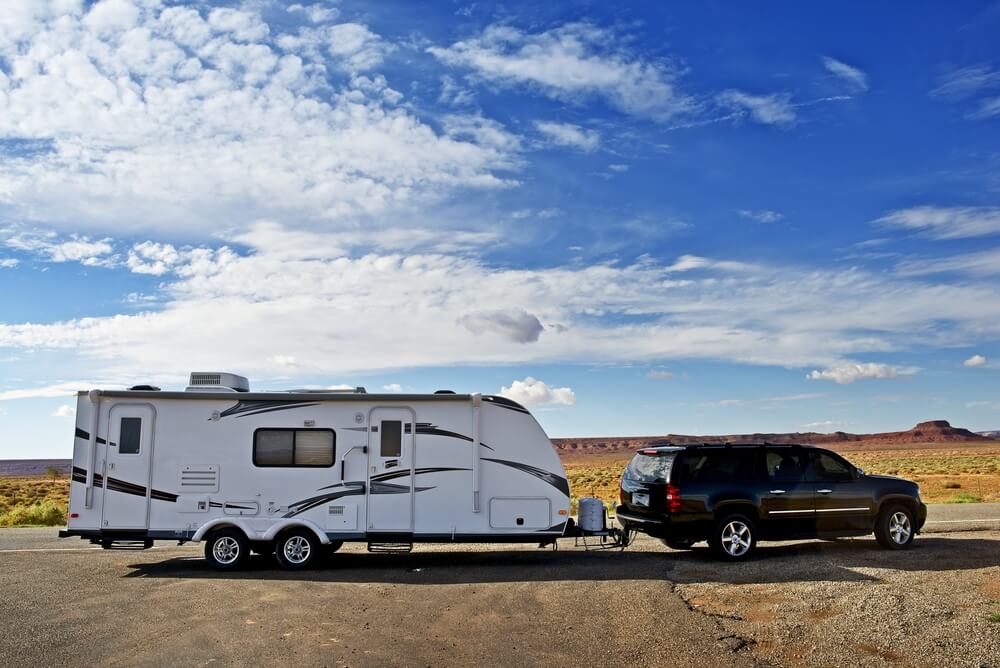
All of our reviews are based on exhaustive research, industry experience, and whenever possible, hands-on testing. When you make a purchase using one of our chosen links we’ll receive a small percentage of the proceeds. This supports the site and keeps Jeffsetter running. You can read more here .
You just bought a new rig and are confident about your vehicle’s ability to tow it. Hopefully, you already know your travel trailer’s dry weight from the manufacturer, but this gets you thinking: what does my trailer weigh after I’ve filled it up with personal belongings and supplies?
Whether you’re brand new to towing or have owned many travel trailers in your life, knowing the weight of your trailer at various stages of use is important, both for purchasing a hitch and for the life of your vehicle.
The last thing you want to do is purchase a travel trailer your vehicle can’t handle! But how can you possibly determine the weight of it, especially if you have no RV dealer nearby? It’s important to weigh your trailer before a long trip, but can this be done from the comfort of your own driveway?
You can use the bathroom scale technique, and while an average bathroom scale can’t measure the entire weight of your trailer tongue you can take your initial reading and multiply it by three. You can also use tongue weight scales that are designed to measure tongue weight, or a device called BetterWeigh mobile towing scale.
As you can see, you can weigh your travel trailer at home using a variety of options ! Let’s take a look at some of these as well as why knowing your trailer weight is essential when owning an RV.
Understanding Your Trailer’s Various Weights
If you’re new to the RV world , you may be feeling a bit confused about trailer weight. Going to an RV dealership without knowing how much your vehicle can tow can spell disaster if you end up bringing a travel trailer home. If it’s too heavy for your vehicle, you may cause irreparable harm!
Thankfully these weights and numbers are fairly easy to understand, and manufacturers always include a starting weight of any travel trailer they make, so you won’t be entirely in the dark about how much your trailer weighs.
Here are some of the terms you should know when it comes to weighing your RV, and what it means for you when it comes to weighing at home!
Gross Vehicle Weight Rating (GVWR)
This is the maximum allowable weight of a fully-loaded trailer, including liquids, passengers, cargo, and the tongue weight of any towed vehicle (most travel trailers can’t tow an additional vehicle). This is the weight you will want to know before departing on your first camping trip with your new travel trailer ! It is the most a trailer can weigh in total, as determined by the trailer manufacturer.
Gross Combined Weight Rating (GCWR)
GCWR is the maximum weight of your vehicle with a trailer attached, as determined by the vehicle manufacturer. This means the weight of both the tow vehicle and the trailer together. It also includes any cargo or load placed in either vehicle.
Dry Weight or Unloaded Vehicle Weight (UVW)
UVW means the weight of an RV as built at the factory, by the manufacturer. It does not include the weight of the cargo, freshwater, propane gas, occupants, etc. It is the weight of the trailer with nothing extra in it, and is the weight you should know when shopping for a new travel trailer!
Tongue Weight or Hitch Weight (HW)
Also known as tongue weight, HW is the amount of weight of the trailer that is carried on the hitch. You will need to know this weight when shopping for a proper hitch. Hitches are rated both by their towing capacity and their tongue weight, but we will touch more on this later.
Gross Axle Weight Rating (GAWR)
GAWR is the maximum allowable weight each axle assembly is designed to carry. This is important to know because it’s possible to be under the GVWR and still exceed an axle rating, depending on how you load the RV with your personal cargo.
This is a lot of information to digest, but once you get more familiar with travel trailers and what it all means, the various weights of your trailer will make a lot more sense! You will come to understand why it is necessary to know these weights and the importance of staying within certain ranges depending on your tow vehicle.
Why Does Travel Trailer Weight Matter?
When it comes to towing a travel trailer, why might the weight of your rig matter? Besides what has already been discussed, such as wear and tear on your tow vehicle, there are other important factors when it comes to the weight of your travel trailer.
Improved Longevity
Keeping the weight of your travel trailer down near the lower end of your tow vehicle’s towing capacity will ensure a long life for it, especially if you’re planning to tow over many mountain passes or other strenuous drives. It’s important not to overload your car or truck, and keep the ambient temperature outside in mind when towing, as too hot temperatures can overheat your engine.
Function Of Axles, Frame, And Suspension
The weight inside your trailer matters for the overall health of your axles, frame, and suspension. If you fill your travel trailer with heavy objects, even if your tow vehicle can handle it, it might not be the best idea for the life of your trailer, and it may not be level either .
Toy haulers are a good type of travel trailer to look at if you plan on hauling a lot of heavy equipment or additional recreational vehicles. They are built to handle such weight, but even toy haulers have their limits. It’s important not to overload your trailer’s frame, as it can bend and warp from continued improper weighting.
Improper weighting inside your rig matters when you tow as well, and each axle has its own preferred amount of weight per axle. So arranging items inside your trailer matters too! If you leave too many things toward the front of your trailer, you may find it more difficult to tow, as well as putting too much weight on one axle instead of both axles.
Safer Towing
The most important thing to consider when it comes to weight and your RV is when it’s time to tow. The weight of your travel trailer affects what level of hitch you buy as well as how difficult your rig might be to control on the road. A heavier trailer may prove trickier to control on large freeways and other roads, so keep this in mind before you set off on your next adventure!
How Much Do Things Weigh, Anyway?
It’s time to hit the road, but you’re worried about what your rig will weigh once you fill it up with supplies- and rightly so! When you think about an empty trailer versus a full one, the weight can shift drastically; most RVers budget at least 1,000 pounds going into their trailer, depending on the size of it!
There’s no exact measurement for every little thing you’re putting into your trailer unless you choose to track it yourself. This can sound exhausting, and the hope is that you’re not putting in too many things so that you’ll never be close to your maximum weight. However, here are some helpful numbers and items to keep in mind should you need to know the weight of what you’re putting into your RV!
- Water : 8.3 pounds per gallon
- Propane : 6 pounds per gallon
- Food : Listed on the boxes and cans, more often than not. A quick tally should work well for you, but always budget 5-10% more weight, just in case.
- Clothes : This is the toughest one to judge, and you can find out specifically from your clothing manufacturer’s websites or clothing listings, but this may be too tedious. However, an average suitcase’s worth of clothes can weigh 50 pounds, so keep this in mind when calculating your clothes
Don’t forget your kitchen appliances and dishes, any tools or toys, and always budget 5-10% more weight than your final calculations. Hopefully, you won’t ever have a problem with too much stuff!
The time has come to weigh your new travel trailer, but you’re not ready to hitch up and tow it to a professional weigh station. The good news is, you can weigh your travel trailer at home! I know what you’re thinking: do I have to buy yet another RV accessory? My answer for you is: it may save you an awful lot of headaches if you choose to.
But the good news is you can weigh your travel trailer with a bathroom scale should you be out of any other options! This is only recommended for smaller travel trailers , but it will work in a pinch if you’re willing to set it up correctly. Let’s go over the different ways of weighing your RV at home.
Bathroom Scale Technique
Your very own bathroom scale can be used to weigh your travel trailer. Can you believe it!? It may surprise you, but it’s possible with some setup involved. Most RVers use a bathroom scale to measure the tongue of their trailer only, which makes up about 10-15% of your travel trailer’s weight. This is a necessary number when it comes to determining your hitch as well.
Here’s a step-by-step guide to weighing your trailer’s tongue.
1. Ensure The Trailer Is Level
Being level is important when getting an accurate weight. Also, chock your wheels during this process for your own safety.
2. Lay A 2×4 Beneath The Trailer Tongue
Position a reliable board on the ground, directly below the trailer tongue. The board must be at least 3-1/2 feet long for this trick to work.
3. Place The Bathroom Scale At One End And A Brick At The Other
Place the bathroom scale roughly 2 feet in either direction from the trailer tongue, and a block or brick about 1 foot from the trailer tongue in the opposite direction of the scale. You’ll want to protect the bathroom scale with a small piece of plywood or other material on the top.
4. Center The Wood, Scale, And Brick On Two Pipes
Insert two horizontal pipes between the 2×4 and scale/brick: one in the center of the bathroom scale and one in the center of the brick.
5. Rest The Trailer Tongue Against A Vertical Pipe
Lower the trailer jack until the coupler is fully resting on a vertically-positioned pipe.
6. Read The Scale And Multiple By 3
An average bathroom scale can’t measure the entire weight of your trailer tongue. That’s why you take your initial reading and multiply it by three! This should be your trailer’s tongue weight.
Tongue Weight Scale Technique
One of the other popular methods for weighing a travel trailer at home is by using a tongue weight scale. Unlike bathroom scales, tongue weight scales are designed to measure tongue weight, so they are a bit more robust and durable and can be bought from towing stores.
It’s possible to buy ball mounts that have a scale already built-in for ultimate convenience, though don’t panic if you don’t have one of these as they aren’t really necessary. Using tongue weight scales is pretty straightforward. You simply need to raise the tongue and support it with blocks underneath the scale at the towing height. The coupler can slowly be lowered down onto the tongue weight scale and a reading should be shown.
Just be sure your trailer is stabilized correctly before going ahead and using a tongue weight scale. And remember you’ll need to purchase a scale able to handle your rig as tongue weight scales have different capabilities.
Use BetterWeigh Mobile Towing
While it’s another accessory to buy, most RVers enjoy using a little device called the BetterWeigh Mobile Towing Scale by CURT (which you can see on Amazon). This device can measure the weight of your trailer and tow vehicle as well as specific parts of your trailer, such as the gross weight, cargo, payload, tongue weight, pin weight, and weight distribution. Plus it is controlled via your smartphone so you can weigh whatever you’d like on the go with little to no hassle!
It is an incredibly easy device to use as well as install. It simply plugs into your vehicle’s diagnostic port under the steering wheel and uses Bluetooth to send the information to your phone. Sounds like magic, right? It is in a way but requires a bit of math to calculate your trailer’s weight.
From a level surface, accelerate your unhitched vehicle to about 25mph. This handy device receives data about torque and translates that into vehicle weight. Once you have the tow vehicle weight, hook up your trailer and once again accelerate to 25mph. The device will report your combined gross vehicle weight. Subtract the weight of your truck from the combined weight and you have your trailer weight all on its own! This is demonstrated clearly in the video below:
While it’s yet another object to buy, it is the simplest and most advanced way of weighing your trailer at home. Again, always budget extra weight, even using this device, as it cannot give you as accurate a reading as, say, a weigh station can. But it will do it easily, especially since you can do it from the comfort of your own home! It’s still budget-friendly (particularly when compared to other RV accessories) and you can check out the latest price on Amazon by clicking here .
How Can I Keep Travel Trailer Weight Distributed Evenly?
So, maybe you’ve weighed your travel trailer at home and have realized you’ve been carrying a bit more weight than you should have been! To avoid any regrets in the future , it’s best to empty out your trailer and work out the things you need, and the belongings able to be left behind to keep weight down.
A key to safely towing a travel trailer is to distribute weight evenly across the RV. This means not loading all of your heaviest items in one area, or loading the back or front of the trailer with super heavy items. A travel trailer with an uneven load can be dangerous on the road, especially in windy conditions where you’ll have to slow down a substantial amount to avoid the trailer swaying.
Keeping the weight in your travel trailer distributed evenly is quite simple. Placing heavier items close to the front of the trailer is a good idea, whilst lighter items can find a home towards the rear of the rig. Also be sure to keep the weight evenly from side to side, as ideally, you don’t want one side of the trailer to be lower than the other!
Where Else Can I Weigh My Travel Trailer?
If you aren’t ready to weigh your trailer at home, it can be done elsewhere for a fee. Fill up your trailer as if you were camping, then head to the professionals! Some places you can weigh your trailer are:
- CAT scales and other weigh stations
- Truck stops
- Locations listed on some RVer websites
Always keep an eye on whether or not a scale is certified at a weigh station, as this will ensure an accurate reading. You may also need to keep in mind what states you are thinking about traveling through , as the rules for travel trailer weighing vary from state to state.
If you’re not ready to weigh your travel trailer at home, professional CAT scales are the way to go and are often not terribly expensive. Plus, they get cheaper the more often you weigh, so never hesitate to weigh your travel trailer before you hit the road!
Conclusion
Weight matters when it comes to your new travel trailer, and having an accurate number can make or break your next camping trip. Fill up your trailer, use your BetterWeigh device, or head for a CAT scale near you. There’s nothing better than the peace of mind that comes from knowing how much your new rig weighs!
Important Links
- Advertising Policy and Affiliate Disclaimer
- Privacy Policy
- Contact Jeffsetter Travel Blog
- Ask Jeffsetter a Question
Recent Posts
- 8 Airlines Joined TSA PreCheck
- The Boeing vs Airbus Argument is Getting Old
- Chase Devalues Its Priority Pass Benefit
- Guide to Mileage Plan Oneworld Benefits
- Red-Eye Flights Could Be Big for Southwest

Average Weight of a 20-Foot Travel Trailer With 12 Examples
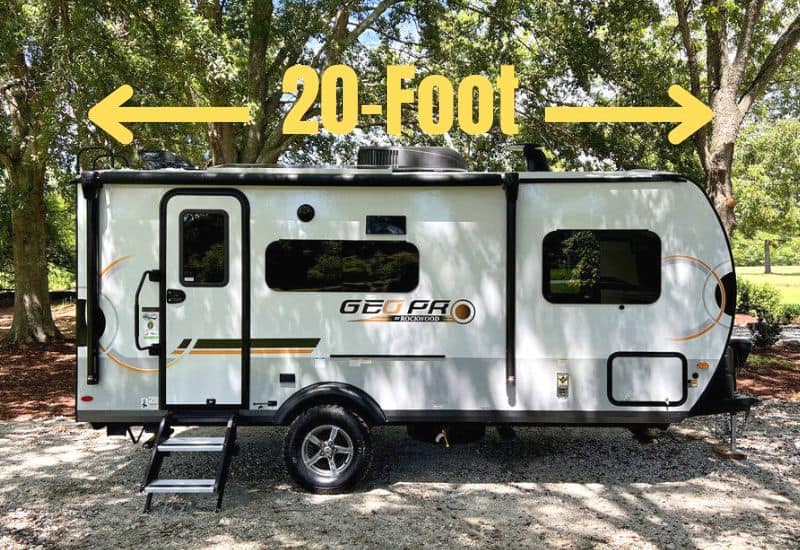
Travel trailers come in all different lengths, from as short as 13 feet to as long as 41 feet, and everything in between.
One of the most popular camper lengths though is the 20-foot travel trailer.
As this trailer length offers a nice compromise between the smallest and largest travel trailers.
By offering more interior space and amenities compared to the smallest options, while at the same time maintaining a more manageable weight and length compared to the largest options.
Allowing the 20-foot travel trailer to be pulled by a variety of vehicles (more on this later).
If you’re thinking about purchasing or renting a 20-foot travel trailer though, you’re probably wondering how much they weigh.
As this will impact not only what type of vehicle you need to pull the trailer but also how much camping gear you can take along.
So how much does a 20-foot travel trailer weigh?
A 20-foot travel trailer will generally have a dry weight of between 2,500 and 4,000 pounds and a fully loaded weight of between 3,000 and 4,500 pounds.
Depending on the make and model of the trailer and the amount of cargo loaded into the camper.
If you’re looking for a more detailed answer, though, keep reading.
As we provide the dry weight, hitch weight, cargo carrying capacity, and gross vehicle weight rating on 12 of the most popular 20-foot travel trailers below.
How Much Does a 20-Foot Travel Trailer Weigh? (Lightest to Heaviest)
Understanding the different weights of a travel trailer.
When it comes to travel trailer weight there are four main weights to be concerned with, including dry weight, hitch weight, cargo carrying capacity, and gross vehicle weight rating.
As all these different weights either directly or indirectly affect the most important weight of all when towing a travel trailer, which is the fully loaded weight of the trailer.
To get a better understanding of each of these weights and how they affect the fully loaded weight of a camper though, let’s take a closer look at each one individually.
Dry Weight (Unloaded Vehicle Weight)
One of the most cited weights of a travel trailer is its dry weight or unloaded vehicle weight, which is the curb weight of the trailer with empty tanks and nothing loaded inside .
This is the weight that’s listed on most travel trailer spec sheets as the weight of the trailer, which is true, as it’s the weight of the trailer as it comes from the RV manufacturer.
However, this weight is not the whole picture when it comes to the weight of the trailer and should only be used as a baseline when trying to figure out the true weight of a travel trailer.
As no one pulls a completely empty camper behind them when they go camping.
Leading us to the next important travel trailer weight that needs to be accounted for, which is cargo carrying capacity.
Cargo Carrying Capacity
The cargo-carrying capacity of a travel trailer is the amount of weight that can be safely loaded into the camper .
This includes camping gear, water, food, and any other items loaded into the camper.
Typically, for a 20-foot travel trailer, this number is usually around 1,000 pounds, give or take a few hundred pounds, depending on the make and model.
However, just because the trailer and its axle or axles can handle the extra weight that doesn’t mean the tow vehicle can.
And this is where many RV beginners get into trouble.
Because while they usually account for the trailer’s dry weight, they fail to account for all the weight being loaded into the trailer.
And ultimately the fully loaded weight of the trailer.
Which can be problematic for many reasons.
As you ideally want the fully loaded weight of the trailer to be 20 percent below the max tow capacity of the tow vehicle .
As this provides a margin for error, makes challenging towing more manageable, and helps to protect the tow vehicle.
Gross Vehicle Weight Rating (GVWR)
A travel trailer’s gross vehicle weight rating (GVWR) is its maximum weight rating , or how much the trailer and its contents can weigh.
The manufacturer sets this number, and it should never be exceeded, as this is the maximum weight the trailer can safely handle.
Which is dictated by the trailer’s structural components, including the trailer’s axle, suspension, and frame.
Most 20-foot travel trailers will generally have a GVWR of around 4,000 pounds, give or take a few hundred pounds, depending on how large and how well-built the trailer is.
However, some 20-foot campers can have gross vehicle weight ratings as high as 5,000 pounds.
Also, as a helpful tip, if you’re having trouble figuring out what a trailer’s gross vehicle weight rating is, you can always add the dry weight of the trailer and its cargo-carrying capacity to come up with the number.
Hitch Weight
Often overlooked, the hitch weight of a travel trailer is another important weight to consider, as it indicates how much weight the trailer’s tongue places on the hitch of the tow vehicle .
Which is an important figure to know.
Because you don’t want to exceed the max hitch weight of a tow vehicle any more than you want to exceed its max tow capacity.
As this can cause all sorts of issues.
Including overloaded rear tires and suspension on the tow vehicle, unlevel ride height, and an unstable tow vehicle and trailer.
The good news though is that generally speaking if the tow vehicle can handle the fully loaded weight of the trailer it can usually handle the hitch weight as well.
However, this is not always the case.
As some travel trailer floorplans, such as front kitchen layouts, can have extremely heavy hitch weights.
So you always want to check to ensure that the tow vehicle can handle not only the trailer’s fully loaded weight but also its hitch weight as well.
Generally speaking though, most 20-foot travel trailers will have a hitch weight of around 400 pounds, give or take 50 pounds or so.
What Affects the Weight of a 20-Foot Travel Trailer?
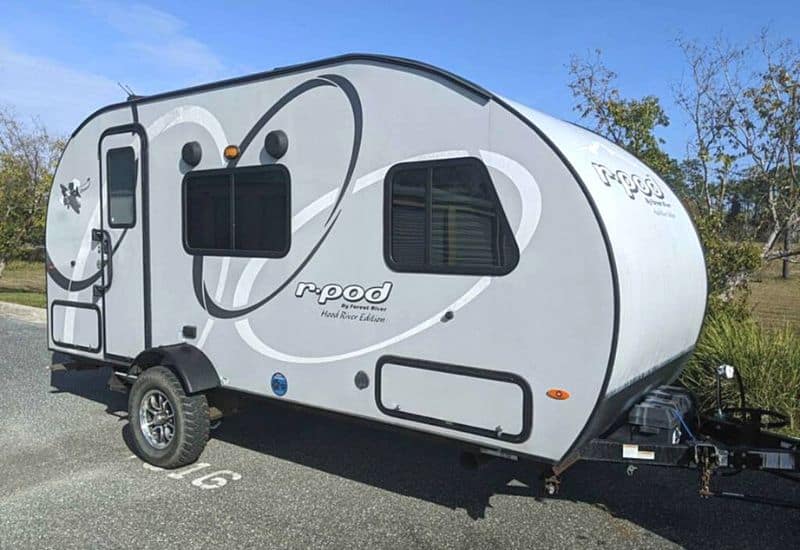
While it might seem logical that all 20-foot travel trailers would have a similar weight, due to their similar length.
In practice, this is not the case.
As there can be as much as a 1,500-pound difference between the lightest and heaviest 20-foot travel trailers .
But why is this?
Well, to answer this question, let’s take a closer look at the biggest factors that can affect the weight of a 20-foot travel trailer.
Construction
One of the most significant factors that can affect the weight of a travel trailer is how the trailer is constructed and the materials used in the build process.
For example, premium 20-foot trailers will often use lightweight construction and materials, such as aluminum framing, fiberglass exteriors, and Azdel construction.
Which can have a big impact on the weight of the camper.
Another big factor that can affect the weight of a camper is whether the trailer has any slide-outs.
As even one slide-out can add significant weight to the trailer.
As the typical RV slide-out will often add around 800 pounds to the weight of the trailer .
Wide Body Construction
While different 20-foot travel trailers have similar lengths often only separated by a few inches that doesn’t mean they have similar widths.
As different travel trailers even ones with similar lengths can have different widths, which can add extra weight to the trailer.
For example, while some 20-foot campers have exterior widths of 7 feet, others have exterior widths of 8 feet.
Which not only adds interior space to the camper but also weight.
Finally, how the trailer is outfitted with amenities can also impact how much the trailer weighs.
For example, if the trailer is outfitted with a bigger and heavier air conditioner, outdoor kitchen, or a larger battery system, this can quickly add several hundred pounds to the trailer’s dry weight.
How Does the Weight of a 20-Foot Camper Compare to Other Camper Lengths?
As you might expect, when comparing different camper lengths, generally speaking, the higher up in length you go, the heavier the trailer will be.
If you’re trying to figure out how much weight though, we’ve included some of the most popular trailer lengths below and their corresponding average weights.
As you can see from the above table, generally speaking, each additional two feet of travel trailer length adds an additional 1,000 pounds of weight to the trailer .
What Types of Vehicles Can Tow a 20ft Travel Trailer?
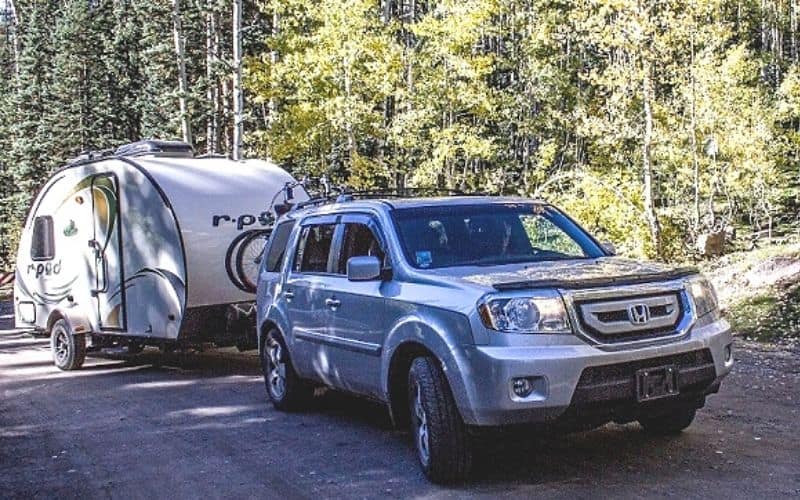
Thanks to the lighter weight of 20-foot travel trailers there are a wide variety of vehicles that can safely pull these campers.
Including not only full-size trucks but also many smaller trucks as well as some mid-size to full-size SUVs .
To get an even better idea though, of which vehicles can tow a 20-foot travel trailer, we’ve included the below list of popular vehicles that can generally tow a 20-foot camper, based on the vehicle’s current max tow capacity.
Vehicles that can Pull a 20-Foot Travel Trailer & Their Max Tow Capacities
- Honda Pilot – 3,500 to 5,000 Pounds
- Hyundai Santa Cruz – 3,500 to 5,000 Pounds
- Chevrolet Colorado – 3,500 to 6,000 Pounds
- Toyota Tacoma – 3,500 to 6,800 Pounds
- Jeep Grand Cherokee – 3,500 to 7,200 Pounds
- Toyota 4Runner – 5,000 Pounds
- Ford Explorer – 5,300 to 5,600 Pounds
- Ford Expedition – 5,900 to 6,000 Pounds
- Ford F-150 – 5,000 to 11,300 Pounds
- GMC Canyon – 6,000 Pounds
- Dodge RAM 1500 – 6,180 to 8,330 Pounds
- Nissan Frontier – 6,230 to 6,720 Pounds
- Lincoln Navigator – 6,200 to 8,300 Pounds
- Chevrolet Suburban 7,400 to 7,800 Pounds
- Ford Ranger – 7,500 Pounds
- Cadillac Escalade – 7,500 to 7,700 Pounds
- Nissan Armada – 8,500 Pounds
- Chevrolet Silverado 1500 – 8,900 to 11,000 Pounds
What is the Lightest Travel Trailer?
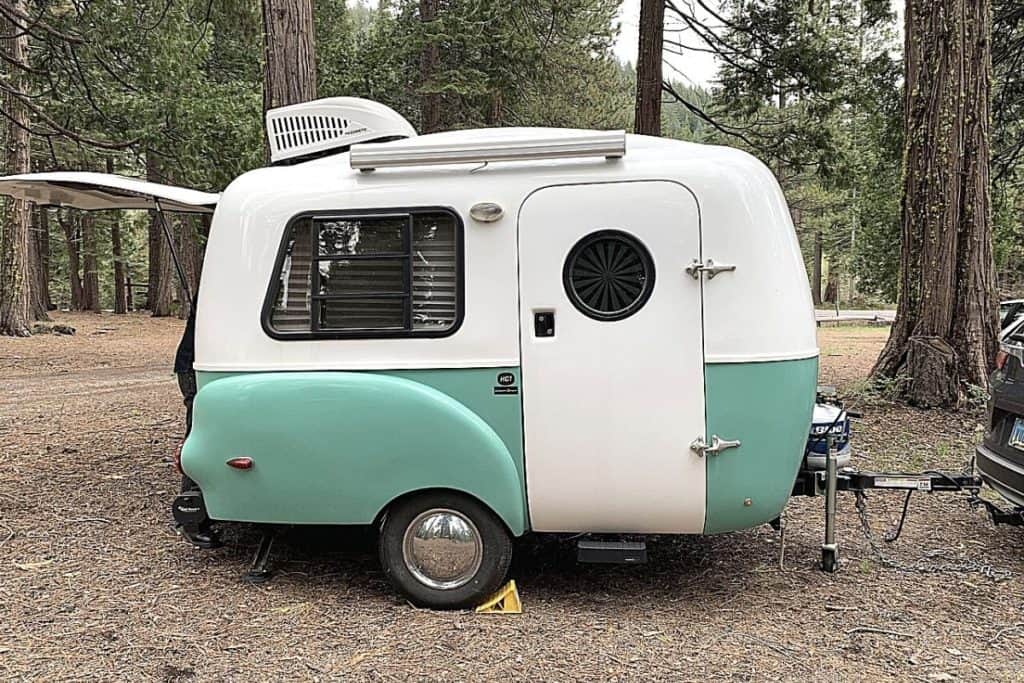
The lightest travel trailer is the Happier Camper HC1, which has a dry weight of 1,100 pounds and a length of 13 feet.
Designed to be pulled by the most limited of tow vehicles, the HC1, can be towed by many compact SUVs and even some 4-cylinders .
To see other ultra-lightweight campers, check out our blog post “ What is the Lightest Travel Trailer on the Road Today? “.
What is the Heaviest Travel Trailer?
The heaviest travel trailer is the Jayco Eagle 334DROK, which has a dry weight of 11,375 pounds and a gross vehicle weight rating of 12,825 pounds.
In addition, thanks to the trailer’s length of 41 feet 2 inches, the Jayco Eagle 334DROK is also the longest travel trailer as well.
Because of this, only the largest and most capable tow vehicles, such as 3/4-ton and 1-ton trucks can safely handle the weight and size of this enormous camper.
To see other large and heavy travel trailers, check out our blog post “ What is the Heaviest Travel Trailer? “.
Jason is an avid lover of RVs and the RV lifestyle. He is both a writer and editor for RV Owner HQ and has been RVing and camping for over 20 years.
Recent Posts
23 Inspiring Farmhouse RV Decors to Transform Your Camper
Are you looking to give your RV a cozy, rustic makeover? If so, farmhouse decor is the perfect style to transform your camper into a warm and inviting home on wheels. In this blog post, I'll...
15 Farmhouse RV Decorating Ideas for a Cozy Retreat
As a budding interior design enthusiast, I've always been drawn to the charm of farmhouse style. Recently though, I've discovered that using this popular design style in my Forest River Rockwood...

- Find a Location
The Best Lightweight Travel Trailers Under 3,000 Pounds

- Length: 21’5”
- Dry Weight: 2,970 pounds
- Sleeping Capacity: Up to 3
The Lantern LT 17R is one of the newest additions to Coleman’s lineup. Coleman has improved upon the 17B by turning it into a more comfortable couple’s RV, highlighted by the spacious rear bathroom and closet. Units should start hitting Camping World lots in spring 2023, so stay tuned into inventory in your region.
Find the latest availability on Coleman Lantern 17R campers.
Check out other lightweight travel trailers perfect for couples .
Coleman Rubicon 1200RK
- Length: 13’5”
- Dry Weight: 1,682 pounds
- Sleeping Capacity: Up to 2
Ideal for couples or solo travelers, the Coleman Rubicon 1200RK is a rarity among travel trailers on the market today – it can fit in most garages with an overall height of seven feet. The rear outdoor kitchen features a bigger refrigerator than previous models, and the reinforced wheel fenders make it easy to access the RV’s roof.
Explore our selection of Coleman Rubicon trailers.
Coleman 17B
- Dry Weight: 2,985 pounds
- Sleeping Capacity: Up to 5
The Coleman 17B travel trailer provides a lightweight base for family camping adventures. Affordability is the main draw to this bunkhouse camper, but it features everything you’ll need to easily transition from tent camping to RVing, including a six-gallon water heater, two-burner cooktop, single-door refrigerator, and much more.
Shop Coleman travel trailers.
Forest River Lightweight Travel Trailers
Forest river flagstaff e-pro e15tb.
- Length: 15’8”
- Dry Weight: 2,667 pounds
The Forest River Flagstaff E-Pro E15TB is a unit that has a unique layout with two 30” x 74” twin beds that can be converted to a king-sized bed for couples. It’s Forest River’s smallest walkable camper, but it still packs a full kitchen and bathroom for comfort and convenience.
This travel trailer also comes with an exterior gas grill. You’d be surprised how much you’ll use an outdoor kitchen in a smaller RV. The Flagstaff E-Pro E15TB is a lightweight travel trailer with a 10’ power awning, plenty of exterior storage, and a 2” hitch receiver for a bike rack or cargo carrier.
Shop Forest River Flagstaff E-Pros.
Forest River R-Pod 180
- Dry Weight: 2,950 pounds
The Forest River R-Pod 180 is an excellent, lightweight travel trailer with everything a couple could need for a weekend warrior getaway or a longer boondocking trip to a wild landscape.
Across from the entry door, on the off-camp wall, is a slide with the two-burner stove, sink, prep space, and refrigerator. The 75″ by 24″ dinette is great for game nights or if you need extra sleeping space when hosting guests. There’s a large queen-sized bed at the front of the unit and a dry bath along the rear wall.
Shop Forest River R-pods.
Forest River Ozark 1530VBK
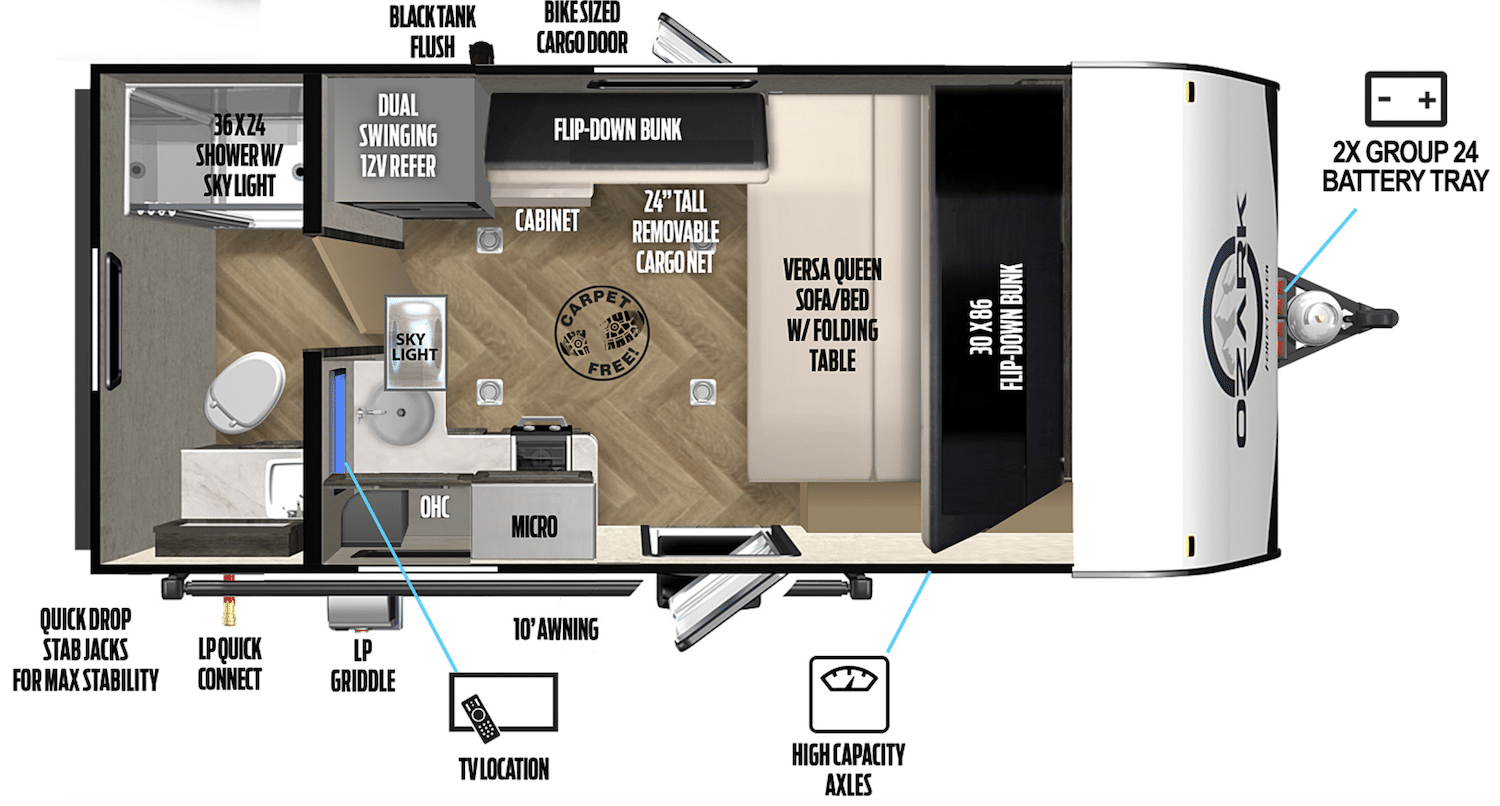
- Length: 18’1”
- Dry Weight: 2,989 pounds
- Sleeping Capacity: Up to 4
Don’t be fooled by the compact size of the Forest River Ozark 1530VBK . This lightweight travel trailer is packed with amenities and designed for rugged adventures. That starts with the high-capacity axles and the bike-sized cargo door on the off-camp side.
Inside, the rear bath floorplan gives you one of the most versatile living spaces out there. There are two flip-down bunks, an optional cargo net for storage, a central skylight for extra natural light, and one of the largest 12-volt refrigerators you’ll find in smaller campers.
Discover more about the Forest River Ozark trailers.
Jayco Lightweight Travel Trailers
Jayco jay flight slx 154bh.
- Length: 18’
- Dry Weight: 2,810 pounds
The Jayco Jay Flight SLX 154BH is a simple bunkhouse floorplan with 29” x 75” bunks, a convertible front dinette, a full bathroom, and a modest kitchen. There’s also a nice ward next to the entrance door, a spacious pantry, and plenty of storage in the overhead cabinets.
While it’s already easy to tow because it’s small and lightweight, this camper is also prepped for side and backup cameras. You’ll also find an LP quick connect, an exterior TV hookup, and roof solar prep among the list of standard features on the Jay Flight SLX 154BH.
Shop Jayco Jay Flight travel trailers at your local Camping World.
Jayco Hummingbird 16MRB
- Length: 19’10″
- Dry Weight: 2,890 pounds
The Hummingbird 16MRB is another lightweight model (no longer in production as of 2020) from Jayco. This unit features a 60″ by 75″ Murphy bed, a split kitchen, and a large rear bathroom with linen and storage closets. The Murphy bed offers extra versatility, converting to a comfortable sofa during the day.
Shop used Jayco Hummingbird floor plans.
Other Lightweight Travel Trailers
Sometimes less is more, especially when it comes to small lightweight travel trailers . Less to tow, less to maintain, and less to clean means more time for adventures, fun, and making memories.
RV owners often find peace of mind by towing smaller travel trailers, especially when navigating certain roads and paths. Whoever said good things come in small packages must have been referring to travel trailers.
Happier Camper HC1
- Length: 13’
- Dry Weight: 1,520 pounds
Who doesn’t aim to be a happier camper? Thanks to Happier Camper , that goal is more achievable than ever. Responsible for revolutionizing the lightweight travel trailer industry with its trademarked modular Adaptiv® system, Happier Campers can quickly and easily become whatever you need them to be. The modern design certainly doesn’t hurt, either.
Learn more about the Happier Camper HC1.
TAXA Outdoors Cricket
- Length: 15’
- Dry Weight: 1,800 pounds
Look no further if you’re looking for a lightweight, rugged, sophisticated design and bold purpose. The TAXA Outdoors Cricket is the ideal small travel trailer for your next adventure. The pop-up roof is optimized for ventilation without sacrificing protection. As a bonus, it fits in a standard garage.
Find pricing and availability for the TAXA Outdoors Cricket small campers.
Airstream Basecamp 16
- Length: 16’2”
- Dry Weight: 2,650 pounds
Airstream’s revitalized Basecamp 16 travel trailer is another excellent lightweight travel trailer under 3,000 pounds. Built for two, it’s perfect for adventurous couples who need a cozy place to rest each evening. It has a full wet bath inside and is equipped with thoughtful amenities like a rear hatch for cargo loading and an exterior shower for rinsing yourself and your gear.
Discover Airstream trailers at your local Camping World.
Find Your Lightweight Travel Trailer
Is your tow vehicle up to the task of towing one of the best lightweight travel trailers under 3000 pounds? Use Camping World’s Towing Guide to check your maximum towing capacity before you go any further.
You’d be surprised at how light and nimble today’s RVs are. Manufactured with lightweight materials and designed to be aerodynamic, today’s towable travel trailers are getting increasingly easier to pull.
It doesn’t take much to tow 3,000 pounds. You might even be able to tow with a minivan . With that, you have a full kitchen, bathroom, and bedroom wherever you park it – a tiny home on wheels.
If your current RV isn’t lightweight, sell or trade it in for one that is. Camping World has options to suit every RV enthusiast! Fill out an online credit application and get pre-approved today.
Check out some of our other content on lightweight camper trailers and how to find your RV:
- Understanding RV Weight Ratings
- The Best Family Travel Trailers Under 4,500 Pounds
- The Best Retro Style Travel Trailers
- Everything You Need to Know Before Buying a Travel Trailer
Do you have any other suggestions for the best lightweight travel trailers? Leave a comment below.
- Comment (21)
I am having trouble deciding from a travel trailer to a RV. I am lookong used and am feeling a little intimadated to whole Idea of living in and owning a travel house. Wade i think you look a lot like my cousin Braden. Uncanning. With that said what would you recommend? I am a woman, in my 40’s, with a disability looking for a home. I dont need super luxury, but I also dont want something that could potentially be a money eater. I have a variety of tools and sure i can use them and figure things out, but even i know when i shoukdnt or its beyond my knowledge. When i go camping its usually in my car or a tent. What wpuld you reccommend? Are there easier and harder options? Can i paint this rv purple and green if i would like? I have so many questions. I will keep on researching more and more i kind of liked the van home my cousin guy had two yeara ago, althoigh i never dis get to see the inside. I dont know whether to buy a dolly and tow my car behind or buy a new car to tow the home. The 4 cylinder vehicle i have may not be enoigh. I just hope it is big enough for 2 and maybe a dog. I may want to make dinner for aomeone someday. I may want to have my family visit., althoigh theu may have to find their own place to sleep. Wow i better stop, i have no idea.
What about cassita and scamp? They are 13-17 feet and feature full bath, kitchen, dinette, full bed, etc

Those are indeed great options John. Thanks for bringing them to the attention of your fellow readers!
Is there anything <3,000 that sleep 3 adults and has a bathroom? We’re a family of 4 with 3 wanting to visit the 4th at college for weekends. Car is a Chevy Traverse with max tow of 5,000-ish but understand we want to be well under for the trailer. Lots of options to sleep 2.
You might also be interested in our article on trailers under 4500 pounds:
https://blog.campingworld.com/find-your-rv/travel-trailers-that-weigh-4500-pounds-or-less-that-are-perfect-for-families/
The first two Coleman trailers in that article sleep up to 5 and up to 4, respectively.
Hope that helps!
Are there any 3,000 -3,500 lb travel trailers with tandem axles?
And as always not one word about the price. B i g secret!
Wade You should look at RKS Offroad. I visited them a month ago. They are a startup trailer company out of souther California and they are doing some great things. Hopefully they make it to Florida.
There is a new trailer company out of California called RKS Offroad. You should include new companies like this for consideration in your list
Try looking at the e-pros by Thor Flagststaff and their companion G-Pro. Many of them are under 3000 pounds and come with all kinds of bells and whistles
I wan thebedroom in the back of the trailer is that possible
Dry weight does not include the cargo or the weight of the passengers. Isn’t that to be considered when towing capacity. Our towing capacity is 3,500 lbs. we were told to add our weight and everything in the truck bed and stowed inThe camper such as food appliances and dishes.
Can we get any of these without the dinette, I really need theater, double recliner
Please provide price for these 5 light weight rvs.
I would like to come down Monday afternoon to apply for finance Im looking for a small pull behind camper that sleeps four
Hi Courtney!
There is a lot to learn when you’re new to RVing, but I’d say the best thing you can do is head to your local Camping World to actually tour different RV types and floorplans in person. There’s really no substitute for walking into an RV when it comes to envisioning how your lifestyle might look if you owned it.
Aside from that, here are a few links to articles that address some of your questions:
https://blogcw.local/rv-basics/finding-your-rv/how-to-overcome-first-time-rver-intimidation/ https://blogcw.local/rv-basics/finding-your-rv/choosing-your-rv-towable-vs-motorized/ https://blogcw.local/rv-basics/finding-your-rv/intro-to-rvs-types-classes/ https://blogcw.local/rv-basics/inside-your-rv/what-you-need-to-know-if-you-want-to-repaint-the-inside-of-your-rv/ https://blogcw.local/rv-basics/finding-your-rv/5-rvs-you-can-pull-with-an-suv/ https://blogcw.local/rv-basics/finding-your-rv/rv-buying-guide-towing-with-a-midsize-suv/
Hi Peter, it’s not a big secret, but the price can vary dramatically depending on the deals and promotions currently going on. Because of that, they are omitted from this article. It would be silly to publish prices when you could potentially get a far better deal than the list price. I’d suggest you go to https://rv.campingworld.com/ if you’re curious about the prices on these travel trailers. The prices can be easily found there.
Yep! Check the inventory on Camping World’s website!
Hi Pam, your right. Dry weight doesn’t include the cargo or the weight of the passengers. It must be factored in. If you’re vehicle is only able to tow 3,500 lbs, then you definitely need to make sure you’re under that with the passengers and cargo included.
Hi Joda, give your local dealership a call and I’m sure they will be happy to assist you!
Hi Jerry, the price will vary depending on where they’re sold. The MSRP isn’t super representative of what you can get them for at Camping World dealerships. Your best bet is to click through to Camping World’s inventory and see what the dealers have them listed for.
Leave Your Comment Cancel Reply
Save my name, email, and website in this browser for the next time I comment.
Shop By RV Type

Your Adventure Awaits
Copyright © 2023 cwi, llc all rights reserved.
- RV Glossary |
- Privacy Policy |
- California Privacy Rights |
- Do Not Sell or Share My Personal Information |
- Targeted Advertising Opt Out |
- Terms of Use

10 Perfect Travel Trailers to Tow With Your Half-Ton Truck
We've curated 10 camper trailers perfect for half-ton pickups that cover a broad range of styles, construction, and design characteristics. Among this selection of travel trailers are towable habitats to satisfy an array of interests ranging from relaxed family camping to energetic backcountry exploration.
If you're looking for something that sleeps an entire troop of family members, we've got that. If it's a deep off-road reach you're hankerin' for, that's here, too. If you like something a little cushy while having outdoor adventure close at hand, you're in luck. Take a look, compare features and specifications, and then check out more options and information on each travel trailer manufacturer's website.
Note: All prices listed are MSRP.
10 Perfect Half-Ton Pickup Compatible Camper Trailers
Airstream bambi 22fb : $69,200+.
- Base weight: 3,900 lbs.
- Hitch weight: 500 lbs.
- GVWR: 5,000 lbs.
- Overall length: 21 ft., 11 in.
- Exterior width: 8 ft.
- Exterior height: 9 ft., 3 in.
- Interior height: 6 ft., 4 in.
- Sleeping capacity: Up to 4
- LPG capacity: Two 20-lb. tanks
- Freshwater tank: 23 gals.
- Gray water tank: 30 gals.
- Black water tank: 17 gals.
The Airstream Bambi trailer line is available in four different models ranging from 16 to 22 feet in length. The Bambi is a perfect example of Airstream's classically stylish aluminum design and sturdy construction. We chose to highlight the Bambi 22FB floorplan because it's the largest member of the Bambi family, is easily maneuverable, and is a great fit for a half-ton pickup truck like the Ford F-150 .
Airstream has been a pioneer in the RV industry since its inception in 1931. The Bambi travel trailer line is a masterpiece of maximizing available space while still delivering top-of-the-class features and amenities. The Bambi 22FB is big enough to comfortably sleep four people.
It offers a primary front bed with a view and a fully equipped bathroom. It also offers a large storage closet, spacious and well-equipped kitchen, and convertible U-shaped dinette.
As with most Airstream trailers, the Bambi's exterior is a semi-monocoque aluminum superstructure instead of the more typical wood-framed camping trailer construction. Running gear includes a torsion axle suspension and ST 225/75R15 tires on 15-inch aluminum wheels.
The Airstream Bambi 22FB delivers as standard equipment a 26-inch-wide entry door, rear-view monitoring system, LED lighting seemingly everywhere, and an enclosed, aluminum insulated and heated underbelly. Equipment often on the options list of other trailers, like an LED HD television with DVD and omnidirectional antenna, are also standard on this camping trailer.
Coleman Lantern 285BH : $43,320
- Base weight: 6,611 lbs.
- Hitch weight: 869 lbs.
- GVWR: 9,680 lbs.
- Overall length: 32 ft., 9 in.
- Exterior height: 11 ft., 2 in.
- Sleeping capacity: Up to 8
- LPG capacity: Dual 20-lb. tanks
- Freshwater tank: 60 gals.
- Gray water tank: 42 gals.
- Black water tank: 42 gals.
Coleman's iconic pop-up tent trailer that so many began their family camping experiences in a generation ago is no longer being built. However, the Coleman trailer brand and its legendary utility have been transformed under the Dutchmen RV umbrella. A fully featured line of Coleman travel trailers is now available that can serve as a perfect support system for outdoor adventures.
The Coleman Lantern 285BH is on the larger end of our scope of interest here but remains easily towable (with a weight-distributing hitch) using a half-ton pickup truck such as the Chevy Silverado 1500. We think the Coleman Lantern 285BH camping trailer would be a good choice for a larger family or an extended family group that enjoys the outdoors.
It features bunk beds, a large slide-out with a convertible couch and dinette, and a primary bedroom with a queen-size mattress. This combo makes it capable of sleeping up to eight people.
An insulated structure with a metal exterior panel, wood framing with thermal insulation, and a Lauan (a hardwood plywood) interior panel is a typical trailer construction method used for the Coleman Lantern. Its roof features a Lauan interior panel, wood framing, fiberglass insulation, 3/8-inch decking, and an EPDM (synthetic rubber membrane) top layer.
Standard amenities in the Coleman Lantern include 28-inch entrance doors, a 13,500-BTU air conditioner, a power awning, interior 120V and 12V power outlets, an enclosed underbelly, and an exterior shower. The Coleman Lantern 285BH camping trailer also features a full kitchen with a three-burner cooktop, microwave, 10-cubic-foot fridge, and a large sink kitchen with a high-rise faucet.
Forest River No Boundaries 20.3 (Unplugged Package) : $50,000
- Base weight: 5,306 lbs.
- Hitch weight: 734 lbs.
- GVWR: 7,734 lbs.
- Overall length: 26 ft., 2 in.
- Exterior height: 11 ft., 3 in.
- Freshwater tank: 40 gals.
- Gray water tank: 40 gals.
- Black water tank: 30 gals.
Forest River offers more than a dozen different RV brands and configurations ranging from motorhomes, toy haulers, fifth-wheel trailers, travel trailers, and pop-up tent trailers in all shapes and sizes. One of our favorites is the Forest River No Boundaries line of travel trailers that are perfect for half-ton pickups.
The Forest River No Boundaries travel trailers are rugged towables, ranging in length from 12 to 25 feet, designed with the outdoor enthusiast in mind. They offer adaptable storage solutions for bikes , kayaks, SUPs , surfboards, skis, and fishing equipment.
Helping transport you deeper into the wild with higher than typical ground clearance, larger-diameter tires, and a nimble suspension system, the Forest River No Boundaries allows you to set up camp in locations others would find inaccessible.
Our choice would be the Forest River No Boundaries 20.3 Unplugged Package travel trailer. Like all the No Boundaries trailers, 20.3 offers familiar standard equipment and a host of useful options to choose from. The UnPlugged Package model adds four lithium-ion batteries, a digital control screen, remote A/C control, and a heavy-duty solar panel.
Interior living amenities include a sofa and 60×80-inch Murphy bed up front, slide-out with a convertible dinette and well-equipped kitchen mid-ship, 52×74-inch bunk beds, and a bathroom with shower stall in the rear of the trailer. Available options start with a 13.5K-BTU AC unit, 5,500-BTU heat strip, power tongue jack, and a batwing awning .
inTech RV O-V-R Adventure : $61,880
- Base weight: 5,700 lbs.
- Hitch weight: 1,100 lbs.
- GVWR: 8,500 lbs.
- Overall length: 29 ft., 3 in.
- Exterior width: 8 ft., 3 in.
- Exterior height: 10 ft., 6 in.
- Interior height: 6 ft., 11 in.
- Sleeping capacity: Up to 6
- Freshwater tank: 44 gals.
- Gray water tank: 39 gals.
- Black water tank: 26 gals.
The inTech O-V-R Adventure travel trailer is what the RV industry refers to as a tow hauler. It does a great job of carrying motorcycles or UTVs and at the same time providing its inhabitants with comfortable and modern creature comforts and amenities.
A lightweight but sturdy all-aluminum frame and body supported by a torsion axle suspension team up to help better manage irregular road surfaces on the way to your outdoor adventure destination.
The versatile interior design utilizes every inch of the space inside the inTech O-V-R Adventure trailer. The voluminous trailer box has a cargo hold length of 13 feet, 3 inches, but can easily be converted from toy hauling duty to living, dining, and sleeping space in a matter of minutes. The well-equipped modern kitchen, wet bath (enclosed shower stall with a porcelain toilet), and large (60×80-inch memory foam queen) front bedroom are static.
Standard equipment for the O-V-R Adventure trailer includes a power tongue jack, 25K-BTU furnace heater, 15K-BTU ducted air conditioning system, and a heated underbelly with line heaters and tank heat pads. The ramp door is 7 feet, 1 inch wide and 6 feet, 7 inches high.
Available options are few because it's already loaded. However, a pair of 75-inch foldup couch/beds for the interior dinette, an 18-foot power awning with wind protection that auto retracts, and an Off-Grid Package that includes a 400W solar power system with a 2,000W inverter perfectly round out the inTech O-V-R Adventure toy hauler trailer.
Jayco Jay Feather 26RL : $52,275
- Base weight: 6,115 lbs.
- Hitch weight: 690 lbs.
- GVWR: 7,500 lbs.
- Overall length: 31 ft., 11 in.
- Exterior height: 10 ft., 8 in.
- Interior height: 6 ft., 6 in.
- Freshwater tank: 55 gals.
- Gray water tank: 31 gals.
- Black water tank: 31 gals.
The Jayco Jay Feather 26RL travel trailer is a perfect fit for a Toyota Tundra or any of the half-ton pickup trucks available today. The Jay Feather 26RL was designed to offer a large open space in the rear of the trailer with a wide pull-out holding a convertible dinette, a big fridge, and a pantry closet.
Opposite the 26RL trailer's pull-out is a full kitchen with an L-shaped counter and overhead cabinets, a dual sink, a three-burner stove, and a microwave. An entertainment center and LED TV are integrated into the kitchen area and can be seen from the dinette or from the theater seats (optional) along the back wall.
A 60×75-inch queen bed and plenty of storage space make up the roomy front primary bedroom that can be accessed from inside the Jay Feather 26RL trailer or from the outside through a second door. The bathroom in between the front bedroom and main living area is generously sized with an enclosed shower, a separate flush toilet, and a large sink.
Standard equipment includes desirables like a 35K-BTU furnace heater, a 15K-BTU A/C, an 8-cubic-foot fridge, ball-bearing drawer guides, residential-style kitchen countertops, and a 20-foot awning.
Jayco's Jay Feather 26RL travel trailer is built on an I-beam main frame with an integrated A-frame structure for strength and durability. The trailer body is made up of a welded-aluminum-framed, vacuum-bonded laminated side. Its rear walls have a fiberglass exterior siding that is lightweight yet sturdy and well-insulated.
The floor is a 2-inch vacuum-bonded panel with foam insulation, and the waterproof and insulated roof is based on trussed wood (2×2-inch studs) and plywood construction that offers high weight-bearing performance.
Lance Camper 2445 : $89,024
- Base weight: 6,605 lbs.
- Hitch weight: 605 lbs.
- GVWR: 8,700 lbs.
- Overall length: 29 ft., 10 in.
- Exterior width: 8 ft., 3/8 in.
- Exterior height: 10 ft., 5 in.
- Interior height: 6 ft., 8 in.
- LPG capacity: 20-lb. tank
- Freshwater tank: 45 gals.
- Black water tank: 40 gals.
The Lance 2445 travel trailer is another great match for a half-ton pickup such as the GMC Sierra 1500 . If the name Lance Camper sounds familiar, it should. Lance has been building one of the RV industry's best slide-in truck campers and continues to do so. A few years ago, Lance also began building a full line of high-end travel trailers with the same attention to detail and quality that made its truck camper a bestseller.
Part of a 12-model line of Lance travel trailers running from just under 15 feet to nearly 30 feet in length, the Lance 2445 travel trailer offers a primary bedroom up front with Lance's SkyView dual-pane radius windows, a slide-out carrying a convertible dinette, and bunk beds in the tail end.
Built upon an aluminum frame, the Lance 2445 travel trailer's construction features high-density foam block insulation, dual-layer Adzel composite (no wood) panel, and a crowned roof topped with a synthetic membrane.
Standard interior features of the Lance 2445 travel trailer include an enclosed glass shower stall and porcelain toilet. The kitchen offers a 21-inch oven, three-burner range, microwave, 6-cubic-foot fridge, and undermounted residential-style sink.
Electrical equipment includes ducted A/C, a heater, exterior solar quick connect (SAE port), systems monitor panel, and USB, 120V, and 12V power ports. Among your choice of options for the Lance 2445 travel trailer are a 1,500W inverter, a 190W solar panel, and Lance's own easy-loading roof rack. The optional shock absorber package can make dirt roads easier to manage on the way to find some adventure.
Opus Camper OP15 : $65,000
- Base weight: 5,159 lbs.
- Hitch weight: 410 lbs.
- GVWR: 6,393 lbs.
- Overall (closed) length: 23 ft.
- Exterior width: 7 ft.
- Exterior height (roof closed): 8 ft., 10 in.
- Interior height: 6 ft., 5 in. (open) / 5 ft., 5 in. (closed)
- Freshwater tank: 63 gals.
- Gray water tank: 17 gals.
- Black water tank: 10 gals.
Called an off-road hybrid caravan by its builder, the Opus Camper OP15 is a serious overlanding machine designed for those outdoor enthusiasts who like getting far away from it all while having all the comforts and amenities of home. Newly reengineered for severe off-road environments, the independent trailing arm suspension system underneath the bomb-shelter-sturdy Opus OP15 trailer's cabin features dual shock absorbers and larger springs repositioned for improved performance.
The interior of the Opus Camper OP15 trailer increases in size dramatically once it’s parked and the pop-top roof and rear slide-out are extended. Inside the OP15 you'll find a king-size bed, bunk beds, a dining lounge with plush seating and an adjustable table, plenty of storage space, and a full bathroom with shower, sink, and flush toilet.
The OP15 trailer's outdoor slide-out kitchen delivers a stainless-steel sink, a four-burner stainless steel stove, and a food-prep deck. A second outdoor slide-out carries a 12V fridge/freezer combo.
The Opus Camper OP15 scores more off-road points with its 360-degree articulating trailer hitch and large all-terrain tires (including two spares). A fully galvanized welded chassis and drawbar, stone guard, heavy-duty safety chains, and electric brakes are standard equipment.
Fully loaded for off-grid adventure the OP 15 also offers three 100A AGM batteries, a 300W solar panel setup, and utility storage for two 6-gallon fuel cans as standard. You can boost that capability with options such as a DC charger, or lithium batteries and an upgraded charger.
Outdoors RV Back Country Series 24KRS : $80,060
- Base weight: 7,430 lbs.
- Hitch weight: 965 lbs.
- GVWR: 9,995 lbs.
- Overall length: 28 ft., 8 in.
- Exterior height: 11 ft., 6 in.
- LPG capacity: 80 lbs.
- Freshwater tank: 100 gals.
- Gray water tank: 80 gals.
One of the heavier examples in this buyer's guide of travel trailers well suited for half-ton pickup trucks is the Outdoors RV Back Country 24KRS. The Back Country 24HRS was designed for the outdoor enthusiast who is more likely to camp off-grid and off-road.
Stocked with standard features such as a 36K on-board LPG-powered generator, a 170W solar panel with controller, and 100 gallons of freshwater capacity, the Outdoors RV Back Country 24KRS is capable of sustaining itself and its inhabitants for much more than just a 3-day weekend getaway.
Noted by its builder as designed for "mountain states and western Canada," the Backcountry 24KRS is delivered with equipment that are options on many other travel trailers. Thermal pane windows, triple-layered roof insulation, insulated slide-out floor, insulated exterior luggage doors, and a fully enclosed, insulated, and heated underbelly make it a good choice for winter or shoulder-season camping. Off-road chops include an integrated A-frame chassis with a heavy-duty off-road suspension and beefy six-lug 5,000-pound-capacity axles.
The Outdoors RV Back Country 24KRS travel trailer's ability to handle tough roads and long trips is countered with a host of upscale appointments and creature comforts to make the adventure easy to enjoy. A large bathroom is filled with a sink, flush toilet, and roomy shower stall. The kitchen offers a three-burner stove/oven, a large stainless-steel sink with a high-arch faucet, a microwave oven, a huge fridge, and lots of prep space.
Between the 60×80-inch primary bed, a convertible dinette, and a sleeper sofa, there's room to sleep up to six. And the interior is built out in sturdy and attractive cabinetry that offers enough storage space for all your gear.
TAXA Outdoors Mantis 5.2 Overland : $57,874
- Base weight: 3,486 lbs.
- Hitch weight: 510 lbs.
- Overall length: 19 ft.
- Exterior width: 7 ft., 6in.
- Exterior height: 7 ft. (closed) / 10 ft., 1 in. (open)
- Interior height: 4 ft., 7 in. (closed) / Up to 7 ft., 10 in. (open)
- Freshwater tank: 20 gals.
- Gray water tank: 22 gals.
The TAXA Outdoors Mantis 5.2 Overland trailer is an admittedly nontraditional travel trailer. Its unique nature is part of what makes it a good choice for half-ton pickup trucks like the Nissan Titan . It may look a bit like a giant insect, but the Mantis 5.2 Overland camping trailer has everything you need to enjoy a comfortable middle-of-nowhere experience.
Based on the TAXA Mantis 5.2 (the company's largest floorplan), the Overland edition retains all of the original’s creature comforts and conveniences while inheriting a higher level of off-grid and long-term camping capability.
The Mantis 5.2 Overland travel trailer is loaded with a fully equipped kitchen, a combo furnace heater/hot water system, storage compartments everywhere, and comfortable sleeping accommodations for four people. An optional pop-up rooftop tent can sleep two more.
TAXA Outdoors added some serious rough-road handling features like a 360-degree rotation/three-axis hitch for optimum trailer control on or off-road. The Mantis 5.2 Overland trailer rides on a powder-coated steel chassis with a 5,200-pound-rated Timbren axle-less suspension system and a 4-inch body lift. This setup gives the trailer 14 inches of ground clearance, perfect for off-road camping adventures.
A mix of aluminum composite panels, Baltic Birch plywood, and an aluminum and steel structural skeleton make up the atypical shape of the TAXA Mantis 5.2 Overland travel trailer. On the long list of available features are handy items like acrylic windows with screens and shades, batwing-style awnings, and exterior hot and cold showers. An integrated 12V electrical system, wet bath with cassette toilet, and 8K-BTU A/C make long trips even more comfortable.
Venture RV Sonic X SN220VRBX : $51,354
- Base weight: 5,610 lbs.
- Hitch weight: 570 lbs.
- GVWR: 7,285 lbs.
- Overall length: 27 ft., 6 in.
- Exterior width: 7 ft., 6 in.
- Exterior height: 10 ft., 4 in.
- Freshwater tank: 78 gals.
- Gray water tank: 30 gals.
Venture RV currently builds six different travel trailer lines, each offering its own design and engineering flavor. Dozens of Venture RV trailers ranging from 3,000 to 9,000 pounds (base weight) are ideal for a half-ton pickup like the Ford F-150.
Our favorite Venture RV line is the Sonic X, of which there are two floorplans. We will focus on the Sonix X SN220VRBX travel trailer with its large rear-bathroom floorplan.
The Venture RV Sonic X SN220VRBX travel trailer and its SN211VDBX (rear bunk bed plan) cousin are the same length and nearly the same weight. Both feature a high-clearance off-road-capable NXG chassis and two 3,500-pound capacity torsion axles, making it easier to get the Sonic X trailer into campsites others can't reach.
Go-anywhere standard equipment for the Sonix X trailers includes a tubular brush guard, welded tube bumper, roof-mounted LED lightbars, and off-road tires. Designed to be self-sustainable for long periods of time, the Sonix X trailers offer extended off-grid adventure with standard equipment like two 190W roof-mounted solar panels, two 250A lithium-ion batteries, and a 2,000W inverter/charger.
The floorplan of the Venture Sonix X SN220VRBX travel trailer is laid out with a 60×75-inch primary bed (or with a Murphy bed with sofa) up front. The center section of the trailer carries a slide-out holding an 88×47-inch convertible dinette directly across from a well-stocked kitchen that offers a large sink, three-burner stove, oven, and a 7-cubic-foot refrigerator .
The rear section of the SN220VRBX trailer houses a bathroom with a flush toilet, a large sink, and a 34-inch glass radius enclosed shower. A large exterior-accessed storage garage compartment for outdoor gear is standard on both Sonix X trailers.
How Much Can a Half-Ton Truck Tow?
How much trailer can a half-ton truck - F-150, Silverado 1500, Sierra 1500, RAM 1500, Tundra, and Titan - tow ?
As an example, tow ratings for the bestselling Ford F-150 can range from 5,000 to 14,000 pounds. This depends upon cab configuration, truck bed size, 2WD or 4WD, engine size, and the final drive ratios (ring-and-pinion gear set ratios).
In addition, some high ratings require additional payload or towing packages. All these aspects combine to establish a pickup truck's maximum tow rating - also referred to as the maximum trailer weight rating.
The bestselling Ford F-150 cab configuration (according to 2022 model sales) is the SuperCrew. We'll use that as a starting point. The 2023 Ford F-150 SuperCrew short bed 2WD with a 3.3L V-6 engine and 3.55-ratio axle gears is rated at 5,100 pounds.
On the other end of the scale is the 2023 Ford F-150 SuperCrew short bed 2WD with a 3.5L turbocharged V-6 engine, 3.55 axle gears, and optional payload package scores a 14,000-pound tow rating.
Detailed tow ratings are listed in your truck's owner's manual. Tow ratings for some older trucks can be found on RV.com . The Ford Motor Company website also offers a Towing Guide to help find your truck's maximum trailer weight rating.
Travel Trailer Terminology You Should Know
There are a few terms that trailer manufacturers use in their specification charts that you should know and understand.
Gross Vehicle Weight Rating (GVWR): The maximum permissible weight for a trailer, including all cargo, fluids, LPG, and optional equipment.
Unladen, Dry, Tare, or Base Weight: These all mean the same thing - the total weight of the unloaded trailer in standard equipment trim, with no cargo, fluids (freshwater), or LPG.
Cargo Carrying Capacity (CCC): Sometimes referred to as Rated Cargo Load, this is the maximum amount of cargo weight the trailer can safely hold. This includes everything you load into the trailer, full water tanks, filled propane tanks, and batteries.
Tongue or Hitch Weight: The weight the trailer will place upon the hitch of your truck. More than 500 pounds of tongue weight on a half-ton pickup will likely place undue stress on the rear suspension and unload the front end, adversely affecting the truck's steering and overall handling. In this case, the use of a weight-distributing hitch can redeploy some of the weight from the hitch back to the trailer's axle(s).
Overall or Exterior Length: Commonly refers to the length of the trailer from the hitch ball-coupler to the back of the rear bumper.
Towing Safety 101: What to Know Before You Tow
Planning on towing a trailer of any type? Here's what you need to know before you tow. Read more…
The Best Electric Vehicles for Towing
An EV may be your next tow vehicle, and the options just keep getting better. These are the best electric vehicles for towing in 2023. Read more…
The 16 Best SUVs for Towing in 2023
Read this article first before shopping for a tow vehicle. We outline the best SUVs for towing to help you with your research. Read more…
The post 10 Perfect Travel Trailers to Tow With Your Half-Ton Truck appeared first on GearJunkie .
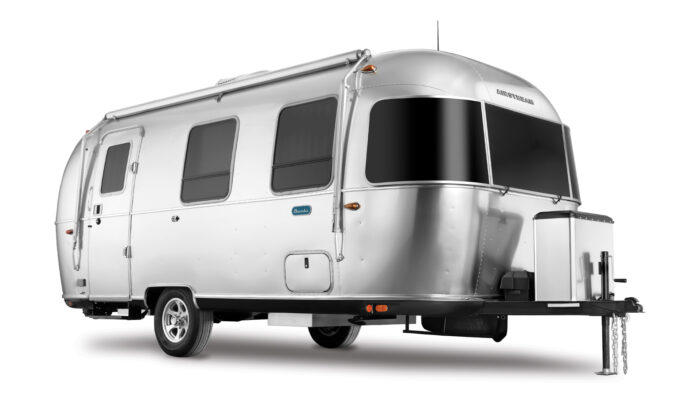
Recommended
9-year-old girl deadlifts 165 pounds — 3 times her body weight.

Matthew McConaughey on why he feels so connected to Marfa, Texas

Terrifying moment plane skids off runway

Joe Rogan blasts ‘The View’ over co-hosts feud with author Coleman Hughes: ‘Rabies-infested henhouse’

Wild video shows destruction caused by Taiwan’s 7.4 magnitude earthquake

The bright side of the California storms? Spectacular rainbows

Mediterranean diet can keep your mind sharp in old age

Fish hits weatherman in the face amid Norway’s worst storm in 30 years

Jerry Seinfeld berated by anti-Israel protesters outside NYC event

Video: Flight attendant busts passengers who brought their own booze

Mom, 72, sees the ocean for the first time in emotional video

IMAGES
VIDEO
COMMENTS
On an average a 16 feet length travel trailer will have a unloaded weight of around 2200 lbs to around 3400 lbs. A 30 feet travel trailer can weigh around 7000 lbs to 7800 lbs. This may however, be not true for all makes and brands, it will always vary. But, on an average you will find the numbers to be very close.
The average weight of most recreational travel trailers is about 5,000 pound s, depending on size. What you'll want to remember about this equation is that this number refers only to the "dry weight" of the unit. This means that the weight is measured when the tanks are empty and the unit contains no gear or other incidentals.
Travel trailer is dry weight of 6440. We dont carry water in tank. Just hubby and I add 400-500 lbs to over estimate. That leaves a little less than 1000 lbs of extra weight. That's hoping I'm using correct term of dry weight but that's the number we were told to use when deciding a proper weight for our vehicle to pull. Reply
1,545 Lbs (Unloaded Vehicle Weight) - 13 Feet - 2019 10RK Hummingbird Trailer. 2,860 Lbs (Batteries and LPs Included) - 16 Feet - 2018 Sport 16RB Trailer. 2,980 Lbs (Unloaded Vehicle Weight) - 19 Feet 10 Inches - 2019 17RK Hummingbird Trailer. 3321 Lbs - (Shipped Weight) - 21 Feet 5 Inches - Keystone 175 LHS Single Axle Trailer.
Average Camper Weight. We have searched the top 15 examples of popular travel trailers and found that on average, travel trailers weigh 5,215 pounds and weigh 191.43 pounds per foot of length. Different factors can cause these varying weights, but most trailers quality on this list are similar. Make/Model. Length.
Before the travel trailer is ready to travel on the road, this is the basic structural weight. The typical dry weight of a travel trailer ranges from approximately 1,000 to 9,000 pounds, but as a rough guide, the average camper container's dry weight is around 5,200 pounds. Towed units, as contrasted to self-driving modules, will be lighter ...
A smaller travel trailer - about 22 feet long or less - has an average weight of about 2,800 pounds. The unloaded weight range is typically between 1,200 and 3,900 pounds. The gross vehicle weight rating of small travel trailers varies from 1,900 pounds up to 4,500 pounds.
An example of a vintage travel trailer weight is the 19645 Safeway. IT weights partially loaded 2,320 pounds. This is a 13-foot cabin travel trailer. You can expect a range of 150-200 pounds per foot length of the cabin only. How much does a 16 foot travel trailer weight?
The average weight of your travel trailer will vary depending on the type of trailer you have and how long it is. Larger and longer campers tend to be heavier, while teardrop and pop-up campers are on the lighter end of the scale. Most campers have an average dry (unloaded) weight of 2,550 to 6,600 pounds, and an average GVWR of 3,200 to 8,400 ...
Exterior Length: 24 feet. Unladen Vehicle Weight: 4,651 lbs. Cargo Carrying Capacity: 1,978 lbs. Gross Vehicle Weight Rating: 6,629 lbs. Hitch Weight: 629 lbs. This travel trailer makes full use of every inch of space! From back to front, this model is packed with modern amenities and appliances.
The average travel trailer has a dry weight of around 5,200 lbs. These weights will vary greatly based on size of the trailer, ranging from 1,200 lbs (104 lbs per foot), up to around 9,000 lbs (230 lbs per foot) for larger trailers. Gear, tank levels and other equipment will add, on average, another 500-1000 lbs to the overall trailer weight.
Here's a unique addition to our list of the best lightweight travel trailers of 2022: the ultralight, 15-foot, all fiberglass Trillium Heritage Bunk 4500 camper from L'air Camper Company in Ontario, Canada. The L'air Trillium Heritage is an ultra-lightweight travel trailer that can be easily towed by many smaller SUVs and crossovers.
The average RV weight often depends on the class. For instance, a camper's weight can be within the range of 16,000 to 30,000 pounds if it is a Class A motorhome. However, Class B travel trailer weight can be within the 6,000 to 11,000-lb range. Take note that these figures denote RV dry weights.
For a hitched travel trailer, tongue weight should be no less than 10% of the trailer weight, and for a fifth wheel, it should be no less than 20%. When you take your travel trailer/fifth wheel to the scales, you want to find these weights: Weight of tow vehicle and trailer together. Weight of the tow vehicle by itself.
Travel trailers, pop up campers and 5th wheels do not have the weight of an engine and therefore weigh much less than a motorhome RV. A trailer type of RV typically weighs anywhere from around 1,500 to 7,000 pounds dry. Travel trailers and pop-ups attach to a standard trailer hitch, and fifth-wheels attach to the bed of a truck.
Weighing Truck and Travel Trailer without weight distributing hitch hooked up; put the WDH bars into the bed of the truck. Weighing Truck Only; park the travel trailer in a truck parking spot, put the WDH bars with the travel trailer (locked inside) and come back around to just weigh the truck. You'll want to pull off of the scale between ...
The travel trailer material is the last factor that influences its weight. Some trailers are stick-built with corrugated aluminum siding for the exterior shell. This means of building trailers can add 900 pounds to the weight of the trailer. Fiberglass trailers feature an aluminum skeleton with a fiberglass shell. These trailers weigh less.
2024 Eagle Travel Trailers. Starting at $59,993. Sleeps up to 10. Length 33' 10" - 38' 9". Weight 7,855 - 9,870 lbs. Learn More » Browse Floorplans ».
The average weight of a small travel trailer is 3500 lbs, and the average weight of a large travel trailer is 6300 lbs. However, this is just the average, so there are travel trailers that weigh significantly more or less than that. A travel trailer might weigh anywhere between 1000 lbs, and 9000 lbs. Some even up to 10,000 lbs.
So to begin, let's take a look at the average weight of a small camper. Small travel trailers typically have a dry weight or unloaded weight ranging from 1,200 to 4,000 pounds, and a gross vehicle weight rating, ranging from 2,000 to 6,000 pounds. However, simply knowing the average dry weight and gross vehicle weight rating of small travel ...
The board must be at least 3-1/2 feet long for this trick to work. 3. Place The Bathroom Scale At One End And A Brick At The Other. Place the bathroom scale roughly 2 feet in either direction from the trailer tongue, and a block or brick about 1 foot from the trailer tongue in the opposite direction of the scale.
A 20-foot travel trailer will generally have a dry weight of between 2,500 and 4,000 pounds and a fully loaded weight of between 3,000 and 4,500 pounds. Depending on the make and model of the trailer and the amount of cargo loaded into the camper. If you're looking for a more detailed answer, though, keep reading.
Dry Weight: 2,650 pounds. Sleeping Capacity: Up to 2. Airstream's revitalized Basecamp 16 travel trailer is another excellent lightweight travel trailer under 3,000 pounds. Built for two, it's perfect for adventurous couples who need a cozy place to rest each evening.
Dozens of Venture RV trailers ranging from 3,000 to 9,000 pounds (base weight) are ideal for a half-ton pickup like the Ford F-150. Our favorite Venture RV line is the Sonic X, of which there are ...
Utility trailers can range in sizes from the 4' x 7' Utility Trailer and 5' x 8' Utility Trailer all the way to up our largest capacity open trailer the 6' x 12' Utility Trailer. Two models come equipped with ramps for ease of loading, the 5' x 9' Utility Trailer w/ Ramp and the 6' x 12' Utility Trailer w/ Ramp.
9-year-old girl deadlifts 165 pounds — 3 times her body weight. Nine-year-old Indian weightlifter Arshia Goswami proved that powerful things can come in small packages after she deadlifted a ...